

43 Creative writing exercises

A selection of fun creative writing exercises that can be completed solo, or with a group. Some are prompts to help inspire you to come up with story ideas, others focus on learning specific writing skills.
I run a Creative Writing Meetup for adults and teens in Montpellier or online every week. We start with a 5 to 20 minute exercise, followed by an hour and a half of silent writing, during which each participant focuses on their own project. Every exercise listed below has been run with the group and had any kinks ironed out. Where the exercises specify a number of people, if you have a larger group, simply split everyone up into smaller groups as appropriate.
The solo exercises are ideal to help stimulate your mind before working on a larger project, to overcome writer’s block, or as stand-alone prompts in their own right. If a solo exercise inspires you and you wish to use it with a larger group, give every member ten minutes to complete the exercise, then ask anyone who wishes to share their work to do so in groups of 3 or 4 afterwards.
Looking for something quick to fire your imagination? Check out these creative writing prompts for adults .
Writing Retreat in South France

A note on running exercises remotely
While you can enjoy the exercises solo, they are also designed for online writing groups using Zoom, WhatsApp, or Discord.
If you're running a group and follow a ' Shut Up and Write ' structure, I recommend connecting on WhatsApp (for example) first, doing the exercise together, sharing writing samples as needed. Next, write in silence for an hour and a half on your own projects, before reconnecting for a brief informal chat at the end. This works great with small remote groups and is a way to learn new techniques, gain online support, and have a productive session.
If you have a larger online group, it's worth looking into Zoom, as this has a feature called Breakout Rooms . Breakout Rooms let you split different writers into separate rooms, which is great for group activities. The free version of Zoom has a 40 minute limit, which can be restrictive, but Zoom Pro is well worth it if you're going to use it on a regular basis. In my experience, Zoom has a better connection than Facebook chat or WhatsApp.
A Letter From Your Character To You

Spend ten minutes writing a letter from a character in your novel to you , the author, explaining why you should write about them. This serves three purposes:
- As you write, it helps you get into the mindset of the character. Ask yourself how they would language this letter and what they would consider important.
- It's motivating to know that your character wants you to write about them.
- If your goal is to publish a complete work of fiction one day, whether it be a novel, a play or a movie script, you will want to contact an agent or publisher. This helps you practice in an easy, safe way.
If you're doing this exercise with a group of teens or adults, and some of the group haven't already started working on their masterpiece, they can instead choose any fictional novel they love. Ask participants to imagine that a character within the book wrote to the author in the first place to ask them to write their story. How did they plead their case?
The Opening Sentence

The opening sentence has to grab the reader's attention and make them want to keep reading. Many authors achieve this by starting with an action scene. In modern literature, it's best to avoid starting with someone waking up, or a description of the weather. In this exercise the task is to write an opening sentence either to a book you're currently writing, or simply for an imaginary piece of literature. Here are some of my favourite opening sentences to get you going:
It was a bright cold day in April, and the clocks were striking thirteen.
George Orwell , 1984
The Golem's life began in the hold of a steamship.
Helene Wecker , The Golem and the Djinni
All happy families are alike; each unhappy family is unhappy in its own way.
Leo Tolstoy , Anna Karenina
It wasn't a very likely place for disappearances, at least at first glance.
Diana Gabaldon , Outlander
You better not never tell nobody but God.
Alice Walker , The Color Purple
The cage was finished.
Gabriel Garcia Marquez , Balthazar’s Marvelous Afternoon
Imagine that you are living your life out of order: Lunch before breakfast, marriage before your first kiss.
Audrey Niffenegger , The Time Traveler's Wife
Far out in the uncharted backwaters of the unfashionable end of the western spiral arm of the Galaxy lies a small unregarded yellow sun.
Douglas Adams , The Hitchhiker's Guide to the Galaxy
There are a plethora of ways you can start a book, however two ways that help engage the reader immediately are:
- Set the scene in as few words as possible, so the reader immediately knows what's happening and wants to know what happens next. The scene must be original and create a vivid image in the reader's mind.
- Surprise the reader with an unusual event or usual point of view.
Spend 5 minutes working on your own opening sentence, then share it with the other participants.
Make your protagonist act!
Exercise for 2 writers, or can be done solo.

According to John Gardner:
"Failure to recognise that the central character must act, not simply be acted upon, is the single most common mistake in the fiction of beginners."
Spend 5 minutes writing a scene where the protagonist is passive in a conversation with one other character. It could be that the other character says something dramatic, and the protagonist just listens, or it could be anything else of your choice!
Once the 5 minutes is up, swap papers with another writer. If you're using Zoom, or working online, send it to each other in a private chat. Now the other person spends 8 minutes rewriting the scene to make the protagonist as active as possible. This might include:
Read both scenes together. Which makes you want to keep on reading?
If you're doing this as a solo writing exercise, simply complete both parts yourself.
- Showing the emotion this evokes.
- Getting them to disagree with the other character.
- Showing how they respond physically (whether it's as a physical manifestation of how they feel, or a dramatic gesture to make a point).
Overcoming writer's block
.webp)
Are you staring at a blank page or stuck for any story ideas? This exercise will help anyone who's experiencing writer's block with a particular piece of writing. If this isn't you, that's great, others will value your input!
If anyone has a particular scene they're stuck with (a pool of blood on the floor they have no explanation for, a reason why the rich lady just walked into a particular pub, etc.) then at the start of the exercise everyone briefly describes their scenes (if working online with a large group, typing it into the chat might be best). Everyone then chooses one scene to use as a writing prompt to write a short story for 10-15 minutes.
Afterwards, split into small groups if necessary, and read out how you completed someone else's writing prompt. As everyone listens to everyone else's ideas, this can be a wonderful source of inspiration and also improves your writing. As an alternative solo exercise, try free writing. With free writing, simply write as quickly as you can on the topic without editing or censoring yourself - just let your creative juices flow. If you're not sure what happens next, brainstorm options on the page, jot down story ideas, or just put, "I don't know what happens next." Keep going and ideas will come.
Writing Character Arcs

There are several different types of character arc in a novel, the 3 most common being:
For this exercise choose either a positive or negative character arc. Spend 8 minutes writing a scene from the start of a novel, then 8 minutes writing a scene towards the end of a novel showing how the character has developed between the two points. Don't worry about including how the character has changed, you can leave that to the imagination.
The point here is to capture the essence of a character, as they will be the same, but show their development.
- Positive - Where a character develops and grows during the novel. Perhaps they start unhappy or weak and end happy or powerful.
- Negative - Where a character gets worse during a novel. Perhaps they become ill or give in to evil tendencies as the novel progresses.
- Flat - In a flat character arc the character themself doesn't change much, however the world around them does. This could be overthrowing a great injustice, for example.
Sewing Seeds in Your Writing

In this exercise, we will look at how to sew seeds. No, not in your garden, but in your story. Seeds are the tiny hints and indicators that something is going on, which influence a reader's perceptions on an often unconscious level. They're important, as if you spring a surprise twist on your readers without any warning, it can seem unbelievable. Sew seeds that lead up to the event, so the twists and turns are still surprising, but make intuitive sense. Groups : Brainstorm major plot twists that might happen towards the end of the novel and share it in a Zoom chat, or on pieces of paper. Choose one twist each. Individuals : Choose one of the following plot twists: - Your friend is actually the secret son of the king. - Unreliable narrator - the narrator turns out to be villain. - The monster turns out to be the missing woman the narrator is seeking. - The man she is about to marry happens to already have a wife and three kids.
Write for ten minutes and give subtle hints as to what the plot twist is. This is an exercise in subtlety. Remember, when the twist occurs, it should still come as a surprise.

This is a fun writing activity for a small group. You’ve found a magic potion labelled ‘Cat Chat’ and when you drink it, you turn into whichever animal you’re thinking about; but there’s a problem, it also picks up on the brainwaves of other people near you!
Everyone writes down an animal in secret and then reveals it to the other writers. The spell will turn you into a creature that combines elements of all the animals. Each person then spends 5 minutes writing down what happens when they drink the potion.
After the 5 minutes is up, everyone shares their story with the other participants.
If you enjoy this exercise, then you may also want to check out our Fantasy and Sci-Fi writing prompts full of world building, magic, and character development prompts..

Joe Brainard wrote a novel called: I Remember It contains a collection of paragraphs all starting with “I remember”. This is the inspiration for this exercise, and if you’re stuck for what to write, is a great way to get the mental gears turning. Simply write “I remember” and continue with the first thing that pops into your head.
Spend 5 minutes writing a short collection of “I remember” stories.
Here are a couple of examples from Joe Brainard’s novel:
“I remember not understanding why people on the other side of the world didn't fall off.”
“I remember waking up somewhere once and there was a horse staring me in the face.”
Giving feedback to authors

If you're running a workshop for more experienced adult authors and have at least an hour, this is a good one to use. This is the longest exercise on this page, but I felt it important enough to include.
Give each author the option to bring a piece of their own work. This should be double spaced and a maximum of 3 pages long. If you're running a workshop where not everyone is likely to bring a manuscript, ask everyone who wants to bring one to print two copies each. If someone forgets but has a laptop with them, the reader can always use their laptop.
Print out a few copies and hand them around to everyone in the workshop of the guide on: 'How to give constructive feedback to writers'
Each author who brought a sample with them then gives them to one other person to review. They write their name on the manuscript in a certain colour pen, then add any comments to it before passing it to a second person who does the same (commenting on the comments if they agree or disagree).
Then allow 5 minutes for everyone to discuss the feedback they've received, ensuring they are giving constructive feedback.
The Five Senses

Painting by Giovanni Battista Manerius - The Five Senses
Choose a scene and write it for 5 minutes focusing on one sense, NOT sight. Choose between:
Hearing Taste Smell Touch
This can be internal as well as external (I heard my heartbeat thudding in my ears, or I smelt my own adrenaline).
After the 5 minutes stop and everyone reads it out loud to each other. Now write for another 5 minutes and continue the other person's story, but do NOT use sight OR the sense they used.
You can use any sense to communicate the essentials, just focus on creating emotions and conveying the story with the specific sense(s).
If you need some writing prompts, here are possible scenes that involve several senses:
- Climbing through an exotic jungle
- Having an argument that becomes a fight
- A cat's morning
- Talking to someone you're attracted to
Show don't tell
2 or 3 people

A lot of writing guides will advise you to, "Show, don't tell". What does this actually mean?
If you want to evoke an emotional reaction from your reader, showing them what is happening is a great way to do so. You can approach this in several ways:
Split up into pairs and each person writes down a short scene from a story where they "tell" it. After this, pass the description of the scene to your partner and they then have 5 minutes to rewrite it to "show" what happened. If there are an odd number of participants, make one group of three, with each person passing their scene clockwise, so everyone has a new scene to show. After the 5 minutes, for small groups everyone reads their new description to everyone else, or for large groups, each person just reads their new scene to their partner.
- Avoid internal dialogue (thinking), instead have your protagonist interact with other people, or have a physical reaction to something that shows how s/he feels. Does their heart beat faster? Do they notice the smell of their own adrenaline? Do they step backwards, or lean forwards?
- Instead of using an adjective like creepy, e.g. "Mary entered the creepy house", show why the house is creepy through description and in the way the protagonist responds - "The light streamed through the filthy skylight, highlighting the decomposing body of a rat resting on top of it. As Mary stepped inside, she felt a gust of freezing air brush past her. She turned, but there was nothing there..."
World building

World building is the art of conveying the magic of living in a different world, whether it's a spaceship, a medieval castle, a boat, or simply someone's living room. To master world building, it's not necessary to know every intricate detail, rather to convey the experience of what it would be like to live there.
Choose one of the above images as a prompt and spend 10 minutes writing a scene from the perspective of someone who is seeing it for the first time. Now, move your character six months forward and imagine they've spent the last six months living or working there. Write another scene (perhaps with an additional character) using the image as a background, with the events of the scene as the main action.
Click the above image for a close-up.
Gossiping about a character as if they're a friend.

Judy Blume says that she tells her family about her characters as if they’re real people.
Chris Claremont said, "For me, writing the 'X-Men' was easy - is easy. I know these people, they're my friends."
Today’s exercise has 2 parts. First, spend 5 minutes jotting down some facts about a character you’ve invented that might come up if you were telling your friends about them. Either choose a character in something you’ve already written, or invent one from scratch now.
Answer the questions:
What are they up to? How are they? What would you say if you were gossiping about them?
Then split up into groups of 4 to 6 writers. 2 volunteers from each group then role-play talking about their character as if they were a friend (perhaps another character in the story). The other participants will role-play a group of friends gossiping about the character behind their back and ask questions. If you don’t know the answer, invent it!
Degrees of Emotion Game

This is based on an acting game, to help actors understand how to perform with different degrees of emotion.
Ask everyone to write the following 4 emotions:
For groups of 5 or less, write down numbers starting with 1 and going up until everyone has a number, then give them out in order. For groups of 6 or more, divide groups into 3's, 4's or 5's.
Each person has to write a scene where the protagonist is alone and is only allowed to say a single word, e.g. "Banana". The writer with number 1 should write the scene with a very low level of the emotion (e.g. happiness), number 2 increases the intensity a bit and the highest number writes a scene with the most intense emotion you can possibly imagine.
Once each writer has written about happiness, rotate the numbers one or two spaces, then move onto anger, then fear, then sadness.
It can help to give everyone numbers showing the intensity of the emotions to write about at the start of the exercise, in which case you may wish to print either the Word or PDF file, then use the ones corresponding to 3, 4 or 5 writers.

Everyone shares their scene with the other course participants.
Three birds, one line

The first paragraph of a surprising number of best-selling novels serves multiple purposes. These are to:
- Establish a goal
- Set the scene
- Develop a character
Nearly every chapter in a novel also serves all three purposes. Instead of establishing a goal though, the protagonist either moves towards it, or encounters an obstacle that hinders them from achieving it.
Some books manage to meet all three purposes with their opening lines, for example:
Mr and Mrs Dursley, of number four, Privet Drive, were proud to say that they were perfectly normal, thank you very much.
J.K. Rowling , Harry Potter and the Philosopher's Stone
A little more than one hundred days into the fortieth year of her confinement, Dajeil Gelian was visited in her lonely tower overlooking the sea by an avatar of the great ship that was her home.
Iain M. Banks , Excession
"We should start back," Gared urged as the woods began to grow dark around them.
George R.R. Martin , A Game of Thrones
For this exercise write a sentence or short paragraph that serves all three purposes. If you're already writing a novel, then see if you can do this for the first line in a chapter. If not, choose any combination from the following table:
| Escape | Penthouse suite | Reckless |
| Succeed in love | Castle | Cowardly |
| Survive | Graveyard | Greedy |
Blind Date on Valentine's Day (Exercise for Adults)

In pairs one writer spends a minute or two describing a character they're writing about, or alternatively they can describe a celebrity or someone from a work of fiction. The next writer then describes their character.
The story is that these 2 characters (or in my case, person and alien, as I'm writing a sci-fi) have accidentally ended up on a blind date with each other. Perhaps the waiter seated them in the wrong location, perhaps it's an actual blind date, or perhaps they met in some other fashion the writers can determine.
Now spend 10 minutes discussing what happens next!
A Success (Works best for online groups)

This exercise works best for online groups, via Zoom, for example. The instructions to give are:
"In a few words describe a success in your life and what it felt like to achieve it. It can be a small victory or a large one."
Share a personal example of your own (mine was watching my homeschooled sons sing in an opera together).
"Once you have one (small or large), write it in the chat.
The writing exercise is then to choose someone else's victory to write about for 10 minutes, as if it was the end of your own book.
If you want to write for longer, imagine how that book would start. Write the first part of the book with the ending in mind."
This is great for reminding people of a success in their lives, and also helps everyone connect and discover something about each other.
Your dream holiday

You’re going on a dream holiday together, but always disagree with each other. To avoid conflict, rather than discuss what you want to do, you’ve decided that each of you will choose a different aspect of the holiday as follows:
- Choose where you’ll be going – your favourite holiday destination.
- Choose what your main fun activity will be on the holiday.
- Decide what mode of travel you’ll use to get there.
- If there’s a 4 th person, choose what you’ll eat on the holiday and what you’ll be wearing.
Decide who gets to choose what at random. Each of you then writes down your dream holiday destination/activity/travel/food & clothes in secret. Next spend 5 minutes discussing your dream holiday and add any other details you’d like to include, particularly if you’re passionate about doing something in real life.
Finally, everyone spends another 5 minutes writing down a description of the holiday, then shares it with the others.

A haiku is a traditional Japanese form of non-rhyming poetry whose short form makes it ideal for a simple writing exercise.
They are traditionally structured in 3 lines, where the first line is 5 syllables, the second line is 7 syllables, and the third line is 5 syllables again. Haiku tend to focus on themes of nature and deep concepts that can be expressed simply.
A couple of examples:
A summer river being crossed how pleasing with sandals in my hands! Yosa Buson , a haiku master poet from the 18 th Century.
And one of mine:
When night-time arrives Stars come out, breaking the dark You can see the most
Martin Woods
Spend up to 10 minutes writing a haiku. If you get stuck with the 5-7-5 syllable rule, then don’t worry, the overall concept is more important!
See How to write a haiku for more details and examples.

Unlike a haiku, which is profound and sombre, a limerick is a light-hearted, fun rhyming verse.
Here are a couple of examples:
A wonderful bird is the pelican. His bill can hold more than his beli-can He can take in his beak Food enough for a week But I'm damned if I see how the heli-can.
Dixon Lanier Merritt, 1910
There was a young lady named Bright, Whose speed was far faster than light; She started one day In a relative way, And returned on the previous night.
Arthur Henry Reginald Buller in Punch, 1923
The 1 st , 2 nd and 5 th line all rhyme, as do the 3 rd and 4 th line. The overall number of syllables isn’t important, but the 3 rd and 4 th lines should be shorter than the others.
Typically, the 1 st line introduces the character, often with “There was”, or “There once was”. The rest of the verse tells their story.
Spend 10 minutes writing a limerick.
Time Travel - Child, Adult, Senior

Imagine that your future self as an old man/woman travels back in time to meet you, the adult you are today. Alternatively, you as a child travels forward in time to meet yourself as an adult. Or perhaps both happen, so the child you, adult you, and senior you are all together at the same time. In story form write down what happens next.
Participants then share their story with other writers either in small groups, or to the whole group.
Focus on faces
Solo exercise.

One challenge writers face is describing a character. A common mistake is to focus too much on the physical features, e.g. "She had brown eyes, curly brown hair and was five foot six inches tall."
The problem with this is it doesn't reveal anything about the character's personality, or the relationship between your protagonist and the character. Your reader is therefore likely to quickly forget what someone looks like. When describing characters, it's therefore best to:
- Animate them - it's rare that someone's sitting for a portrait when your protagonist first meets them and whether they're talking or walking, it's likely that they're moving in some way.
- Use metaphors or similes - comparing physical features to emotionally charged items conjures both an image and a sense of who someone is.
- Involve your protagonist - if your protagonist is interacting with a character, make it personal. How does your protagonist view this person? Incorporate the description as part of the description.
- Only give information your protagonist knows - they may know if someone is an adult, or a teenager, but they won't know that someone is 37 years old, for example.
Here are three examples of character descriptions that leave no doubt how the protagonist feels.
“If girls could spit venom, it'd be through their eyes.” S.D. Lawendowski, Snapped
"And Ronan was everything that was left: molten eyes and a smile made for war." Maggie Stiefvater, The Dream Thieves
"His mouth was such a post office of a mouth that he had a mechanical appearance of smiling." Charles Dickens
Spend 5 minutes writing a character introduction that is animated, uses metaphors or similes and involves your protagonist.
If working with a group, then form small groups of 3 or 4 and share your description with the rest of the group.
Onomatopeai, rhyme and alliteration
.webp)
Today's session is all about sound.
Several authors recommend reading your writing out loud after you've written it to be sure it sounds natural. Philip Pullman even goes as far as to say:
"When I’m writing, I’m more conscious of the sound, actually, than the meaning. I know what the rhythm of the sentence is going to be before I know what the words are going to be in it."
For today's exercise, choose the name of a song and write for 10 minutes as if that's the title for a short story. Focus on how your writing sounds and aim to include at least one onomatopoeia, rhyme or alliteration. At the end of the 10 minutes, read it out loud to yourself, or to the group.
Alliterations
An alliteration example from Samuel Taylor Coleridge’s “The Rime of the Ancient Mariner”
The fair breeze blew, the white foam flew, The furrow followed free; We were the first that ever burst Into that silent sea.
Onomatopoeias
Buzz, woof, quack, baa, crash, purr, beep, belch,...
The alphabet story - creating a story as a group

This is a novel way to write a story as a group, one word at a time. The first person starts the story that begins with any word starting with “A”, the next person continues the story with a word starting with “B”, and so on.
Keep going round until you have completed the alphabet. Ideally it will all be one sentence, but if you get stuck, start a new sentence. Don’t worry if it doesn’t make complete sense!
It can be tricky to remember the alphabet when under pressure, so you may wish to print it out a couple of times, so the storytellers can see it if they need to, this is particularly helpful if you have dyslexics in the group.
A B C D E F G H I J K L M N O P Q R S T U V W X Y Z
Here’s an example of an alphabet story:
A Band Can Dance Each Friday, Ghostly Hauntings In Jail Kill Lucky Men, Nobody Or Perhaps Quiet Rats, Still That Unifies Villains Who X-Ray Your Zebras.
As I mentioned, it doesn’t need to make sense!
A question or two
Small or large groups

The standard format in our group is a short writing exercise followed by an hour and a half of silent writing on our projects.
At one point I felt like we'd done a lot of small group exercises, and wanted to gain an insight into what everyone was working on, so we did the following exercise instead:
Go round the table and ask everyone to briefly talk about their writing. Each person then asks one or two yes/no questions.
Everyone responds either by raising their hand for 'yes' or shaking their heads for 'no'. You can also leap up and down to indicate a very strong 'yes'.
Questions can be about anything, and you can use them either to help guide your writing or to help find other people in the group who have similar interests.
Here are some random examples you might ask:
- I want to write a romance novel and am considering setting it in Paris, a traditional romantic setting, or Liverpool which is a less obvious setting. Who thinks Liverpool would be best?
- I need to know more about the life of a farmer. Has anyone got farming experience who I can interview in exchange for a drink?
- My character gets fired and that night goes back to his office and steals 35 computers. Does that sound realistic as the premise of a story?
This works best when you give participants some advance notice, so they have time to think of a question.
Murder Mystery Game
Groups of 3 or 4

This exercise takes 20-30 minutes and allows participants to create a murder mystery outline together.
Phase 1 (3 minutes)
- Split into groups of 3 or 4
- Decide as a group where the murder occurs (e.g. the opera house, a bar, a casino)
- Decide one person who will write the details of the victim and the murder itself. Everyone else writes the details of one suspect each.
- The ‘victim author’ then invents a few extra details about the scene of the crime, who the victim was (a teenage punk, an adult opera singer, etc.) and the murder weapon and summarises this to the others.
Phase 2 (10 minutes)
Each person then writes a police report as if they are either describing the scene of the crime, or recording the notes from their interview with a single suspect:
Write the following:
- 1 line description of the victim.
- When they were last seen by a group of witnesses (and what they were doing).
- How the murder occurred in more detail based on the evidence available.
Write the following (from the perspective of the investigator):
- 1 line description of the suspect
- What they said during the interview (including what they claim to have doing when the murder occurs).
- A possible motivation (as determined by the police from other witnesses).
Phase 3 (5 minutes)
- Each person reads out their police reports to the other members of their small group
- As a group, decide who the murderer was and what actually happened
See more ideas on creating murder mystery party games
The obscure movie exercise

Pick a famous movie and spend 5 minutes writing a scene from it from an unusual perspective. Your aim is to achieve a balance between being too obscure and making it too obvious. Feel free to add internal dialogue.
At the end of the 5 minutes, everyone reads their movie scene to the others and all the other participants see if they can guess what the movie is.
How to hint at romantic feelings

Write a scene with two people in a group, where you hint that one is romantically interested in the other, but the feelings aren’t reciprocated.
The goal of this exercise is to practice subtlety. Imagine you are setting a scene for the future where the characters feelings will become more important. Choose a situation like a work conference, meeting with a group of friends, etc. How do you indicate how the characters feel without them saying it in words?
Some tips for hinting at romantic feelings:
- Make the characters nervous and shy.
- Your protagonist leans forward.
- Asks deeper questions and listens intently.
- Finds ways to be close together.
- Mirrors their gestures.
- Gives lots of compliments.
- Makes eye contact, then looks away.
- Other people seem invisible to your protagonist.
A novel idea

Take it in turns to tell everyone else about a current project you’re working on (a book, screenplay, short story, etc.)
The other writers then brainstorm ideas for related stories you could write, or directions your project could take. There are no right or wrong suggestions and the intention is to focus on big concepts, not little details.
This whole exercise takes around 15 minutes.
Creative writing prompts
Exercise for groups of 3-5

If you're in larger group, split up into groups of 3 or 4 people.
Everyone writes the first line of a story in the Zoom chat, or on paper. Other people can then choose this line as a writing prompt.
For this exercise:
- Say who the protagonist is.
- Reveal their motivation.
- Introduce any other characters
Once everyone's written a prompt, each author chooses a prompt (preferably someone eles's, but it can be your own if you feel really inspired by it.) Then write for 10 minutes using this prompt. See if you can reveal who the protagonist is, what their motivation is (it can be a small motivation for a particular scene, it doesn't have to be a huge life goal), and introduce at least one new character.
Take turns reading out your stories to each other.
- Write in the first person.
- Have the protagonist interacting with an object or something in nature.
- The challenge is to create intrigue that makes the reader want to know more with just a single line.
Creative story cards / dice

Cut up a piece of paper and write one word on each of the pieces of paper, as follows:
| Robot | Happy | Whirlwind | Angry |
Give each participant a couple of pieces of paper at random. The first person says the first sentence of a story and they must use their first word as part of that sentence. The second person then continues the story and must include their word in it, and so on. Go round the group twice to complete the story.
You can also do this creative writing exercise with story dice, your own choice of words, or by asking participants to write random words down themselves, then shuffling all the cards together.
Alternative Christmas Story

Every Christmas adults tell kids stories about Santa Claus. In this exercise you write a Christmas story from an alternative dimension.
What if every Christmas Santa didn't fly around the world delivering presents on his sleigh pulled by reindeer? What if gnomes or aliens delivered the presents? Or perhaps it was the gnomes who are trying to emulate the humans? Or some other Christmas tradition entirely that we humans have never heard of!
Group writing exercise
If you're working with a group, give everyone a couple of minutes to write two possible themes for the new Christmas story. Each theme should be 5 words or less.
Shuffle the paper and distribute them at random. If you're working online, everyone types the themes into the Zoom or group chat. Each writer then spends 10 minutes writing a short story for children based on one of the two themes, or their own theme if they really want to.
If working alone, choose your own theme and spend 15 minutes writing a short story on it. See if you can create the magic of Christmas from another world!
Murder Mystery Mind Map

In a murder mystery story or courtroom drama, there's often conflicting information and lots of links between characters. A mind map is an ideal way to illustrate how everything ties together.
Split into groups of 3 or 4 people each and place a blank piece of A3 paper (double the size of A4) in the middle of each group. Discuss between you who the victim is and write their name in the middle of the piece of paper. Then brainstorm information about the murder, for example:
Feel free to expand out from any of these, e.g. to include more information on the different characters involved.
The idea is that everyone writes at the same time! Obviously, you can discuss ideas, but anyone can dive in and write their ideas on the mind map.
- Who was the victim? (job, appearance, hobbies, etc.)
- Who did the victim know?
- What were their possible motivations?
- What was the murder weapon?
- What locations are significant to the plot?
New Year’s resolutions for a fictional character

If you’re writing a piece of fiction, ask yourself how your protagonist would react to an everyday situation. This can help you to gain a deeper insight into who they are.
One way to do this is to imagine what their New Year’s resolutions would be.
If completing this exercise with a group, limit it to 3 to 5 resolutions per person. If some participants are historical fiction or non-fiction writers, they instead pick a celebrity and either write what their resolutions will be, or what their resolutions should be, their choice.
Verb Noun Fiction Exercise (Inspired by Stephen King)

Stephen King said, "I believe the road to hell is paved with adverbs, and I will shout it from the rooftops."
He also said, "Take any noun, put it with any verb, and you have a sentence. It never fails. Rocks explode. Jane transmits. Mountains float. These are all perfect sentences. Many such thoughts make little rational sense, but even the stranger ones (Plums deify!) have a kind of poetic weight that’s nice."
In this fiction writing exercise, start by brainstorming (either individually or collectively) seven verbs on seven different pieces of paper. Put those aside for later. Now brainstorm seven nouns. Randomly match the nouns and verbs so you have seven pairs. Choose a pair and write a piece of fiction for ten minutes. Avoid using any adverbs.
It’s the end of the world

It’s the end of the world! For 5 minutes either:
If working as a team, then after the 5 minutes is up each writer reads their description out to the other participants.
- Describe how the world’s going to end, creating evocative images using similes or metaphors as you wish and tell the story from a global perspective, or
- Describe how you spend your final day before the world is destroyed. Combine emotion and action to engage the reader.
7 Editing Exercises
For use after your first draft

I’ve listened to a lot of masterclasses on writing by successful authors and they all say variants of your first draft won’t be good and that’s fine. Terry Pratchett and Neil Gaiman summarise it the best:
“The first draft is just you telling yourself the story.”
Terry Pratchett
“For me, it’s always been a process of trying to convince myself that what I’m doing in a first draft isn’t important. One way you get through the wall is by convincing yourself that it doesn’t matter. No one is ever going to see your first draft. Nobody cares about your first draft. And that’s the thing that you may be agonising over, but honestly, whatever you’re doing can be fixed… For now, just get the words out. Get the story down however you can get it down, then fix it.”
Neil Gaiman
Once you’ve written your first draft, it will need editing to develop the plot, enhance the characters, and improve each scene in a myriad of ways – small and large. These seven creative editing exercises are designed to help with this stage of the process.
The First Sentence
Read the first paragraph of the novel, in particular the first sentence. Does it launch the reader straight into the action? According to On Writing and Worldbuilding by Timothy Hickson, “The most persuasive opening lines are succinct, and not superfluous. To do this, it is often effective to limit it to a single central idea… This does not need to be the most important element, but it should be a central element that is interesting.” Ask yourself what element your opening sentence encapsulates and whether it’s the best one to capture your readers’ attention.
Consistency
Consistency is crucial in creative writing, whether it’s in relation to location, objects, or people.
It’s also crucial for personality, emotions and motivation.
Look at scenes where your protagonist makes an important decision. Are their motivations clear? Do any scenes force them to choose between two conflicting morals? If so, do you explore this? Do their emotions fit with what’s happened in previous scenes?
As you edit your manuscript, keep the characters’ personality, emotions and motivation in mind. If their behaviour is inconsistent, either edit it for consistency, or have someone comment on their strange behaviour or be surprised by it. Inconsistent behaviour can reveal that a character is keeping a secret, or is under stress, so characters don’t always need to be consistent. But when they’re not, there has to be a reason.
Show Don’t Tell One
This exercise is the first in The Emotional Craft of Fiction by Donald Maass. It’s a writing guide with a plethora of editing exercises designed to help you reenergize your writing by thinking of what your character is feeling, and giving you the tools to make your reader feel something.
- Select a moment in your story when your protagonist is moved, unsettled, or disturbed… Write down all the emotions inherent in this moment, both obvious and hidden.
- Next, considering what he is feeling, write down how your protagonist can act out. What is the biggest thing your protagonist can do? What would be explosive, out of bounds, or offensive? What would be symbolic? … Go sideways, underneath, or ahead. How can your protagonist show us a feeling we don’t expect to see?
- Finally, go back and delete all the emotions you wrote down at the beginning of this exercise. Let actions and spoken words do the work. Do they feel too big, dangerous, or over-the-top? Use them anyway. Others will tell you if you’ve gone too far, but more likely, you haven’t gone far enough.
Show Don’t Tell Two
Search for the following words in your book:
Whenever these words occur, ask yourself if you can demonstrate how your characters feel, rather than simply stating it. For each occasion, can you use physiological descriptors (a racing heart), actions (taking a step backwards) or dialogue to express what’s just happened instead? Will this enhance the scene and engage the reader more?
After The Action
Find a scene where your characters disagree – in particular a scene where your protagonist argues with friends or allies. What happens next?
It can be tempting to wrap up the action with a quick resolution. But what if a resentment lingers and mistrust builds? This creates a more interesting story arc and means a resolution can occur later, giving the character development a real dynamic.
Review how you resolve the action and see if you can stretch out the emotions for a more satisfying read.
Eliminating the Fluff
Ensure that the words used don’t detract from the enormity of the events your character is going through. Can you delete words like, “Quite”, “Little”, or “Rather”?
Of “Very” Florence King once wrote: “ 'Very' is the most useless word in the English language and can always come out. More than useless, it is treacherous because it invariably weakens what it is intended to strengthen .” Delete it, or replace the word after it with a stronger word, which makes “Very” redundant.
“That,” is another common word used in creative writing which can often be deleted. Read a sentence as is, then reread it as if you deleted, “That”. If the meaning is the same, delete it.
Chapter Endings
When talking about chapter endings, James Patterson said, “At the end, something has to propel you into the next chapter.”
Read how each of your chapters finish and ask yourself does it either:
- End on a cliff hanger? (R.L. Stine likes to finish every chapter in this method).
- End on a natural pause (for example, you’re changing point of view or location).
Review how you wrap up each of your chapters. Do you end at the best point in your story? Can you add anticipation to cliff hangers? Will you leave your readers wanting more?
How to run the writing exercises
The editing exercises are designed to be completed individually.
With the others, I've always run them as part of a creative writing group, where there's no teacher and we're all equal participants, therefore I keep any 'teaching' aspect to a minimum, preferring them to be prompts to generate ideas before everyone settles down to do the silent writing. We've recently gone online and if you run a group yourself, whether online or in person, you're welcome to use these exercises for free!
The times given are suggestions only and I normally get a feel for how everyone's doing when time's up and if it's obvious that everyone's still in the middle of a discussion, then I give them longer. Where one group's in the middle of a discussion, but everyone else has finished, I sometimes have a 'soft start' to the silent writing, and say, "We're about to start the hour and a half of silent writing now, but if you're in the middle of a discussion, feel free to finish it first".
This way everyone gets to complete the discussion, but no-one's waiting for ages. It's also important to emphasise that there's no wrong answers when being creative.
Still looking for more? Check out these creative writing prompts or our dedicated Sci-Fi and Fantasy creative writing prompts
If you've enjoyed these creative writing exercises, please share them on social media, or link to them from your blog.

Marketing Blog
- Real estate SEO case study
- Writing retreat in South France
- How Google detects and penalizes AI content
- 42 Sci-Fi and Fantasy Writing Prompts
- 26 Creative writing games for adults
- How to create your own Murder Mystery Party
- 13 Ideas for Murder Mystery Riddles
Indigoextra Ltd © 2006 - 2024
UK Tel: +44 (0) 208 1234 618 France Tel: +33 (0) 602 222 354
Testimonials - Terms & Privacy - Ethics - Contact

The best writing exercises bring out our latent creativity. Especially if you ever feel stuck or blocked, making creative writing exercises part of your daily writing practice can be a great way to both hone your skills and explore new frontiers in your writing. Whether you’re a poet, essayist, storyteller, or genre-bending author, these free writing exercises will jumpstart your creative juices and improve your writing abilities.
24 of the Best Free Writing Exercises to Try Out Today
The best creative writing exercises will push you out of your comfort zone and get you to experiment with words. Language is your sandbox, so let’s build some sand castles with these exercises and writing prompts.
Write With Limitations
The English language is huge, complicated, and — quite frankly — chaotic. Writing with self-imposed limitations can help you create novel and inventive pieces.
What does “limitations” mean in this context? Basically, force yourself not to use certain words, descriptions, or figures of speech. Some writing exercises using limitations include the following:
- Write without using adverbs or adjectives.
- Write without using the passive voice – no “being verbs” whatsoever. (Also called “E-Prime” writing.)
- Write a story without using a common letter – just like Ernest Vincent Wright did .
- Write a poem where each line has six words.
- Write without using any pronouns.
Among exercises to improve writing skills, writing with limitations has the clearest benefits. This practice challenges your brain to think about language productively. Additionally, these limitations force you to use unconventional language – which, in turn, makes you write with lucidity, avidity, and invention.
Freewriting & Stream of Consciousness
What do you do when the words just don’t come out? How can you write better if you can’t seem to write at all? One of the best poetry exercises, as well as writing exercises in general, is to start your day by freewriting.
Freewriting , also known as “stream of consciousness writing,” involves writing your thoughts down the moment they come. There’s no filtering what you write, and no controlling what you think: topicality, style, and continuity are wholly unnecessary in the freewriting process. While the idea of freewriting seems easy, it’s much harder than you think – examining your thoughts without controlling them takes a while to master, and the impulse to control what you write isn’t easy to tame. Try these exercises to master the skill:
- Do a timed freewrite. Start with five minutes.
- Freewrite until you fill up the entirety of something – an envelope, a receipt, a postcard, etc.
- Freewrite after meditating.
- Freewrite off of the first word of today’s newspaper.
Among daily writing exercises, freewriting is one of the best writing exercises. Poets can use freewritten material as inspiration for their poetry. Prose writers can also find inspiration for future stories from the depths of their consciousnesses. Start your writing day with freewriting, and watch your creativity blossom.
Copy What You Read
Plagiarism is still off the table; however, you can learn a lot by paying attention to how other people write. This is what we call “reading like a writer.”
Reading like a writer means paying attention to the craft elements that make an excellent piece of literature work. Good writing requires different writing styles, figurative language, story structures, and/or poetry forms, as well as key word choice.
When you notice these craft elements, you can go ahead and emulate them in your own work. As a fiction writer , you might be drawn to the way Haruki Murakami weaves folklore into his stories, and decide to write a story like that yourself. Or, as a poet, you might be inspired by Terrance Hayes’ Golden Shovel form — enough so that you write a Golden Shovel yourself.
- Read a favorite poem, and write your own poem in the same poetic form.
- Blackout poetry: take another poem, cross out words you don’t want to use, circle words you do, and write a poem based on the circled words.
- Copy a single sentence from a favorite novel, and write a short-short story with it.
Among free writing exercises, this is a great way to learn from the best. The best kinds of exercises to improve writing skills involve building upon the current canon of works — as Isaac Newton said, you achieve something great by “standing on the shoulders of giants.”
Write From Different Perspectives
The conventional advice given to writers is to “write what you know.” We couldn’t disagree with that statement more. The best creative works force both the writer and the reader to consider new perspectives and learn something new; writing from a new point-of-view makes for a great exercise in expanding your creative limits.
Try these ideas as daily writing exercises:
- Write a story with the same plot, but with two or more perspectives. For example, you could write a lover’s quarrel from two different view points.
- Write from the point-of-view of a famous historical figure.
- Write a story or poem from the perspective of an object: a statue, a doll, a roomba, etc.
- Write from the perspective of a person you dislike.
While playing with perspective makes for a great fiction writing exercise , poets and essayists can do this too. Patricia Smith’s poem “Skinhead,” for example, is a persona piece written from the perspective of a white nationalist, but the poem clearly condemns the speaker’s beliefs.
Thus, perspective writing also works as a poetry exercise and an essay writing practice exercise . If you’re stuck in your own head, try writing in someone else’s!
Write Metaphor Lists
All creative writers need figurative language. While metaphors, similes, and synecdoches are more prominent in poetry , prose writers need the power of metaphor to truly engross their reader. Among both exercises to improve writing skills and fun writing exercises for adults, writing metaphor lists is one of the best writing exercises out there.
A metaphor list is simple. On a notebook, create two columns. In one column, write down only concrete nouns. Things like a pillow, a tree, a cat, a cloud, and anything that can be perceived with one of the five senses.
In the other list, write down only abstract ideas. Things like love, hate, war, peace, justice, closure, and reconciliation — anything that is conceptual and cannot be directly perceived.
Now, choose a random noun and a random concept, and create a metaphor or simile with them. Delve into the metaphor and explain the comparison. For example, you might say “Love is like a pillow — it can comfort, or it can smother.”
Once you’ve mastered the metaphor list, you can try the following ideas to challenge yourself:
- Create a coherent poem out of your metaphor list.
- Turn your metaphor list into a short story.
- Try making lists with a different figurative language device, such as personification, pathetic fallacy, or metonymy.
Any free creative writing exercise that focuses on figurative language can aid your writing immensely, as it helps writers add insight and emotionality to their work. This is an especially great creative writing exercise for beginners as they learn the elements of style and language.
Daily Journaling
Of course, the best way to improve your creative writing skills is simply to write every day. Keeping a daily journal is a great way to exercise your writing mind. By sitting down with your personal observations and writing without an agenda or audience, a daily writing practice remains one of the best writing exercises , regardless of your genre or level of expertise.
Consider these ideas for your daily journal:
- Track your mood and emotions throughout the day. Write those emotions in metaphor — avoid commonplace adjectives and nouns.
- Write about your day from the second- or third-person.
- Journal your day in verse. Use stanzas, line breaks, and figurative language.
- Write about your day backwards.
- Write about your day using Freytag’s pyramid . Build up to a meaningful climax, even if nothing significant seemed to happen today.
Learn more about keeping a journal here:
How to Start Journaling: Practical Advice on How to Journal Daily
Writing Exercises: Have Fun with Them!
Many of these writing exercises might feel challenging at first—and that’s a good thing! You will unlock new ideas and writing strengths by struggling through these creative challenges. The main point is to have fun with them and use them to explore within your writing, without indulging too many monologues from your inner critic.
Are you looking for more exercises to improve your writing skills? Our instructors can offer prompts, illuminating lectures, one-to-one feedback, and more to help you improve your craft. Check out our upcoming creative writing courses , and let’s put these skills to practice.
Sean Glatch
Thank you for this. I’ve been stuck for months—more than that, actually, and you’d think that a pandemic stay-at-home would be the perfect time to do some writing. But no. I’m as stuck as ever. In fact, the only time I seem able to write consistently and well is when I’m taking one of your classes! I’m still saving my pennies, but these exercises will hopefully get me writing in the meantime. Thanks again!
Hi Kathy, I’m glad to hear some of these tips might spark your creativity 🙂 I feel the same way, I was hoping the stay-at-home order might spark some creativity, but we shouldn’t push ourselves too hard – especially in the midst of a crisis.
The best part about writing: all you have to do is try, and you’ve already succeeded. Good luck on your writing endeavors!
Bravo….!What a great piece! Honestly I learnt a lot here!
I picked interest in poetry just a week ago after reading a beautiful piece which captivated my mind into the world of writing. I’d love to write great poems but I don’t know anything about poetry, I need a coach, a motivator and an inspiration to be able to do this. This piece really helped me but I will appreciate some more tips and help from you or anyone else willing to help, I am really fervid about this.
Hi Anthony,
Thanks for your comment! I’m so excited for you to start your journey with poetry. We have more advice for poetry writing at the articles under this link: https://writers.com/category/poetry
Additionally, you might be interested in two of our upcoming poetry courses: Poetry Workshop and How to Craft a Poem .
If you have any questions, please feel free to email us at [email protected] . Many thanks, and happy writing!
[…] 24 Best Writing Exercises to Become a Better Writer | writers.com […]
Hi, kinsey there. Thanks for giving information. it is a very informative blog and i appreciate your effort to write a blog I am also a writer and i like these type of blogs everyone takes more knowledge to check out my essay writing website
As a writer, I often struggle to break free from the chains of writer’s block, but this blog has gifted me with a map of inspiration to navigate through those creative storms. It’s like being handed a box of enchanted writing exercises
Leave a Comment Cancel Reply
Save my name, email, and website in this browser for the next time I comment.
- Bookfox Academy (All Courses)
- Write Your Best Novel
- How to Write a Splendid Sentence
- Two Weeks to Your Best Children’s Book
- Revision Genius
- The Ultimate Guide to Writing Dialogue
- Your First Bestseller
- Master Your Writing Habits
- Writing Techniques to Transform Your Fiction
- Triangle Method of Character Development
- Children’s Book Editing
- Copy Editing
- Novel Editing
- Short Story Editing
- General Books
- Children’s Books
50 Fantastic Creative Writing Exercises
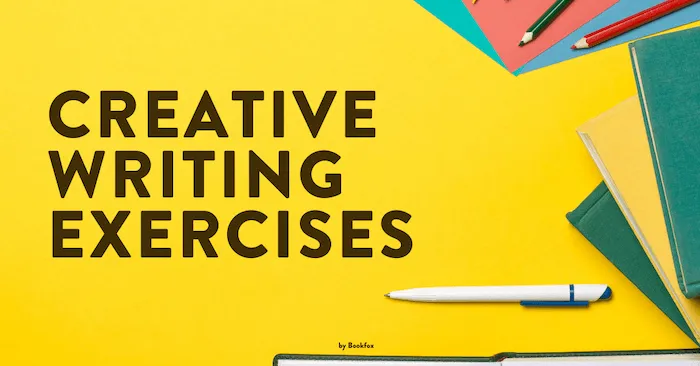
Good question.
Creative writing exercises are designed to teach a technique. They are highly specific, more specific than creative writing prompts, and much more specific than story generators.
Creative writing exercises for adults are not designed to lead the writer into crafting a full story, but are only designed to help them improve as a writer in a narrow, specific category of writing skills.
I’ve broken the exercises below into categories so you can choose what category of skill you’d like to practice. Can you guess which category in this list has the most prompts?
If you guessed characters, then you’re right. I think characters are the heart blood of every story, and that a majority of any writing prompts or writing exercises should focus on them.
But I also think any of these will help you create a narrative, and a plot, and help you generate all kinds of dialogue, whether for short stories or for novels. These writing exercises are pretty much guaranteed to improve your writing and eliminate writer’s block.
Also, if you’re a fledgling writer who needs help writing their novel, check out my comprehensive guide to novel writing.
Enjoy the five categories of writing exercises below, and happy writing!
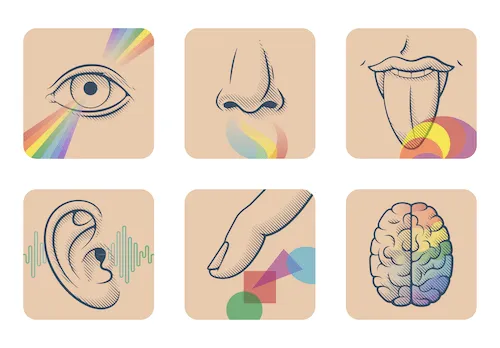
1. Think of the most deafening sound you can imagine. Describe it in great detail, and have your character hear it for the first time at the start of a story.
2. Have a man cooking for a woman on a third date, and have her describe the aromas in such loving and extended detail that she realizes that she’s in love with him.
3. Pick a line from one of your favorite songs, and identify the main emotion. Now write a character who is feeling that emotion and hears the song. Try to describe the type of music in such a beautiful way that you will make the reader yearn to hear the song as well.
4. Have a character dine at a blind restaurant, a restaurant in pitch blackness where all the servers are blind, and describe for a full paragraph how the tablecloth, their clothing, and the hand of their dining partner feels different in the darkness.
5. Select a dish representative of a national cuisine, and have a character describe it in such detail that the reader salivates and the personality of the character is revealed.

7. Describe two characters having a wordless conversation, communicating only through gestures. Try to see how long you can keep the conversation going without any words spoken, but end it with one of them saying a single word, and the other one repeating the same word.
8. In a public place from the last vacation you took, have two characters arguing, but make it clear by the end of the argument that they’re not arguing about what they’re really upset about.
9. Write a scene composed mostly of dialogue with a child talking to a stranger. Your mission is to show the child as heartbreakingly cute. At the same time, avoid sentimentality.
10. Have two character have a conversation with only a single word, creating emphasis and context so that the word communicates different things each time it is spoken. The prime example of this is in the television show “The Wire,” where Jimmy and Bunk investigate a crime scene repeating only a single expletive.
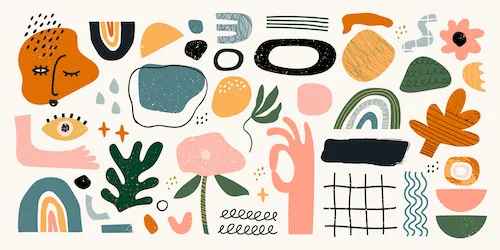
11. Pick an object that is ugly, and create a character who finds it very beautiful. Have the character describe the object in a way that convinces the reader of its beauty. Now write a second version where you convince the reader (through describing the object alone) that the character is mentally unstable.
12. Write down five emotions on slips of paper and slip them into a hat. Now go outside and find a tree. Draw one emotion from the hat, and try to describe that tree from the perspective of a character feeling that emotion. (Don’t mention the emotion in your writing — try to describe the tree so the reader could guess the emotion).
13. Describe a character’s bedroom in such a way that it tells us about a person’s greatest fears and hopes.
14. Root through your desk drawer until you find a strange object, an object that would probably not be in other people’s drawers. Have a character who is devastated to find this object, and tell the story of why this object devastates them.
15. Go to an art-based Pinterest page and find your favorite piece of art. Now imagine a living room inspired by that flavor of artwork, and show the room after a husband and wife have had the worst fight of their marriage.
16. Pick a simple object like a vase, a broom, or a light bulb, and write a scene that makes the reader cry when they see the object.
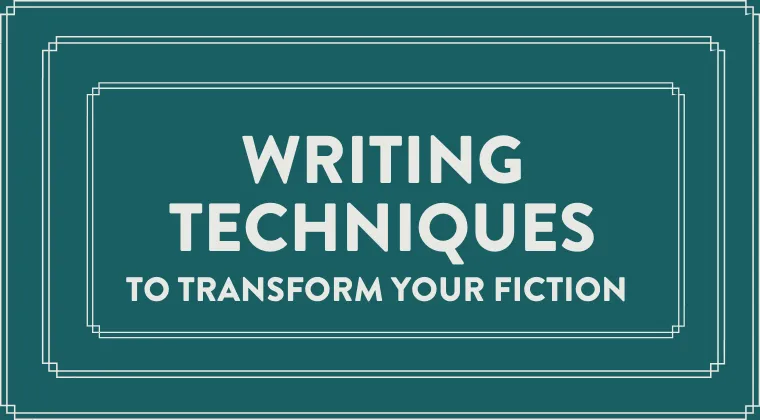
Ready to invest in your writing?
Sign up for my writing course “ Writing Techniques to Transform Your Fiction .”
- Learn the secret techniques used by great authors
- Practice writing exercises that will pump up your writing skills
Learn more by clicking the image or link above.

17. Make a list of the top five fears in your life. Write a character who is forced to confront one of those fears.
18. Write an entire page describing the exact emotions when you learned of a happy or calamitous event in your life. Now try to condense that page into a single searing sentence.
19. Think about a time in your life when you felt shame. Now write a character in a similar situation, trying to make it even more shameful.
20. Write a paragraph with a character struggle with two conflicting emotions simultaneously. For example, a character who learns of his father’s death and feels both satisfaction and pain.
21. Write a paragraph where a character starts in one emotional register, and through a process of thought, completely evolves into a different emotion.
Characters:

22. Create a minor character based upon someone you dislike. Now have your main character encounter them and feel sympathy and empathy for them despite their faults.
23. Have a kooky character tell a story inside a pre-established form: an instruction manual, traffic update, email exchange, weather report, text message.
24. Write about a character who does something they swore they would never do.
25. Have a character who has memorized something (the names of positions in the Kama Sutra, the entire book of Revelations) recite it while doing something completely at odds with what they’re reciting. For instance, bench pressing while reciting the emperors in a Chinese dynasty.
26. Write a paragraph where a character does a simple action, like turning on a light switch, and make the reader marvel at how strange and odd it truly is.
27. Have a couple fight while playing a board game. Have the fight be about something related to the board game: fighting about money, have them play monopoly. Fighting about politics, let them play chess.
28. Write about two characters angry at each other, but have both of them pretend the problems don’t exist. Instead, have them fight passive-aggressively, through small, snide comments.
29. Describe a character walking across an expanse field or lot and describe how he walks. The reader should perfectly understand his personality simply by the way you describe his walk.
30. Write a first-person POV of a character under the influence of alcohol or drugs, and try to make the prose as woozy and tipsy as the character.
31. Describe the first time that a character realizes he is not as smart as he thought.
32. Describe an hour in the life of a character who has recently lost their ability to do what they love most (a pianist who has severe arthritis; a runner who became a quadriplegic).
33. Write an argument where a husband or wife complains of a physical ailment, but their spouse refuses to believe it’s real.
34. Write a scene where a stranger stops your main character, saying that they know them, and insisting your main character is someone they are not. Describe exactly how this case of mistaken identity makes your character feel.
35. Describe a small personality trait about a person you love, and make the reader love them, too.
36. Write a personality-revealing scene with a character inside a public restroom. Do they press a thumb against the mirror to leave a subtle mark? Do they write a plea for help on the inside of the stall door? Do they brag about the size of what they’ve just dumped off?
37. Give your character an extremely unusual response to a national tragedy like a terrorist attack or natural disaster. Maybe have them be aware their response is unusual, and try to cloak it from others, or have them be completely unaware and display it without any self-consciousness.
38. Have one of your main characters come up with an idea for a comic book, and tell a close friend about the idea. What about this idea would surprise the friend, upsetting what he thought he knew about your main character? Also, what would the main character learn about himself from the comic book idea?
39. Think of an illness someone you love has suffered from. How does your character respond when someone close to them has this illness?
40. Have your main character invent an extremely offensive idea for a book, and show their personality faults through discussing it with others.
41. Have your character write down a list considering how to respond to their stalker.
42. Write a scene where a man hits on a woman, and although the woman acts repulsed and begs her friends to get him away from her, it becomes apparent that she likes the attention.
43. Write about a 20-something confronting his parents over their disapproval of his lifestyle.
44. Have your character write a funny to-do list about the steps to get a boyfriend or girlfriend.
45. Have a risk-adverse character stuck in a hostage situation with a risk-happy character.
46. For the next week, watch strangers carefully and take notes in your phone about any peculiar gestures or body language. Combine the three most interesting ones to describe a character as she goes grocery shopping.
47. Buy a package of the pills that expand into foam animals, and put a random one in a glass of warm water. Whatever it turns out to be, have that animal surprise your main character in a scene.
48. Have your character faced with a decision witness a rare, awe-inspiring event, and describe how it helps them make their decision.
49. Imagine if your character met for the first time his or her long-lost identical twin. What personality traits would they share and which ones would have changed because of their unique experiences?
50. If a character got burned by a hot pan, what type of strange reaction would they have that would reveal what they value most?
Once you’ve taken a stab at some of these exercises, I’d recommend you use them in your actual writing.
And for instruction on that, you need a guide to writing your novel .
That link will change your life and your novel. Click it now.
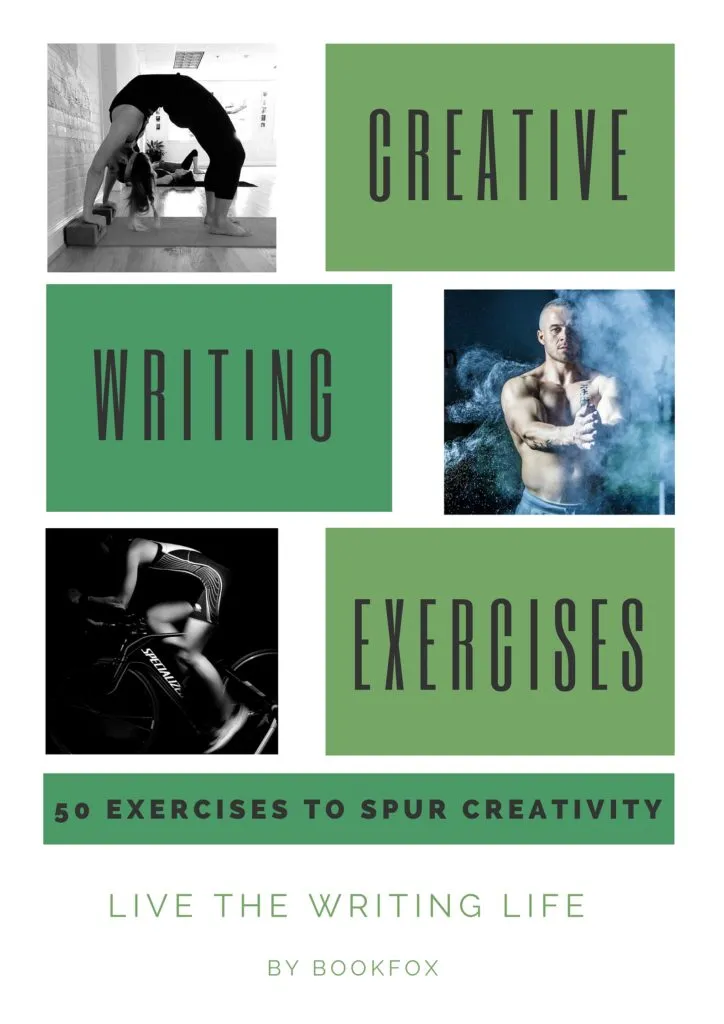
Related posts:
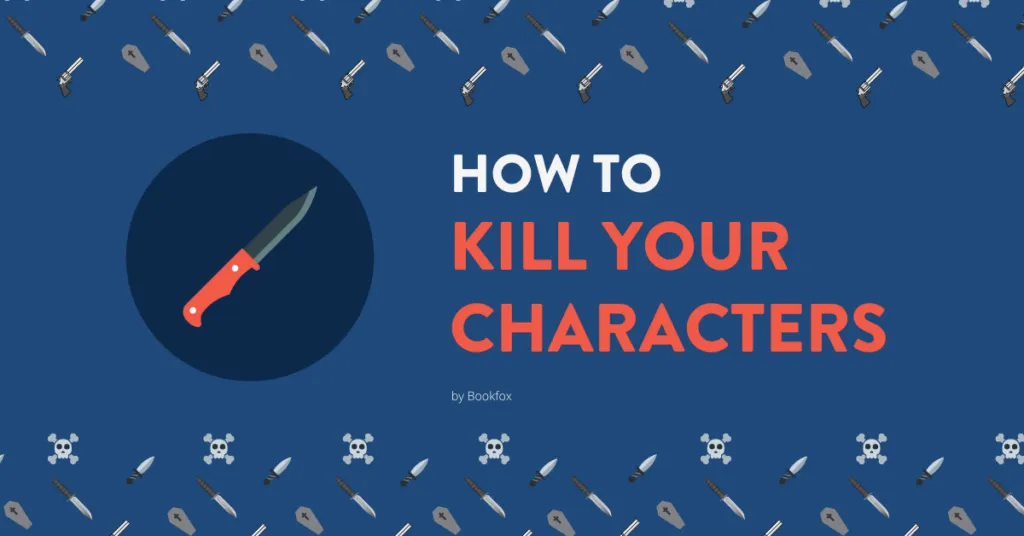
Leave a Reply Cancel reply
Your email address will not be published. Required fields are marked *
34 comments
John Fox, you have some excellent resources, and I thank you. I read your comments, then scrolled down to glance at the list of 50 exercises. The FIRST one, “loud noise’ is already in my head. My Hero is going to be side swiped in my Cozy. I was side swiped on a state highway here in Virginia a couple of weeks ago and, although the damage was minor, the sound of that big SUV “glancing” off my little car was SCARY!!! I once heard a fast-moving car REAR-END is stand-still car; that sound was something I’ll never forget. So, your exercise is very timely. THANK YOU!!!
This is a great list! Thanks!
You know what would be motivating? If we could turn these in to someone and get like a grade lol
I can really see the benefit of doing these writing exercises. (Versus using prompts) The purpose is so much clearer. Some I can imagine my response fairly easily. (Though the task of not jumping on the obvious might make it harder than I imagine at this point) Some however I would struggle with ( number 42 for example), where I have zero sympathy for the main character’s plight. Hhhmmmm. But maybe they are the very ones I should be tackling – to see if I can develop them in a way that explains their behaviour and so creates sympathy. Thank you. Much food for thought.
I’ve been thinking a lot about “how to master writing,” and this is the first time that I found an article that makes it clear the difference between prompts and exercises. I fully agree with you. These are bound to make you a better writer if you focus on doing a variation of them daily.
An excellent list – thank you very much. I run a small writing group and we’ll be trying some.
Yes, thank you. I too run a small writing group and you got me out of a slump for tomorrow’s group!
yes,thank you . It’s good for improve your writing skills.
- Pingback: Writing Exercises for Adults That Can Help You Write Better
What a lovely list! I am working on the final draft of my very first novel, and am constantly working at improving the final product. Your exercises are just what I need to kickstart my writing day. Thank you so very much.
Thank you very much When I turned50 I received my diploma from Children’s Institute in West Redding Ct I got my inspiration from being near water however now that I am in Oregon I have had a writing block thanks to your list my creative juices are flowing
I suppose I better have good punctuation, seeing this is about Writing. Thank you for this great list. I am the Chair of our small Writing group in Otorohanga and we start again last week of Feb. I have sent out a homework email, to write a A4 page of something exciting that has happened over the holiday break and they must read it out to the group with passion and excitement in their voices. That will get them out of their comfort zone!
A formidable yet inspiring list. Thank you very much for this. This is really very helpful. I am from India, and very new to writing and have started my first project, which I want to make it into a Novel. This has been very helpful and is very challenging too. Prompts look sissy when compared to this, frankly speaking. Thank you very much again.
Where can I get the answers for these?
There aren’t “answers.” You create responses to these exercises.
Thank you so much for the detailed suggestions focusing on HOW to put the WHAT into practice; really helpful & inspiring.
Just started rough drafting a story I’ve always wanted to write. Do you have any advice for someone writing their first real story? I’m having trouble starting it; I just want it to be perfect.
I consider this very helpful. Just started my journey as a creative writer, and will be coming back to this page to aid my daily writing goal.
I have always loved writing exercises and these are perfect practice for my competition. I have tried lots of different things that other websites have told me to try, but this by far is the most descriptive and helpful site that i have seen so far.
This is really a creative blog. An expert writer is an amateur who didn’t stop. I trust myself that a decent writer doesn’t actually should be advised anything but to keep at it. Keep it up!
I’ve always enjoyed writing from a little girl. Since I’ve been taking it a bit more seriously as does everybody else it seems; I’ve lost the fun and sponteneity. Until now…..this is a marvelous blog to get back the basic joy and freedom in writing. Or should that be of?:) These exercises are perfect to get the creative juices flowing again…..thank you:)
These are interesting exercises for writing.
These are fantastic! I started reading a really awesome book on creative writing but it just didn’t get any good or easy to follow exercises. So I found your site and having been having a lot of fun with these. Exactly what I was looking for, thank you!
creative and inspiring, thank you
I always wanted to have an exercise where a friend and I each wrote a random sentence and sent it to each other to write a short story from that beginning sentence, then exchange the stories for reading and/or critique. Maybe both writers start with the same sentence and see how different the stories turn out.
Thanks for these exercises. Some are really challenging. To truly tackle them I’m having to spend as long beforehand thinking “how the HECK am I going to do this?” as I do with ink on paper. Would be a great resource if other authors submitted their replies and thoughts about how they went about each exercise.
Start the conversation: submit one of yours.
I think I can use these to inspire my students.
Hi there. Thank you for posting this list- it’s great! Can I ask you to consider removing number 42 or perhaps changing it somewhat? I teach sex ed and every year am shocked by how many young people don’t understand issues around consent. Stories about woman who ‘say no but really mean yes’ are deeply unhelpful. Really appreciate your post but felt I had to ask. Thanks.
What’s wrong with the number 42?
It promulgates the belief that when a woman says no, she doesn’t mean it, potentially resulting in sexual assault.
I just make this list a part of my teaching in Creative Writing Classes. Very good list of ideas!
Thank you so much for posting this! I have used it to create a creative playwriting activity for my high school creative writing class–so much good stuff here for me to pick through and select for my kiddos that will allow them to shine and improve their knowledge of writing as a craft!
These exercises are amazing! Thank you so much for sharing 🙂
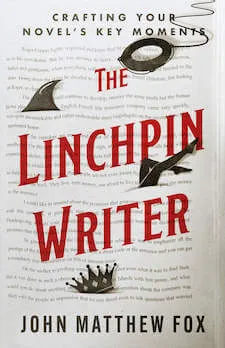
Every writer NEEDS this book.
It’s a guide to writing the pivotal moments of your novel.
Whether writing your book or revising it, this will be the most helpful book you’ll ever buy.
55 Creative Writing Activities and Exercises

Have you ever heard these questions or statements from your students?
- I don’t know where to begin.
- How can I make my story interesting?
- I’m just not creative.
- What should my story be about?
If so, you won’t want to miss these creative writing activities.
What Are Creative Writing Activities?
Activities that teach creative writing serve as drills to exercise your student’s writing muscle. When used effectively, they help reluctant writers get past that intimidating blank paper and encourage the words to flow.
When I think of creative writing exercises , writing prompts immediately come to mind. And, yes, writing from a prompt is certainly an example of a creative writing activity (a highly effective one).
However, writing prompts are only one way to teach creative writing. Other types of activities include games, collaboration with others, sensory activities, and comic strip creation to name a few.
Unlike writing assignments, creative writing activities aren’t necessarily meant to create a perfectly polished finished project.
Instead, they serve as more of a warmup and imagination boost.
Picture-based writing exercises are especially fun. You can download one for free below!

get this picture prompt printable for free!
How to use creative writing exercises effectively.
When teaching creative writing , the most effective exercises inspire and engage the student.
Remember that worn-out prompt your teacher probably hauled out every year?
“What I Did This Summer…”
Cue the groaning.
Instead of presenting your student with lackluster topics like that one, let’s talk about ways to engage and excite them.
For Kids or Beginners
Early writers tend to possess misconceptions about writing. Many picture sitting down for hours straight, polishing a story from beginning to end.
Even for experienced writers, this is next-to-impossible to do. It’s preconceived ideas like these that overwhelm and discourage students before they’ve even started.
Instead of assigning an essay to complete, start with simple, short writing exercises for elementary students such as:
- Creating comic strips using a template
- Talking out loud about a recent dream
- Writing a poem using rhyming words you provide
- Creating an acrostic from a special word
Creative writing exercises don’t have to end in a finished piece of work. If the exercise encouraged creative thinking and helped the student put pen to paper, it’s done its job.
For Middle School
Creative writing activities for middle school can be a little more inventive. They now have the fundamental reading and writing skills to wield their words properly.
Here are some ideas for middle school writing exercises you can try at home:
- Creating Mad Lib-style stories by changing out nouns, verbs, and adjectives in their favorite tales
- Storyboarding a short film
- Writing a family newsletter
- Creating crossword puzzles
For High School
Your high school student may be starting to prepare for college essays and other important creative writing assignments.
It’s more critical than ever for her to exercise her writing skills on a regular basis.
One great way to keep your high schooler’s mind thinking creatively is to have her make “listicles” of tips or facts about something she’s interested in already.
Another fun and effective creative writing exercise for high school is to have your student retell classic stories with a twist.
List of 55 Creative Writing Activities for Students of All Ages
No matter what age range your students may be, I think you’ll find something that suits their personality and interests in this list of creative writing ideas. Enjoy!
- Using only the sense of hearing, describe your surroundings.
- Write a paragraph from your shoes’ point of view. How do they view the world? What does a “day in the life of a shoe” look like?
- Imagine what the world will be like in 200 years. Describe it.
- Write a letter to someone you know who moved away. What has he or she missed? Should he or she move back? Why?
- Make up an imaginary friend. What does he or she look like? What does he or she like to do?
- Create a story about a person you know. Use as many details as possible.
- Write a poem that describes a place you have been.
- Soak up the season you’re in with seasonal creative writing prompts. Here are some ideas for fall and winter .
- Write a song where each line starts with the next letter in the alphabet.
- Create a list of words related to something you love.
- Write a short story based on a true event in your life.
- Rewrite a chapter of your favorite book from the antagonist’s point of view.
- Write a letter to your future self. What do you want to make sure you remember?
- Go on a five-senses scavenger hunt. Find three items for each sense. Create a story using the items you found.
- Create a story around an interesting picture ( try these fun picture writing prompts! )
- Find an ad in a magazine or elsewhere and rewrite the description to convince people NOT to buy the advertised item.
- Write a story using the last word of each sentence as the first word of the next.
- Describe everything you’re sensing right now, using all five senses.
- Write a list of animals A to Z with a one-sentence description of each one. Feel free to include imaginary animals.
- Design your dream room in detail.
- Write a script of yourself interviewing a famous person. Include his or her answers.
- Describe what high school would be like if you lived on the moon. What would you be learning about? How would you be learning it?
- Describe a day in the life of a famous person in history. Include both mundane and exciting details of things they may have experienced on a normal day.
- Pick up something on a bookshelf or end table nearby. Now write a commercial script for it to convince your audience that they absolutely must own this thing.
- Plan a birthday party for your best friend. Describe the decorations, food, and everything else.
- Write a very short story about three siblings fighting over a toy. Now rewrite it twice, each time from a different character’s perspective.
- Tell a story from the point of view of a pigeon on a city street.
- Create a menu for a deli you’ll be opening soon. Name each sandwich after something or someone in real life and list the fillings and type of bread.
- Pretend you just became famous for something. Write 3 exciting newspaper headlines about the topic or reason behind your newfound fame.
- Keep a one-line-a-day journal. Every day, write down one thought or sentence about something that happened that day or how you felt about the day.
- Have you ever had a nightmare? Write what happened but with a new ending where everything turns out okay (perhaps the monster was your dad in a costume, preparing to surprise you at your birthday party).
- Write a “tweet” about something that happened to you recently, using only 140 characters.
- Take an important event in your life or the life of someone in your family. Write one sentence answering each of the 6 journalistic questions: Who, What, When, Where, Why, and How.
- Set a timer for 5 minutes and write nonstop, starting with the words “I remember.” If you get stuck, write “I remember” again until you get unstuck.
- Pick something you use often (a toothbrush, your desk, etc). Then tell the story of how it was invented. If you don’t know, make something up.
- Choose a princess or hero and write a one-paragraph story about him or her traveling to a distant land.
- Pretend you are a tour guide for a local attraction. It can be a library, a park, or a museum, but it could also be a place that wouldn’t normally hold tours (such as an arcade). Write a speech about what you tell your tour group as you walk around the attraction.
- Create a marketing brochure for your favorite activity or fun place to go.
- Make a list of 10 future story settings. Write one sentence describing each. For example, “ in the dark, musty cellar of my grandmother’s house, surrounded by dried-up jars of canned peaches… ”
- Make a list of foods included in a dinner party catered by the world’s worst cook, describing how each course looks, smells, and tastes. Include your reactions while eating it.
- Write out your own version of instructions for playing your favorite game.
- Pretend you’ve lost your sight for one night. Describe going out to eat at a restaurant, using smells, textures, and sounds to tell your story.
- Write a script for an interesting phone conversation in which the reader can only hear one side.
- Tell the story of an object someone threw away from the perspective of the person who tossed it out. Then tell the story of that same object from the perspective of a person who finds it and deems it a treasure.
- List your 3 least favorite chores. Pick one and write a one paragraph detailing why you can’t possibly complete that chore ever again.
- Write an excerpt from your dog’s diary (pretend he keeps one).
- Write the script for a movie trailer—real or imagined.
- Create an acrostic for a holiday of your choice.
- Pretend you’re the master of a role-playing game, describing a sticky situation in which the other players now find themselves. Describe the scenario in writing.
- Compose a funny or dramatic caption for a photo.
- Parents, place a textured object in a box without letting your student see it. Have him or her reach in, touch the object, and then describe how it feels.
- Write lyrics for a parody of a song.
- Make a list of 10-20 songs that would be played if a movie was made about your life.
- Describe the sounds, smells, sights, and textures you’d experience if you went to the beach for the day.
- Write an election speech with ludicrous and impossible campaign promises.
One of the best ways to encourage students to write regularly is by providing fun creative writing activities .
They serve to encourage both the habit and mindset of writing with imagination. If you need extra help with that, check out Creative Freewriting Adventure :
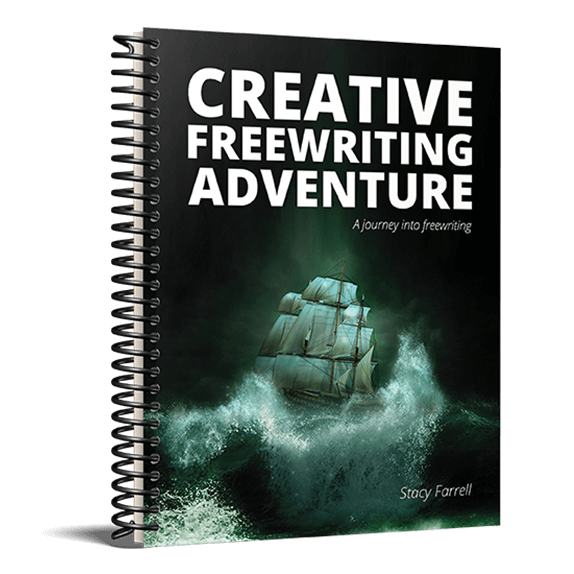
bring excitement into your student’s writing – no prep required!
About the author.
Jordan Mitchell

300 Creative Writing Prompts to Spur Your Creativity
Every good story begins with a spark—an idea that engages, intrigues, and inspires. But what happens when you're facing the dreaded blank page without a flicker of inspiration? The solution lies in writing prompts—effective tools that ignite your creativity and kickstart your storytelling journey. Here are 300 writing prompts that can steer you toward fresh narratives and unexplored themes.
These prompts focus on the personal. They lead you to introspect and narrate your experiences. Prompts like "The most challenging decision I've ever made...", or "The time I faced my worst fear…" encourage self-reflection.
This batch involves prompts that revolve around hypothetical situations. For example - "If I were the last person on Earth...", or "The day I woke up as a millionaire...". These prompts provoke your imagination, pulling your story into unexpected territories.
101 to 150:
Geared toward exploring new perspectives, these prompts offer characters, settings, or situations for you to develop. Imagine prompts like "A day in the life of a time-traveler..." or "Persuade someone to move to Mars...". They challenge you to step into other people's shoes and invent new worlds.
151 to 200:
These prompts dip into genres. Whether it's "Write a ghost story set in an ice cream shop..." or "Your protagonist can read minds, but...". Here, you can explore and experiment with different storytelling styles and themes.
201 to 250:
Taking a poetic turn, these prompts suggest themes for verses. Prompts like "A sonnet about a sunset..." or "a haiku about the four seasons..." provide an opportunity to practice and perfect your rhythm and rhyme.
251 to 300:
Lastly, these prompts focus on the macro, inviting big-picture ideas like "The future of humanity in a technology-dominated world...". They can be deeply thought-provoking, encouraging you to develop intricate plots and complex characters.
So, next time you're stuck or need a writing warm-up, delve into these prompts. You'll find that they not only inspire fresh ideas but also encourage you to write outside your comfort zone. Each prompt is a new adventure in your writing journey, pushing you to explore different characters, situations, and styles, ultimately helping you grow as a writer.
Remember, these are only starting points—the magic happens when you let your creativity take over. Let the prompts guide you, but don't be afraid to deviate and follow where your creativity leads you. And don't forget to make use of Chapterly's AI-assisted content creation to enhance your creative process. Discover new words, narrative styles, and storytelling elements with the help of our intuitive authoring platform.
Personal Introspection Prompts:
1. "The moment I felt most alive..." 2. "The time I had to stand up for what I believed in..." 3. "My greatest achievement and how it changed me..." 4. "A lesson I've learned the hard way..." 5. "How my biggest failure shaped me..." 6. "A chance encounter that affected me deeply..." 7. "A choice I made that defined my life..." 8. "The person who has had the most influence over me..." 9. "A dream that had a profound impact on my waking life..." 10. "What I missed the most during quarantine..." These exciting prompts invite you to harness your emotions, recall your memories, and reflect on life's pivotal moments. This in-depth self-exploration can lead to profound insights and beautiful stories that genuinely resonate with readers. Remember, the magic lies not only in the exercise of writing but also in the journey of self-discovery it sparks. Enjoy this special kind of magic and watch how your writing transforms as you evolve.
11. "The most unique place I've ever visited..." 12. "How the pandemic changed my lifestyle..." 13. "An act of kindness that changed my perspective..." 14. "My perspective on body positivity..." 15. "The most daring thing I've ever done..." 16. "How a hobby can transform into a passion..." 17. "An event that shaped my cultural perspective..." 18. "My journey to self-love and acceptance..." 19. "An unexpected friendship that changed my life..." 20. "What I wish I knew as a teenager..."
These personal introspection prompts can lead to self-discovery while also enabling you to craft relatable narratives that strike a chord with your readers. Remember, writing prompts not only draw out stories, but they allow us to explore parts of ourselves and gain clarity about who we are. So, take these prompts as an invitation to look within, and simultaneously, to step out of your comfort zone and into uncharted territories in your writing process.
21. "A defining cultural experience from my travels..." 22. "How a particular book or film significantly influenced my perspective..." 23. "The role of nature in my personal wellbeing..." 24. "An experience in my childhood that defines who I am today..." 25. "A moment when I felt completely helpless..." 26. "The role spirituality plays in my life..." 27. "The hardest lesson I’ve learned from a past relationship..." 28. "An episode in my life when I had to take a leap of faith..." 29. "A special tradition in my family..." 30. "Recovering from a personal trauma..."
These prompts act as mirrors, providing you opportunity to reflect on your life experiences and weave them into captivating tales. Writing from personal experience not only enhances relatability but also authenticity in your narrative. Ultimately, the journey with these prompts can deepen your understanding of yourself and your craft, enriching the stories you tell and how you tell them. 31. "When I challenged a belief that I grew up with..." 32. "A moment when I truly appreciated solitude..." 33. "How I overcame the greatest obstacle in my life..." 34. "A relationship that taught me tolerance and understanding..." 35. "A time when I stood against the majority..." 36. "When I realized the value of a simple life..." 37. "A situation when I chose to be a leader rather than a follower..." 38. "When I chose family over a life ambition..." 39. "My encounter with a stranger that left a lasting impression..." 40. "The role of failure in sculpting my current success..."
These prompts help you illuminate the corners of your own life experiences, allowing you to tap into the reservoir of your personal growth. Writing about these instances not only provides therapeutic value but also creates an emotional connection with your readers. So, don't shy away from baring your soul, for it's these raw and authentic narratives that truly touch people's hearts.
41. "A hobby that impacted my professional career..." 42. "A moment when I had to confront my own bias..." 43. "When I chose to forgive someone who deeply hurt me..." 44. "The impact of a major public event on my personal life..." 45. "How I rebuilt my life after a major setback..." 46. "A moment of genuine bonding with a person from a different culture..." 47. "The time I had to give up something I loved for greater good..." 48. "An encounter with a mentor that altered my life course..." 49. "The time when I chose silence over reaction..." 50. "A surprising coincidence that changed my life..."
These prompts invite you to explore your past, reflect on your experiences, and articulate them into evocative narratives. Real-life episodes resonate with readers as they often find common ground or learn lessons from your experiences. So, take a deep dive into these prompts and use them as a compass to navigate the contours of your life and creativity.
The Hypothetical "What If" Prompts:
51. "If I could switch lives with anyone for a day..." 52. "If I were to write a letter to my future self..." 53. "If I could master any skill instantly..." 54. "The day I found a door to a parallel universe..." 55. "If I were granted three wishes..." 56. "If I could change one historical event..." 57. "The day I realized everyone can hear my thoughts..." 58. "If I could go back in time and meet any historical figure..." 59. "If I woke up one day and discovered I was famous..." 60. "The day I realized the world I was living in was just a simulation..."
These hypothetical prompts propel you beyond the parameters of reality, setting your imagination free to wander and invent new narratives. They challenge you, stretching your thinking and creativity—an excellent opportunity to flex your writing muscles and build unique and engaging stories.
61. "If I could choose any era to live in..." 62. "The day I woke up ten years into the future..." 63. "If I could communicate with animals..." 64. "If I found a magic lamp in my attic..." 65. "The day I first discovered my superpower..." 66. "If I could revisit any moment in my past..." 67. "The day the world lost the concept of time..." 68. "If I were stranded on an island..." 69. "If I were to wake up as my favorite book's character..." 70. "The day I discovered the secret to eternal youth..."
These 'What If' prompts push your creative boundaries, inviting your imagination to roam across limitless possibilities. Harness these prompts to construct uniquely compelling narratives that breathe life into your ideas. Remember, stretching your creativity injects depth and dynamism into your writing, making your stories mesmerizing and distinct.
71. "If I were to become an overnight billionaire..." 72. "The day my favorite fictional world became real..." 73. "If I could turn any dream or nightmare into reality..." 74. "The day I got the ability to time travel..." 75. "If I could eradicate any one vice from the world..." 76. "The day the Internet disappeared..." 77. "If I had the power to make people read my mind..." 78. "If I were given the chance to colonize a new planet..." 79. "The day I got a front-row seat to an alien encounter..." 80. "If my life was a movie, which actor would play me..."
These hypothetical scenarios can be a fun way to stretch your creative muscles and imagine life from vastly different perspectives. So, prepare to let your imagination run wild and pen down narratives that are nothing short of fantastic. Trust the process and let the scenarios you conjure invoke emotions, provoke thoughts, and inspire your storytelling prowess.
81. "If I became the leader of a new country..." 82. "The day machines gained consciousness..." 83. "If I suddenly got the ability to teleport to any place in an instant..." 84. "The day I realized I could speak every language..." 85. "The day I woke up in my favorite video game..." 86. "If I could instantly solve one world problem..." 87. "The day everyone in the world went mute..." 88. "If I got the chance to script my life's ending..." 89. "The day humans acquired the ability to fly..." 90. "If I were to wake up in a world without color..."
These prompts challenge you to imagine wildly different realities and scenarios. Use them as a launchpad to push your creativity and shape extraordinary narratives that defy the conventional bounds of reality. Remember, it's in these unexplored realms that you can truly unleash the full potential of your imagination, leading to stories that captivate and thrill in equal measure.
91. "If I were to wake up as a character in a painting..." 92. "The day humanity discovered it was not alone in the universe..." 93. "If I suddenly became invisible for a day..." 94. "The day gravity ceased to exist..." 95. "If I could bring a fictional character to life..." 96. "The day everyone's dreams began to come true..." 97. "If I could erase any species of animal from existence..." 98. "The day humans gained the ability to breathe underwater..." 99. "If I could see the outcome of every choice I make..." 100. "The day science found a way to reverse aging..."
These hypothetical prompts invite you to brainstorm innovative scenarios, testing your abilities to craft enticing narratives that stretch the reader's imagination. So dive into these prompts and let them propel you into other worldly scenarios and far-flung possibilities. Remember, your writing journey relies not only on realistic stories but also on your ability to imagine the unimaginable, creating narratives that thrill, inspire, and captivate.

Exploring New Perspectives:
101. "My first day as a Martian settler..." 102. "Life through the eyes of a butterfly..." 103. "A day in the life of a World War II soldier..." 104. "Experiencing the world as a person of the opposite gender..." 105. "My life as a nomadic traveller in the Sahara Desert..." 106. "Perspective of a discarded toy in a thrift store..." 107. "A conversation between the sun and the moon..." 108. "Life as a lone tree in an urban cityscape..." 109. "Imagine being the only human left in a world of AI..." 110. "The mindset of an astronaut embarking on a one-way mission to Pluto..."
These prompts open the door to new worlds and unique viewpoints. They allow you to perceive life from different angles, encouraging empathy and fostering creativity. By adopting unusual perspectives and diving into uncharted territories, you can generate compelling narratives full of depth and insight.
111. "The world as seen from the eyes of a bee..." 112. "Struggles of a child prodigy..." 113. "Walking a mile in the shoes of a homeless individual..." 114. "A day in the shoes of an elderly person experiencing life in a new era..." 115. "Seeing the world through the eyes of a rescue dog..." 116. "The contemplations of a lone lighthouse keeper..." 117. "Chronicles of a soldier returning home after years of service..." 118. "The exhilarating first flight of a baby bird..." 119. "The world from the perspective of an AI robot..." 120. "The daily life of a centuries-old vampire coping with the modern world..."
These prompts invite you to step outside your typical frame of reference and explore diverse perspectives. This endeavours not only enrich the depth and scope of your stories, but also nurture empathy and open-mindedness in your writing. By challenging yourself to depict varying viewpoints, you also enhance your creative versatility - an invaluable asset in the world of storytelling.
121. "A day in the life of the President..." 122. "The struggles of being invisible, from an invisible person's point of view..." 123. "Guiding the lost as a self-aware GPS system..." 124. "Survival insights from a polar bear in a melting Arctic..." 125. "Witnessing a volcanic eruption as a local bird..." 126. "Turmoil of a book as it sees its own pages being torn out..." 127. "Adventures from the perspective of an ancient explorer's map..." 128. "Observations of a guardian angel assigned to a reckless teenager..." 129. "First impressions of Earth, as detailed by a curious alien visitor..." 130. "Self-reflections of a mirror in a busy hat shop..."
These prompts should encourage you to delve deep into perspectives you typically wouldn't imagine. There's an astounding amount of narrative potential in telling a story from a fresh viewpoint. Embrace the challenge to write from an unfamiliar standpoint—it's a fabulous way to stretch your creativity and produce truly original content.
131. "Experiencing the ocean depths as a deep-sea diver..." 132. "Profiling a city from the perspective of a local street artist..." 133. "Living life at a snail's pace, as a snail..." 134. "Journaling the journey of a package from an online store..." 135. "The thoughts and experiences of a cloud on a windy day..." 136. "A year in life of a football from a Premier League club..." 137. "Roman Colosseum: Revisiting historical spectacles from the view of a stone seat..." 138. "Experiencing a volcanic eruption as a native plant..." 139. "A day in life in an alien civilization from the point of view of an Earth visitor..." 140. "Environmental abuse from the perspective of mother nature..."
By exploring perspectives outside your own, not only do you broaden your narrative horizons, but also gain a richer understanding of the world. So the next time you're in search of fresh material, try out these role-reversal prompts and see where your creativity takes you. This paradigm shift might just lead to your most exciting story yet.
141. "The secrets held by a forgotten diary in an attic..." 142. "The journey of a coin from mint to being lost in a sofa..." 143. "The perceptive shift of a caterpillar becoming a butterfly..." 144. "Witnessing human evolution as a timeless ancient tree..." 145. "The shifting world of a chameleon..." 146. "The evolution of music as seen by a Stradivarius Violin..." 147. "Experiencing history from the perspective of a museum artifact..." 148. "Experiencing a snowfall for the first time as an African elephant in a zoo..." 149. "The journey of a mail carrier in a rural mountain town..." 150. "A day in the life of your favourite fictional character if they lived in our world..."
These prompts push your creativity and empathy to the limits as they require you to think and feel from perspectives that drastically differ from your own. Remember, every new perspective is a chance to create an unexpected narrative. So go ahead, step into someone else's shoes (or paws, or roots, or wings), and discover an entirely new story waiting to unfold.
Diving into Different Genres:
151. "Write a spine-chilling horror story set in an abandoned amusement park..." 152. "Craft a romantic plot that starts with people stuck in an elevator..." 153. "A gripping mystery about a death in a family reunion..." 154. "Narrate a thrilling chase between a master thief and a determined detective..." 155. "Write a Sci-Fi story about an AI taking the Presidential office..." 156. "Create an epic fantasy tale about a magical kingdom underneath the ocean..." 157. "Conjure a time-travel mishap filled with hilarious consequences..." 158. "A dystopian world, where reading has been outlawed..." 159. "Portrait a compelling romance between two superheroes..." 160. "Weave a chilling ghost story set within an old, desolate library..."
These genre-based prompts introduce you to different styles of narrative storytelling. By experimenting with various genres, you’ll not only diversify your writing capabilities but will also discover what style resonates with you the most. Remember, trying different genres is not about fitting into a particular box, but about expanding your toolbox as a writer.
161. "Construct an adventure tale of a treasure hunt in a haunted jungle..." 162. "Narrate a powerful human drama set in the backdrop of a civil war..." 163. "Spin a humour-filled tale about a day when pets switched roles with their owners..." 164. "Craft a suspense-thriller about a journalist uncovering corporate wrongdoings..." 165. "Pen a Sci-Fi narrative about humans existing as digital entities..." 166. "Write a historical fiction piece based around the first moon landing..." 167. "Unravel a tale of romance blooming in an old-age home..." 168. "Create a hilarious story set in an office where every day is opposite day..." 169. "Weave a tale of supernatural events occurring in a quiet suburban neighbourhood..." 170. "Write an engaging fantasy tale about a knight who is afraid of the dark..."
Whether it's sparking intrigue with a suspense thriller, captivating hearts with a romance narrative, or tickling funny bones with a humor-filled tale, genre-specific prompts can elevate your storytelling skills. Exploring a variety of genres can also offer a refreshing break, fuelling your creativity further. Remember, these prompts are to not only help diversify your writing but also to explore which genre best complements your storytelling style!
171. "Envision a futuristic world where emotions can be bought and sold..." 172. "Develop an engaging Western about a lawman who can't use a gun..." 173. "A humorous misadventure of a clumsy time-traveller..." 174. "Write a heartbreaking tale of a World War II separated love affair rekindling in the 21st century..." 175. "Spin a paranormal story of a psychic detective solving a murder..." 176. "Write a cyberpunk tale set in a post-apocalyptic city..." 177. "A romance blossoming between two rival chefs in a cooking reality show..." 178. "Craft an adventure story of a pirate with a phobia of water..." 179. "A Gothic horror narrative set in a centuries-old castle..." 180. "Weave a dramatic tale about a rockstar's downfall and eventual redemption..."
Experimenting with different genres not only challenges your writing skills but broadens your understanding of diverse narrative styles. Genre-based prompts help you explore a wide range of themes and settings —from suspenseful mysteries to heartwarming romance— while encouraging creativity within these contexts. So, embrace the challenge, step out from your comfort zone, and see where your writing prowess leads you!
181. "Pen a suspenseful whodunit set in an underwater research facility..." 182. "Write a post-apocalyptic narrative about a group of children trying to rebuild society..." 183. "Craft a magical realism story of a small town where everyone has the same dream every night..." 184. "Weave a romantic comedy set amidst the ruins of an alien invasion..." 185. "A war drama from the perspective of a war correspondent..." 186. "Craft a noir tale set in a city where every person has a clone..." 187. "Narrate an epic fantasy about a reluctant prince saving a cursed kingdom..." 188. "A steamy romance that sparks in the cold corridors of a space station..." 189. "Spin a historical fiction about a secret society in Victorian England..." 190. "A Sci-Fi murder mystery on a ship traveling beyond the solar system..."
Engaging with different genres allows you to explore distinct narrative styles, settings, and tropes, enhancing your storytelling arsenal. From the grim streets of noir tales to the spectral spookiness of ghost stories, each genre lends its unique flavor to your narratives. Remember, as a writer, versatility is a strength, and exploring different genres helps in expanding your narrative range.
191. "Write an espionage thriller set in Cold War era Berlin..." 192. "Craft a romantic tragedy between a human and an alien being..." 193. "Create a dystopian tale about a world where asking questions is forbidden..." 194. "Weave a psychological thriller about a man who sees people's darkness..." 195. "Write a Gothic horror story centered around an antique mirror with a sinister past..." 196. "Narrate a soulful romance blooming amidst the competitive world of ballet dancers..." 197. "Pen an action-packed adventure about a historian tracking down a lost civilization..." 198. "Develop a chilling horror narrative about a haunted toy factory..." 199. "Write a gripping detective story about a series of art heists..." 200. "Weave a stirring drama about a family living in a lighthouse on a deserted island..."
Venturing into different genres of storytelling is a fantastic way to challenge your creative boundaries and expand your narrative prowess. From suspense and horror to romance and fantasy, each genre introduces unique elements that help in crafting engaging narratives and developing diverse storytelling skills. Remember, creative growth lies in exploring new territories and pushing your comfort zone. Happy genre-hopping!
Getting Poetic:
201. "A sonnet expressing love for the simple pleasures of life..." 202. "Write an ode to a moment that changed your life forever..." 203. "A free verse detailing a poignant encounter with a stranger..." 204. "Craft a quatrain exploring the whims of the weather..." 205. "A haiku to capture the serenity of a silent snowfall..." 206. "Pen a concrete poem in the shape of a key, narrating the unlocking of a secret..." 207. "Compose a ballad telling the story of an unsung hero..." 208. "Write a limerick about an unusual journey..." 209. "A poem capturing the essence of a city that never sleeps..." 210. "A triolet exploring the cyclical nature of life..."
Poetry prompts open the floodgates of expression. Poems can distill powerful emotions and vivid imagery into just a few lines, crafting narratives that hook readers at a visceral level. Whether you're already an experienced poet or you're just getting your feet wet, these prompts can lead to a deeper understanding of this profound art form.
211. "Free verse inspired by a whirlwind romance..." 212. "Compose a sonnet about a spectacular sunrise..." 213. "A haiku about the loneliness of the moon..." 214. "Craft an elegy for a crumbling historical monument..." 215. "Skinny poem interpreting the flight of a bird..." 216. "Tanka about the anticipation of a long-awaited reunion..." 217. "A triolet celebrating the beauty of a summer's day..." 218. "Write a ghazal about an unrequited love..." 219. "A concrete poem in the shape of a mountain depicting a daunting challenge..." 220. "Compose a cinquain describing the fleeting beauty of autumn..."
Poetry lets you experiment with rhythm, rhyme, and form, allowing you to beautifully articulate emotions, ideas, and narratives. Whether you're a novice poet or an experienced lyricist, these prompts are designed to inspire and facilitate your poetical efforts. Remember to relax, enjoy, and let your pen dance to the rhythm of your thoughts.
221. "A dazzling ode to the night sky..." 222. "Write an acrostic poem using the word "serenity"..." 223. "Compose a ballad recounting a myth from ancient Greece..." 224. "A sonnet that captures the wonder of a rainbow after a storm..." 225. "A limerick inspired by the antics of a house cat..." 226. "Create a haiku that captures the spirit of a bustling marketplace..." 227. "A blank verse about the quiet beauty of an underwater kingdom..." 228. "A rhymed quatrain exploring the mystery of dreams..." 229. "Compose a pantoum about the changing of seasons..." 230. "Write a lyric poem about falling in love at first sight..."
While poetry often concisely conveys stories, it has a unique ability to emotionally resonate with readers. These poetic prompts encourage you to showcase your creativity, using a rich array of language and an exploration of intricate emotions and nuanced subtleties. Regardless of your familiarity with verse, delving into poetry can enhance your narrative skills and evoke a deep sense of personal reflection.
231. "Craft an English sonnet about a battle between good and evil..." 232. "A free verse on the duality of human nature..." 233. "Explore the serenity of a forest at dawn through a haiku..." 234. "Create a sestina about the complexities of a writer's mind..." 235. "Write a pantoum centered on the theme of reincarnation..." 236. "A villanelle about the beauty and pain of growing old..." 237. "An epigram summarizing the essence of childhood innocence..." 238. "A sonnet expressing one's turmoil amidst societal expectations..." 239. "Craft a ghazal that encapsulates the magic of falling in love..." 240. "A narrative poem telling the tale of an orphan who becomes a hero..."
These poetry prompts allow you to tap into a wide array of emotions, observations, and experiences- turning them into a rhythmic medley of words. Poetry writing can be a deeply rewarding practice, enabling you to play with language and form while conveying profound sentiments. Remember, writing poetry is a beautiful expression of the soul; the more you pour into it, the more rewarding it becomes.
241. "A ghazal that paints the paradox of love and loss..." 242. "Write a concrete poem in the shape of a heart, describing an intense love affair..." 243. "A limerick about a playful encounter with the wind..." 244. "Compose a haiku that captures the essence of a quiet winter morning..." 245. "An ode celebrating the free spirit of a bird in flight..." 246. "Craft an Italian sonnet about the struggle and triumph of a musician..." 247. "A pantoum poem mirroring the relentless ebb and flow of the sea..." 248. "A dramatic monologue poem voiced by a lighthouse keeper witnessing a shipwreck..." 249. "Write a ballad about a ghost haunting an old castle..." 250. "Create a lyric poem inspired by the melody of a lullaby..."
For many writers, poetry is an exercise in vulnerability, authenticity, and striking language use. These prompts encourage you to take a deep dive into a myriad of feelings and situations, spinning them into verses that resonate with readers. Whether you're looking to bare your soul or simply paint a vivid picture with eloquent words, embrace the beauty and catharsis that poetry writing brings.
Exploring Big Picture Ideas: 251. "The future of humanity in a technology-dominated world..." 252. "A world where money doesn’t exist – how would that change society?" 253. "The impact of climate change on future generations..." 254. "Imagine if humans could instantly teleport anywhere - what would be the implications?" 255. "The prospect of humans living forever: is it a utopia or dystopia?" 256. "The consequences of a world where everyone has superpowers..." 257. "If animals could talk, how would society change?" 258. "The ramifications of making contact with an alien civilization..." 259. "How would society evolve if memories could be traded like commodities?" 260. "An essay on education in a world where everyone has access to all of human knowledge..."
These macro-themes compel you to consider bigger picture issues and reflect on their implications. Such prompts help you to think critically and philosophically. Remember, exploring these large-scale themes is not only about surfacing problems but also about imagining solutions—or even questioning whether solutions we take for granted are comprehensive or effective.
261. "The evolution of language in an increasingly digital world..." 262. "A world without the concept of countries, what would that entail..." 263. "The moral implications of genetically modifying human DNA..." 264. "Gender roles in a world where gender doesn't exist..." 265. "How different would society be if there was no concept of race?" 266. "The impacts and influences of artificial intelligence on human relationships..." 267. "Predictions for religion in a world where definitive proof of extraterrestrial life exists..." 268. "The consequences of immortality on human relations and societal structure..." 269. "How would society change if animals held equal rights with humans?" 270. "An exploration of the future of work in a post-automation society..."
These prompts tackle larger narratives about society, technology, and human nature. The goal here is less about predicting the future, and more about thinking from an alternative perspective. Developing your thoughts on such wide-ranging topics helps not only to improve your writing skills but also to refine your critical thinking abilities. It's an opportunity to contemplate, hypothesize, reason, and imagine. So, let your thoughts flow and see where they take you.
271. "How would a world function if everything was shared equally?" 272. "Imagination into a future where every lifestyle choice is environmentally sustainable..." 273. "Ambitions for humanity in a world where no one ages..." 274. "The impact on society if all diseases were cured..." 275. "Prospects of crime in a world where mind reading is achievable..." 276. "The foreseeable effects of time travel on world history..." 277. "The societal implications of a world without scarcity..." 278. "Emotions in a world where humans can control their feelings at will..." 279. "Phenomenal love in a world devoid of physical appearances..." 280. "Gender dynamics in a world where everyone can change their gender at will..."
These prompts open broader perspectives on some of society's most pressing issues or open the gateway into the world beyond our imagination. Interrogating significant, macro-level themes pushes your boundaries of thought and creativity, compelling you to scrutinize intricate, layered aspects of human existence. Use this exercise to mold and refine your perspective and elevate the quality of your writing.
281. "Privacy in an age where every thought gets uploaded on the internet..." 282. "Leisure in a future where robots have taken all the jobs..." 283. "What would a world look like where physical money is redundant?" 284. "The role of governments in a world where population size can be controlled..." 285. "Music in a future where we can taste sounds..." 286. "The prospect of justice in a world where crimes can be predicted before they happen..." 287. "Rethinking reproduction in a world where humans are immortal..." 288. "Exploring human behavior and society in a world without the concept of lying..." 289. "The future of food in a world with no animals..." 290. "The impact on communication if telepathy was possible..."
These high-concept prompts invite you to stretch your creativity, challenge your assumptions and think deeply about various aspects of human life. Such speculation offers an exciting opportunity to dream, to question, and to envision radically different possibilities for the future. Each topic can generate countless exciting narratives, giving you a vast playground to explore theories, possibilities and their implications.
291. "The future of space exploration and the possibility of colonizing other planets..." 292. "The prospect of peace in a world without borders and nations..." 293. "The future of humanity in a world where physical human form is replaced by digital avatars..." 294. "Potential of human adaptability in a world under constant ecological shifts..." 295. "The possibility of equality in a world where social hierarchies are determined by knowledge instead of wealth..." 296. "Creativity in a futuristic world dominated by artificial intelligence..." 297. "Tackling depression in a world where everyone's life is perfect..." 298. "The interplay of truth and propaganda in a world where everyone can read minds..." 299. "The future of sports in a world where humans have gained superhuman abilities..." 300. "The evolution of human relationships in a technically advanced alien society..."
The beauty of macro-based prompts is that they enable you to think beyond the immediate. They challenge you to widen your vision, explore different contexts, and delve into the heart of complex themes. In exploring these big picture ideas, you not only refine your analytical abilities but also expand your narrative horizons. The exercise could lead to interesting revelations about your worldview, enabling you to craft narratives that resonate on a deeper level.
So, next time you find yourself struggling for inspiration, dig into these prompts. Let them be the springboard that catapults you into new dimensions of creativity. From personal introspection to exploring other perspectives, dipping into genres, getting poetic, or wrestling with big-picture ideas, there's a world of imagination waiting to be discovered.
Remember, these writing prompts are only the starting point. They're intended to ignite the spark of your creativity. Use them as they are, twist them, or simply let them inspire your unique ideas. And remember, the most crucial part of storytelling is not merely coming up with an idea. It's what you do with that idea that counts!
Enjoy the creative process and see the magic that happens when you let your creativity run wild. Use this as an opportunity to grow and evolve, both as a writer and as an individual. Let the process inspire you, motivate you, and ultimately, lead you to find your unique storytelling voice.

50 Love Poems that Inspire
Love, in all its blissful, soul-stirring, and heart-wrenching intricacy has always been a cornerstone of human existence. It is a sentiment that has been etched into the confines of our hearts. Enjoy these 50 Love Poems that inspire.
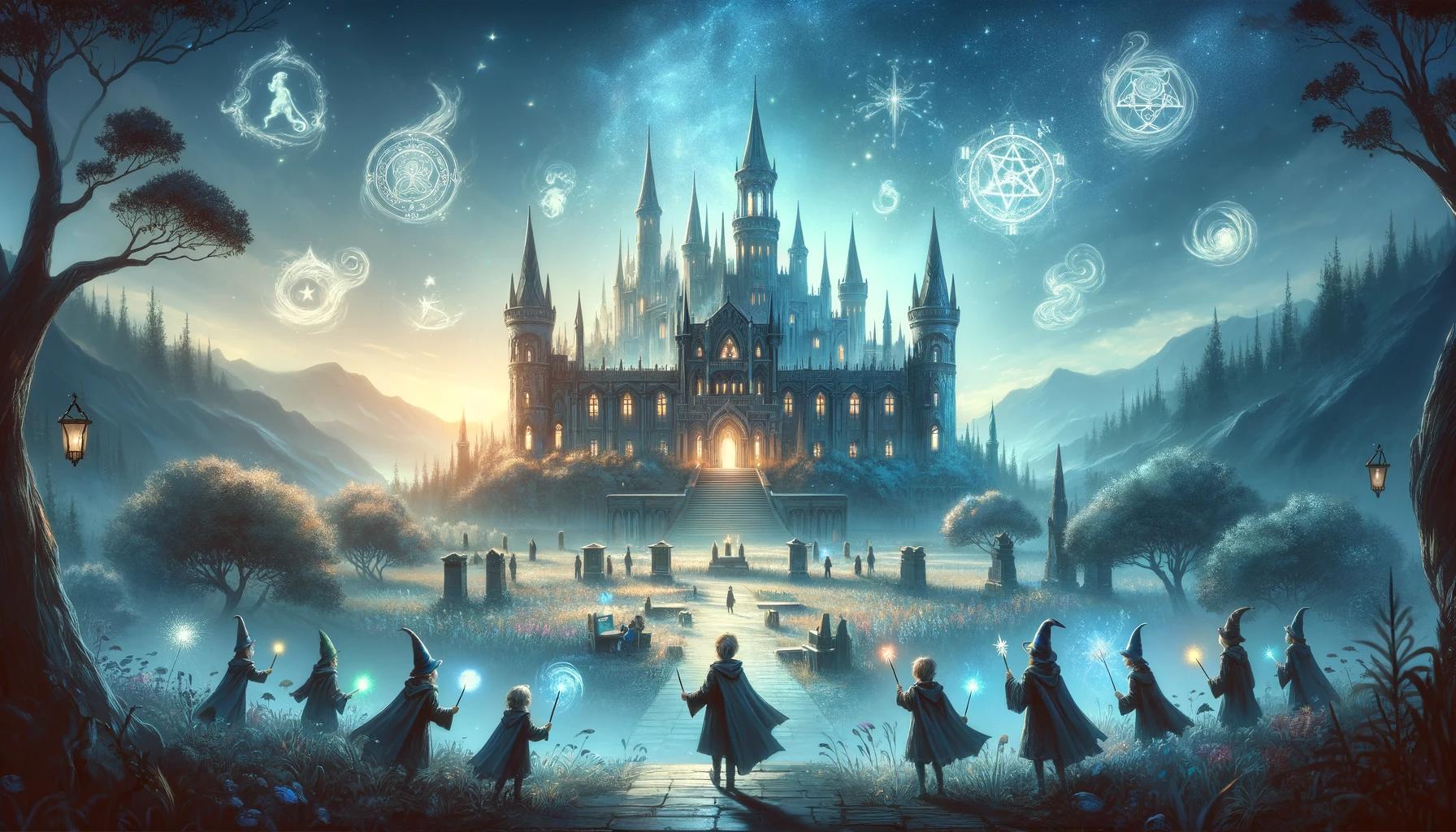
Harry Potter Books in Order
The universe of Harry Potter, conjured by J.K. Rowling, beginning with "Harry Potter and the Sorcerer’s Stone" and culminating in "Harry Potter and the Deathly Hallows"
25 Great Creative Writing Exercises To Awaken The Senses
- January 23, 2023
- Craft , Inspiration

I’ve written about the importance of sensory imagery in writing before, specifically for developing characters, in my blog: Use The Five Senses and Bring Your Characters to Life.
But it’s not just for developing your characters; sensory imagery is needed everywhere if you want your readers to engage with your story.
What is sensory imagery?
When we tell a story, we create a world in the reader’s mind, and by using specific, definite, and concrete details, we enable the reader to enter this new world.
A detail is definite and concrete when it appeals to the senses. It should be seen, heard, smelled, tasted, or touched.
Whether you are writing non-fiction, fiction, poetry, or plays, getting in touch with your senses, and using imagery that relates to them, will serve you well.
Experience using sensory imagery.
This post aims to give you the experience of engaging with each sense and letting it take you somewhere unexpected. It’s all very well to understand the concept of using the senses and even be convinced that it’s important to include them in your writing. Still, until you’ve taken the time—10 minutes is all you need— to experience the nuances of each sense, you might not fully understand why using sensory imagery in your writing is essential and how it works.
How to start: Choose a writing prompt and write it at the top of your page. Set your timer for 10 minutes. Read the prompt and begin writing immediately, without thinking—follow the first thought and go wherever it takes you. No editing, no judging, just writing.
Keep your pen moving.
Don’t stop until the time is up.
Suspend judgment.
Be curious.
Tip: Write by hand. Writing by hand connects the brain and body and, I believe, the heart. It’s especially helpful in getting those first thoughts onto the page.
Remember: you can always write from the POV of one of your characters.
25 Great Sensory Writing Prompts.
The sense of smell.
More than any other sense, smell can connect us intimately to the past in a way our ideas cannot. A scent can initiate a flood of memories regardless of how unexpected or fleeting. A whiff of your mother’s perfume on an old sweater can catapult you to a long-forgotten memory of weekly drives to ballet class, the last kiss at bedtime, tears over a science project, or your wedding day.
Prompt 1. What’s the most unusual smell you’ve ever encountered?
Prompt 2. What’s the first scent you smell upon entering your home?
Prompt 3. What is the most dangerous smell you can think of?
Prompt 4. If you were holding your favorite stuffed animal from childhood, what would it smell like?
Prompt 5. Peel an orange, inhale the scent and write about the first memory that comes to mind.
For more on smell, read the blog How the Sense of Smell Can Enhance Your Writing .
The Sense of Touch
Touch is a basic human need, and it’s the first sense we develop upon entering this world and the last sense to go as we depart this world.
It is also one of the least used senses in writing, perhaps because it’s the most difficult to describe. But think about how often we confirm what we see by reaching out and touching. A reader can more easily engage with a character’s world if they can touch it. I’m using the word touch rather than feel because the term “feel” tends to lead us to emotions, and while that’s important, it’s not what we’re aiming for here.
Prompt 1. Write about the last time you touched wet .
Prompt 2. Write about something you want to touch but can’t or shouldn’t.
Prompt 3. Imagine you can describe a sculpture by how it feels as you run your hands over it.
Prompt 4. Write about the earliest touch you can remember.
Prompt 5. Write about something you can’t pass by without touching it.
For more on the sense of touch, read the blog How To Use The Sense Of Touch In Your Writing .
The Sense of Taste
Taste might be the least used sense in writing but think of all you can learn about your character through their tastebuds. The sense of taste and the act of tasting can be highly evocative, taking your reader from delight to disgust with a mere nibble.
Yes, it may be challenging to describe taste without using the senses for sight and smell, which are inherent in taste but challenge yourself to see where taste alone might take you.
Prompt 1. This exercise will prime you for the following four prompts Choose something you like to eat, a piece of fruit, a square of chocolate, and most anything will work. Sit quietly and take a few slow breaths. When you’re ready, take a bite or place the food item in yo r mouth and let it sit on your tongue. Take note of physical sensations, flavor, and sound. You may discover new sensations and ideas for enriching your descriptive details. Now, write a description of what you experienced.
Prompt 2. Write about your favorite childhood meal and how it might ta te today.
Prompt 3. Think of two of your favorite foods. Now write about how they might taste together.
Prompt 4. Write about the experience of tasting a foreign dish for the first time.
Prompt 5. Describe the taste of your favorite dessert without revealing what it is.
For more on the sense of taste, read the blog, How To Use The Sense Of Taste In Your Writing .
The Sense of Hearing
Second, to sight, hearing gives us a primary experience of the world we live in. Sounds enrich our environment; we depend on them to help u interpret, communicate with, and express the world around us.
While not as evocative as smell, familiar sounds can stir memories and transport us to another time and place. What more powerful tool could a writer ask for than auditory details that offer nuanced layers to a scene?
Prompt 1. What would it sound like if you amplified the sound of snow falling on the roof?
Prompt 2. Describe the sound of a family holiday dinner.
Prompt 3. Play a piece of your favorite music and write from the first image that appears in your mind.
Prompt 4. Sit quietly for 2-3 minutes until you can identify the sound that is the farthest away. Describe it without naming it and go wherever it takes you.
Prompt 5. What sound do you most like/dislike?
For more on the sense of hearing, read the blog How To Use The Sense Of Hearing In Your Writing .
The Sense of Sight
The sense of sight is the sense we use most often in writing.
If you’ve ever tried to describe something without referring to sight, you’ll know just how challenging that is to accomplish.
Perhaps this is because 70% of the body’s sense receptors cluster in the eyes, and it is mainly through seeing the world that we appraise and understand it.
A visual image can be a trigger for memory and emotion. A painting can take us back to a time in history replete with triumph or tragedy. A gesture captured in a photograph may symbolize love, loss, or confusion.
Remember, sight is not only for description and scene setting; showing how your characters see the world and how they feel about it will capture your readers’ attention.
Prompt 1. Describe your face as you might see it reflected in a pool of water.
Prompt 2. Describe someone who doesn’t know you are watching them.
Prompt 3. If anger were a creature, describe it.
Prompt 4. Describe your ideal writing place.
Prompt 5. Choose a painting and describe it without using the sense of sight Use every other sense.
For more on the sense of sight, read the blog How To Use The Sense Of Sight In Your Writing .
I hope you find these prompts useful—let me know how it goes.
Follow me on social:
Share this post:
4 Responses
Thanks for these useful prompts.
I’m glad you found them helpful!
Thank you, Kathryn.
I am from India, where the land is filled with vibrant and splendid colors, smells, tastes, and sounds. Thank you for your tips. Touch is something difficult for me to describe in words. Touch is something I find hard to put into words. Your advice gave me the courage to try.
I’ve bookmarked your page. Looking forward to reading more posts.
Thank you for leaving a commment. I’m so pleased you this blog helpful.
Leave a Reply
Your email address will not be published. Required fields are marked *

Hi, I’m Kathryn Kay, the founder of A Writer Within. I offer support and inspiration to women writers through one-on-one coaching, editing services, and week-long retreats in Tuscany. My focus is on getting writers into the creative flow, beyond their internal critic, and their very best stories onto the page. If you have a writer within, let’s set her free!
DON'T BE LEFT OUT! Subscribe to my Newsletter

JUMPSTART YOUR WRITING PRACTICE in Just 10 Minutes a Day
Ready to unleash your writer within….but not sure how?
This series contains everything you need to kickstart your writing.

“After reading Kathryn Kay’s lovely debut, I had the best kind of cry. What a beautiful, emotional novel. I loved the way she writes about love, necessary secrets, and the dark unknowability of another person, no matter how close. She writes so well about the vulnerability of strong women, the complexity of long friendship, the ways mothers and daughters protect each other, and sweet, tender forgiveness.” – Luanne Rice, New York Times bestselling author
FREE RESOURCE: 40 Question For Creating Compelling Characters
Want to create more interesting characters?
This free gift contains everything you need to start creating compelling characters your readers will remember forever!

© Copyright 2023 A Writer Within. All rights reserved. Website built with care by ForegroundWeb
Subscribe to A Writer Within today to receive news and more:
Embrace Your Writer Within
An online small-group writing workshop for women..
If you aren’t ready to commit to a weeklong writing retreat or 1:1 coaching, but it would help to have support and inspiration —this is a great ( and affordable ) alternative for you.
Tuesdays, 12 pm EST/9 am PST From Sept 17 to Oct 22, 2024

Subscribe to A Writer Within
Sign up today to get the Free Resource: “40 Questions For Creating Compelling Characters” and receive news and more:

25 Creative Writing Prompts
by Melissa Donovan | Oct 23, 2018 | Creative Writing Prompts | 236 comments

Twenty-five creative writing prompts to inspire and motivate you.
Don’t you just hate writer’s block? Some say it’s a disease that only creative workers succumb to. Some say it’s a curse. Others argue that it doesn’t exist at all. But just about everyone has been there–sitting in front of a blank screen, fingers itching to create a masterpiece. And nothing happens.
For me, the most bizarre thing about writer’s block is that it strikes randomly. Most of the time, I’m overwhelmed with more ideas than I can possibly write about. But then I’ll sit down to write and my mind goes blank. Sure, I flip through my notebooks and review all the ideas I’ve stockpiled, but nothing feels right. I want something fresh. I need a new angle.
To help break through this block, I started turning to creative writing prompts. And then I started making up my own prompts. The result: 1200 Creative Writing Prompts , a book designed to spark ideas for writers.
Creative Writing Prompts
Today I’d like to share a mash-up of creative writing prompts, all of which come from 1200 Creative Writing Prompts . There are no rules. Write a poem. Write a short story. Write an essay. Aim for a hundred words or aim for a hundred thousand. Just start writing, and have fun.
- The protagonist is digging in the garden and finds a fist-sized nugget of gold. There’s more where that came from in this hilarious story of sudden wealth.
- Write a poem about something ugly—war, fear, hate, or cruelty—but try to find the beauty (silver lining) in it or something good that comes out of it.
- An asteroid and a meteoroid collide near Earth, and fragments rain down onto the planet’s surface, wreaking havoc. Some of those fragments contain surprising elements: fossils that prove life exists elsewhere in the galaxy, for example.
- The story starts when a kid comes out of the school bathroom with toilet paper dangling from his or her waistband. Does someone step forward and whisper a polite word, or do the other kids make fun? What happens in this pivotal moment will drive the story and have a deep impact on the main character.
- Revisit your earliest memories of learning about faith, religion, or spirituality.
- Use all of the following words in a poem: bit, draw, flex, perilous, bubble, corner, rancid, pound, high, open.
- Write a poem about a first romantic (dare I say sexual?) experience or encounter.
- Write a personal essay describing an exotic animal you’d like to have as a pet.
- Silvery flakes drifted downward, glittering in the bright light of the harvest moon. The blackbird soared.
- Write a tongue-in-cheek, satirical tribute. Tell bad drivers, rude customers, and evil dictators how grateful you are for what they’ve done. Do it with a wink and a smile.
- Write a story about a detective solving a crime that was committed against his or her partner or a crime that his or her partner committed.
- Three children are sitting on a log near a stream. One of them looks up at the sky and says…
- There is a magic talisman that allows its keeper to read minds. It falls into the hands of a young politician.
- We’ve seen cute and cuddly dragons, mean and vicious dragons, and noble dragons. Write a story about a different kind of dragon.
- Use all of the following words in a poem: dash, hard, staple, billboard, part, circle, flattened.
- Write a story set in the distant future when humanity is at a fork in the evolutionary road. Some humans are evolving; others are not.
- The kids were raised on the mantra “Family is everything.” What happens when they find out their parents aren’t who they pretended to be? Will the family fall apart?
- Write a poem about one (or both) of your parents. It could be a tribute poem, but it doesn’t have to be.
- Turn ordinary animals into monsters that prey on humans: dog-sized rats, killer rabbits, or a pack of rabid mountain lions. Give the animals intelligence and set them loose.
- A twinkling eye can mean many things. Write a poem about a twinkle in someone’s eye.
- What determines an action or person as good or evil? Who gets to decide what or who is good or evil? Write a personal essay about it.
- Write a poem about your body.
- The protagonist is about to drift off to sleep only to be roused by the spontaneous memory of an embarrassing moment from his or her past.
- Write about the happiest day of your life.
- Use all of the following words in a poem: feast, fire, modify, squash, robbed, forgotten, understated.
Now It’s Your Turn
Did any of these prompts inspire you? Do you ever use creative writing prompts to ignite a writing session? Tell us what gets your pen moving by leaving a comment, and keep writing!
To get more prompts like these, pick up a copy of 1200 Creative Writing Prompts today.
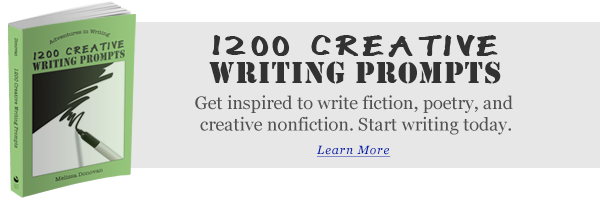
236 Comments
Melissa, Wow, there’s something about this list that feels like a lightbulb went off! There are times when I feel stuck, like ideas aren’t there. And this list really shines what can be…limitless possibilities!
26. If my life were a cartoon… 27. Pick two crayons at random. What thoughts/feelings do two color stir up in you?
Ah, I love the feeling of a light bulb illuminating my mind! Thanks for adding to the list!
what about… That spark which seemed like a star, when it approached closer, my lips went white and body shivering despite the fact I knew I was placed in a desert – by them- and the sun shone directly above my head. Then at a distance of 1m probably, I got the sight of…
Thanks for sharing these.
If you have children, visualize one of them running the house for a day.
That’s a good one. Kids running the house…how very Dr. Seuss! Cat in the Hat without the cat, hehee.
Ooh, great prompts! Thanks for sharing these!
Thanks! Glad you like them!
A day in the life of a doormat
The adventures of a shooting star
Making friends with my enemy
Ooh, interesting! Thanks, Fouzia.
Hi Melissa,
Bought 3 of your books. 1. 101 Creative Writing Excercises 2.10 Core Practices For Better Writing and 3. 1,200 Creative Writing Prompts.
I decided to start with 1,200 Creative Writing Prompts.
So far, I have written 4 stories from the prompts. I guess I want to enquire as to whether I need to go through each prompt. Thank you
Wow, Kevin, thanks for getting three of my books. I truly appreciate that. You can use the prompts in any way that is comfortable for you. No, you do not have to go through each and every prompt. I encourage you to skip around, flip through book, and find prompts that inspire. I hope you have fun with it! Thanks again.
When I took my creative writing class in college the instructor gave us a really good one to use if we couldn’t think of what to write. She said to write the word Remember 3 times and that would prompt something. The entire class tried it and it worked and I have used it several times since then!
I like the use of remember . There are a lot of words that help people when they can’t think of anything to write about. Maybe I should do a list of single-word prompts. Hmm…
Wow. I was COMPLETELY stuck and this brought back a great story for me to write about, though only faintly attached to any memory of mine. Thanks!
That’s great, Camille! Good luck with your story!
I like to use the question “what would happen if …. ”
What would happen if your husband retired and your kid left home and you’re getting older? -> ” Always Faithful”
What would happen if a person moved back home to care for a relative after decades of living far away? -> “The Way Home”
What would happen if a person who has been divorced and alone for a long time suddenly met the most perfect mate imaginable … but it turns out the person may not be what she appears to be? -> “Baiting and Fishing”
In a way, I think “What Would Happen If…” is my novelist version of my favorite childhood game, “Let’s pretend that…..”
“What if” is the best creative writing prompt ever! You can apply it to just about any situation. Just look at any movie, book, or even real life and start asking, “What if things happened a little differently?” or “What if this person made a different decision?” Asking these questions can take your writing in all kinds of new and interesting directions! It’s great fun.
I love these. Here’s one:
“She was drifting off to sleep when there was a sharp knock at the door . . . “
Ooh, I like that one.
Fabulous list. I’ve been brainstorming all morning with no luck, and so I came online and VOILA, here you are. Loved the list, especially 22.
I’ve created several interesting works using my personal favourite “things to do on a rainy day”. I usually write from the perspective of a child, but rarely myself as a child. This one just opens up so many possibilities for make beleive!
Thanks, Melanie! Glad this list helped you in a time of need. My favorite “things to do on a rainy day” story is The Cat in the Hat . Of course, it’s a “day when mom’s away” rather than a “rainy day,” but it’s pretty much the same idea. Keep writing!
these are very great… i got this one off of True Jackson VP.. spin around and the first thing you see will give you an idea..
i just did this and i saw flowers…
i’m writing about “you are walking through a field with your best friend.. you spot a flower and pick it up.. it gives you super powers…
Ah, a flower that gives one super powers. I love that idea! You should definitely run with it!
I love True Jackson VP! Cool that you got an idea from it! 🙂
You’re suggestion really helped! Im doing imaginative writing for homework and I was so stuck but I’ve found the right one now!!
That’s awesome, Grace! Keep writing.
ooh those are cool… how about: He cradled her, taking in all of her burdens as he swept her hair back from her face and stroked her cheek in a gentle calming motion.
I do creative writing as an A level so it would be cool to know if this starter is ok! ty xoxo
Catherine, I think that’s a great starter line, especially for a romantic story or poem! My only suggestion would be the part “gentle calming motion.” There might be one too many adjectives there. If you keep both adjectives, be sure to add a comma after the first one: “gentle, calming motion.” Nice job!
A young man attempts to pull a robbery of some kind on an older man. Things go drastically wrong for the young man. Either viewpoint!
Either viewpoint, or both, could work!
what if the old man was a retired super spy and the young robber is homeless and broke. he tells this to the old man and the man trains him to be a good spy and lets the young robber live with him. then the old man gets the young robber a job as a spy and then they both find out that the retired spy is the young robbers father and the mother ran away while she was pregnant to go be with some rich guy but the rich guy killed the mother and the young robber has been living on the streets since he was 10.
Heres a gorgeous one! Write a story in the POV of a flower being given from person 2 person.
Interesting!
Wow! These are great, thanks for putting these up. I’m 12 and I really want to be a novelist when I grow up. One of my favourites is: the empty glass. It’s a bit over-used but I think that it’s so versatile, it doesn’t matter if it’s popular because you can take it in so many different directions!
That’s great, Katie! You’re off to an early start. Just stay focused and passionate, and you’ll become a novelist if that’s what you truly want. Good luck to you!
Katie, It is never too young to start living your dreams. Don’t ever let anyone get you down. Keep on writing and believe in yourself that one day you will make it! Best of luck!
I couldn’t agree more, AJ!
I’m 11 and everyone thinks I am a good writer and I love to write so much!
That’s wonderful, Maria. Keep writing!
I’m 16 and i wrote a great alternate ending for an assignment in english, and i wrote a short christmas story on christmas eve, but now i just don’t know what to write about. i have ideas and i have been reading prompts that are good but i just don’t know.
Kristi, give the prompts a try. There are also lots of writing exercises that you can use to spark writing sessions when you’re feeling uninspired. The trick is to write something (anything) rather than sit around waiting for something to write about.
Hi! I am 14 and just wanted to do some creative writing, but could not think of anything to write about. Thank you so much for the ideas! I will definitely be using some.
You’re so welcome! Good luck with your writing!
I’m 14 and writing is my whole life. I recently started a blog with my friend, but she’s not a writer. She just inspires me with ideas and stuff. I love your site, Melissa. I check it almost every day. Your prompts and tips are so completely helpful! Thanks so much!
Thank you! I appreciate your kind words.
I’m fourteen, too, and writing is hard to juggle with school and everything else that’s going on. I know – such a teenager-y thing to say…but true nonetheless. I just wanted to say thank you for posting these prompts because they make for quick, satisfying writing that doesn’t end in frustration (at least, mostly). Thanks again!
Writing is hard to juggle at any age. It takes a lot of perseverance, but if you stick with it, you’ll succeed. Good luck to you, and keep on writing!
Im also fourteen and i love to write! i have won a national competition 2 years in a row and i never dreamed i would have won or anything but that just goes to show that youre never too young to write! Just keep believing in yourself and who knows where you might go!
I am thrilled when young people are so passionate about writing (or any craft, really). Congratulations on your success!
One good place to find good story prompts are the obituaries of a large newspaper. One true example: from the Arizona Republic years ago, an elderly gentleman got hit by a motorist one a late, rainy afternoon as he was crossing the street. He had been an immigrant from Norway, and had been a professor at ASU, and was retired and in his 80’s when he died. I have always imagined what his life had been, what he had experienced, etc.
Yes, newspapers are packed with story ideas!
Write a story from the perspective of a sock being separated from its twin in the laundry.
That would make a great children’s story.
a person went to the football stadium and was wearing manu shirt and came out with a barcalona shirt.why???
Well, I have no idea, but this certainly makes a good writing prompt!
I love these!! 😀 Here are a few I made: *Make up your own recipes for your favorite foods *Create your own list of idioms *Write stories of idioms literally happening *Write about something blue *What’s your idea of a perfect vacation? *List what you fear. pick a few and write how they came, why, and when you got the fear first *What would you say to an univited guest at your party *Draw a picture of the setting around you. Now look into your inner being. What do you truly feel? *Write from the point of view of a stack of paper waiting a few inches from the shredder *Her laugh broke the silence…
These are great! Thank you for adding them to the list.
By the way, I’m 11, love writing, and hope to publish fiction teen/children books one day
I wish you the best of luck! You have a head start, being such a young writer. Stick with it!
Lovarsnari,that’s kinda funny because l think the same thing! 🙂 My prob is that l start writing with great ideas,get stuck, and then start a new story/play….
same except that I’m 13 and mix my writing with my guitar playing and music
Well when i get stuck I like to think: What would I do if I were to die in a week? Once I picked everything and it turned quite an interesting story…
That’s a good one!
Hey I’m 14 years old and I love writing but I get writers block often and this really helped me. I love reading the ideas and other people’s ideas they are just very interesting. Number 19 seemed the most interesting to me and I’m almost done with my story. 🙂 thanks so much
Thanks, Violet. I often find that prompts and exercises can be used in different ways. You don’t always have to do the actual exercise. Sometimes, just reading through a book of exercises will generate ideas for a project I’m working on or help me understand a writing concept in a new way. Good luck with your story!
Hi Melissa 🙂 Last year i won junior writer of the year ( I’m 13) and I am entering this year as well and in the process of creating my first draft. I love your site and its wonderful, all-inclusive feel. So, here are my ideas for your list.
26. Post-War oppression & depression ( this was my winning topic last year – i wrote it from the perspective of a scarred war veterans’ emotionally abused child) I also commend you in your point concerning finding hope and light in darkness ( war, death, etc.) and i am going to write about that! Possibly with an Amish girl as the protagonist? thank you again for inspiring me. I also hope to be a great writer some day. Bee
Congratulations, Bee, and thanks for adding to these prompts. I wish you the best of luck in becoming a great writer. You are certainly well on your way!
POV of a toy sitting on a shelf in a toy store, hoping to be purchased.
your pet starts talking to you in perfect english and tells you what he/she really thinks of you…. what does he/she say?
Ha! That could be enlightening indeed!
I actually saw an animated short based on that premise (or something similar to it) and found it quite compelling. A great idea!
My contribution:
“When I look in the mirror, I don’t see what everyone else sees. What I see is…”
Nice! Thanks for adding this prompt, Nick.
My college English teacher gave my class this prompt. First Line: John closed his eyes. Last Line: It was a good day for the yellow crocuses. Anything in between. I easily made five pages with that prompt. Have fun guys.
Thanks for sharing that prompt, Jessy. It’s a good one.
Im a 17 year old living in the most secluded area of Kentucky, unfortunately. lol My dream is to pursue a career in filmmaking, my goal is to help people who are confused or unsure about life and what they want to do with their oppourtunity of life. I want people to think and find happiness in their lives by doing something they love. My idea of doing this came from being in a depressed state from the past few years as a teen and felt strong enough to overcome it without professional help which is progressing for the good. I found setting goals is a great strategy to stay focused and optimistic about life. I appreciate your time for reading this and if there is any advice you could influence me with id appreciate that as well. Thanks
It’s wonderful that you have set your sights on a clear career path at such a young age. Filmmaking is awesome! I sometimes wish I had taken up an interest in film or photography. The best advice I can offer is to never give up, stay focused, and pursue your goals with heart and soul. I would also advise studying film at college, if you can. The film industry is notoriously networked and you’ll benefit greatly by making friends and acquaintances who share your interest. Best of luck to you!
Thanks for taking the time to reply, it’s very much appreciated and yes im going to film school out in LA next year.
Hi! I am 13 and have been writing since I was 7 or younger, and I am in love with writing. I am a very dedicated author and I have finished books in the past (about 11 or 12) but now I can’t seem to get into any longer stories! I write more short stories now, but it’s not satisfying anymore…and then, when I come up with a new idea, it’s useless, and my brain gets all cluttered! Help!
It sounds like you’re having trouble staying focused. The first (and most important) thing that can help with that is to stay healthy: eat right, exercise, and get enough sleep. You may also need to break up your writing with other activities. Make sure you read regularly! For the time being, maybe you need to write short stories. I’m not sure you need to fight it.
thank you for the advice! 🙂
You are most welcome!
Hello 🙂 I am 17 and doing my HSC this year. I am attempting (unsuccessfully) to write a creative writing piece as practice for my exams, and thank you so much for these, they’re really helpful 🙂 I am not a writer (and never will be), but these have given me some great ideas that I can hopefully use to increase my writing skills for my exams. So thank you very much 🙂
You are very welcome, Emily, and best of luck on your exams.
I’ve found that this list, and peoples comments/ideas have been quite inspiring. I’m 21 and haven’t been in school for a few years and I have that desire to write, but never knew how to get started. I thank you all for these wonderful ideas and I’m hoping that writing will be a good outlet for me and my struggle with depression.
So really I’m just thanking you all 🙂
You’re welcome, Nicole, and thank you for joining in the discussion. Writing is a great way to work through emotions; I wish you the best of luck!
These are great!!!! My favourite starter would definetly have to be: “Sometimes a girl just has to run. Sometimes our feet take over. This was one of those times”
I think it holds a lot of suspense but it could also be happy and bright, like a sports day or carnival. Thanks for adding these, I am going to try to write a story for each one.
I’m not sure where that starter comes from, but it sounds good to me.
Hi! Thanks so much for these prompts. I especially like number two, because I feel like a little bit of positive thinking can go a long way. 🙂
I have a question, too, if you don’t mind.
What is your opinion on fanfictions? I know some creative writers don’t like them and feel they corrupt a series, while others think it’s a great creative exercise.
Thanks so much!
I think fan fiction is a great way for young and new writers to explore the craft. Some copyright holders are extremely strict about allowing fan fiction to be published. Others will actually develop and publish collections of fan fiction. There are also franchises in which fan fiction is encouraged. One of my all-time favorite writers, TV and film writer Damon Lindelof, said in a recent interview that he started out writing fan fiction. Now he’s writing for Ridley Scott and working on the Star Trek films as a fan-fic professional! It’s definitely an avenue worth pursuing if it interests you.
I’m fifteen and I want to write a book before the end of highschool. The problem is I can’t finish what I’ve started. I always find a “better” idea and write about that and the cycle begins again. Please help me!!!
The only way to finish what you’ve started is to simply finish it. When “better” ideas present themselves, make a note and file those ideas away for a future project. Part of being a writer involves developing self-discipline. I recommend setting up a reward system. For example, you have to work on the novel for 20 minutes before you can call or text your friends after school. Or you have to finish a scene before you go out to see a movie. These are self-imposed rewards, so you have to discipline yourself. Nobody else can do it for you.
You might also look into participating in NaNoWriMo. The timing is great because it starts in just a few weeks. That means you’ll have some time to prepare and check it out. Then you can write your novel in November, leaving plenty of time afterwards for you to clean it up (edit, proof, polish).
Finally, if you’re truly committed to writing, start looking at schools with good creative writing programs and plan to study at college. University instructors are quite helpful in teaching students self-discipline and good writing habits and practices.
Best of luck to you, Art!
Hi! Your prompts and the comments have really helped me! I can’t wait to start some stories from them:) Here are a couple that I’ve come up with: The Bell sounded. Workers froze in their places… Kay frowned as she opened her school locker after school. Down the hall, Alexis and Christine exchanged grins…
That’s great, Alyssa. Keep up the good work!
These are fantastic! I’m also 21 and have been out of school for awhile. I used to write all the time when I was in school but not so much these days. These ideas are really going to help once I get started writing again. I’m attempting to set a goal for myself. An hour a day, just writing whatever I want. Just to get me back in the habit.
Thank you so much!!!
One prompt my creative writing teacher in high school gave the class was “It was a smile that darkness could kill…”
That’s wonderful! An hour a day is enough to produce quite a bit of writing. I wish you the best of luck, Ashlee!
Obviously it is now 2011 haha, but these are great!! I have wanted to write a novel for quite some time but I can’t seem to get the creative juices flowing. So I set out on a quest across the World Wide Web and I am finding some amazing ideas!! Thank you so much for this website I look forward to writing now instead of despairing of that dreaded cursor blinking me to oblivion!!
I hope your quest for inspiration is fruitful! And keep writing!
I’ve just been inspired to start a personal blog full of my own creative writing, with the assistance of some of these wonderful writing prompts (both yours, and the ones left in the comment section). Thank you, thank you, thank you.
That’s wonderful! Blogs have been a boon for writers, and I think more writers should take advantage of the technology. I wish you the best of luck with your blog, Emily.
Hi, I’m 17. I started creative writing when I was about 10 or 11. I found myself writing more and more when I was troubled a few years back, so it was good stress relief for me. But now that I’m busy with college, I realize that I haven’t been writing as much as I used to. I reread some of my old work and I thought “Hey, why not? I’ll give it a try for old times’ sake.”
I was a bit confused with where to start off, but these prompts really got my creative juices flowing. After I post this comment, I think I’ll try one or two of them and see how far it takes me. Thanks for the inspiration. 🙂
I’m so glad that these prompts inspired you, Christi. I think many writers go through phases when they drift away from the craft, but when you’re called back to it, that might be a sign. Follow it and keep writing!
In my junior year of high school, we were given a creative writing assignment to expand on this sentence:
“A person walked into the room, looked around, sat down, and ate.”
That’s a great prompt. It would certainly be interesting to see what a whole classroom of people come up with. I imagine each piece of writing would be quite different from the others, even though they are all based on the same premise. Thanks for sharing it, Alli.
Here’s a prompt! Prop open the door. I can actually see my breathe tonight. But that doesnt mean im breathing.
Ooh, sounds like a zombie, robot, or vampire story.
These writing ideas helped a lot thank you. I really want to go to a creative writing school when I get older. One idea which I just came up with is Write from the perspective of your fish.( does each fish have there own personality, how does each fish react to the different members of the house, what is it like to be a fish) 😛 I hope you like I write often mostly stories with a more poetic base, but once in a while i will feel in the mood to write some thing different. Oh also try continuing after this sentence. Its eyes gleamed pitch black death, creeping into imaginary, azure skies. now continue it :3
Thanks for sharing your prompt, Samantha, and good luck to you!
For school, I have to enter a creative writing competition. I have two days and i was really panicking but then i found this website! It really helped! Thankyou Writing Forward!!
Hannah, I’m so glad you found help and inspiration here. Thank you!
Lately I’ve been trying to write a lot like Sarah Dessen! Were doing stories in class and I’m doin one about a girl who runs away, it starts out “I’m on the run! I don’t know where I’m going or where I’ll end up, but I’m not turning back!” 🙂 Do you like it?
I do like your opening line. It certainly grabs the reader’s attention and rouses curiosity. Nice job.
Thank you so much!!!! This got me over my terrible case of writer’s block. But now my muse is back!
Wow, thanks, Maria. That’s awesome!
I just want to say that this list of prompts has inspired me to take on a challenge of using one every day up until xmas on my blog… or at least until the end of the month!
Thanks for the great list 🙂
That’s awesome, Julz. Good luck with your December writing!
I haven’t tried it yet, but I think a fun way to mix these up even more would be to choose one of these, then draw the name of an author out of a hat, then write that prompt in the style of that author. That would really stretch your creativity.
That’s an excellent exercise and would definitely be challenging. You’d have to be deeply familiar with the author’s voice.
I have found these prompts really helpful for the English lessons that I teach.
Many thanks.
That’s great, Cass. I love the idea of these prompts helping students with reading and writing.
i have learnt English as a second language…writing is my passion…this page is REALLY inspiring!thanks for evoking our creative faculties… i want to suggest some topics and the list goes as: 1The beast in me 2Daily journal of a pair of shoes which is in the process of its making 3What the world be if gender roles get changed 4What if i were in the shoes of my English teacher 5How things at the high school are going to be if the concept of beauty gets altered altogether 6It is said that writing is all about pouring your mind on a piece of paper but what it your pen literally starts articulating your thoughts and you end up writing EVERRRRYTHING(What consequences are you going to face)
Thanks for adding your ideas to these prompts!
I haven’t tried the prompts yet but I have always wanted to be a writer since I was eight years old. However ever since graduating and entering the real world I find my muse being choked to death by the responsibility at home. I’ve had to give up my dream of writing for the past two years. I tried taking it up again and was drawing a huge blank, but just by reading a few of these prompts I’ve felt my muse start to breathe. Thank you!
Hi Rochelle. I remember graduating and entering the real world, and I had a similar experience. All of a sudden I just didn’t have the time or inspiration. It took a while, but I adjusted and my creativity returned. I’m so glad you found these prompts helpful!
I found like 5 great writing prompts thank u so much
You are so welcome!
you thought dragoons unicorns and monsters didnt exist? think again! write story of your pet unicorn
That’s a cute idea!
Thank you for these, I am a writer waiting to hear if a publisher is going to publish my novel. Waiting is so hard and my mind has gone blank. These help to stir the jucies again. I’m hand writing them in a note book and taking them with me when I’m out, to write on the go. When I have to wait for a kid to get to the car I can write and not have to figure out how to start a story. So thank you. so much.
That’s awesome. What is it about being in a car or shower that makes us more creative? I always get ideas in those two locations!
thanks sooo much! those were super helfull! you have the most helpfull website ive found! and i’m a picky writer! THANKYOU!!!
Thanks, Anna.
here are some more ideas: you inherit 1 million dollars your backpack grows wings on the way to school a zombie invasion stikes your small/big town a kidnapper captures you … hope these help 🙂
Thanks, Ebony!
Hey! These prompts really helped and I can’t wait to use some 🙂 I have started with the one about twinklling eyes and turned it into a story about creatures similar to werewolves XD
Sounds interesting, Molly! Good luck with your story, and keep writing!
My English teacher says she doesn’t believe in writer’s block. I on the other hand am not so sure. Sometimes I sit in the afternoon and stare out the window, unable to come up with anything good but I find that ideas flow like crazy at two in the morning with a cup of coffee in my left hand. That’s always my best remedy, though writing prompts like these always help me get going. Thanks for sharing 🙂
Some prompts:
10 things I hate about… What’s the recipe for those wonderful _______ muffins you baked last night? (Try filling that blank with ‘unicorn’.)
I believe in writer’s block, but I think that it’s presented as being unable to write whereas usually it’s just a case of needing to work a little harder at writing. Sometimes, we need to stop procrastinating, stop trying to force our ideas, or we just need to allow ourselves to write badly for a while. I believe there are ideas everywhere; the trick is to keep ourselves open to them and be willing to explore them. Having said all that, writer’s block still sucks. I’m like you, Maluly, the ideas flow like crazy at two in the morning (no coffee required!).
i dont believe in writiers block.. i think its more like an exuse to hide what we really want to write or say. Like sometimes peoploe wonder if it will be good enough so they put it off or they dont want people who read it to know something.. its all about the way you look at it i guess. Write what you feel. Write whatever you want. I love writing but i find myself wondering will this be good enough? What would someone think if they read it? Maybe thats just me. no self esteem… but, low selfesteem is what keeps creativity hidden…. my advice.. to everyone is to just go for it. if its not good try again you’ll get better(:
I agree: just go for it.
Thanks for these! I definitely believe in writer’s block!! In fact, I am just emerging from what I like to call writer’s ‘droubt’, since it lasted at least a year. But I don’t think you need to be blocked to use prompts. They are great exercises and get you to try new ways of writing. And sometimes, when I get burned out with the story I’m currently writing, it helps to focus on something completely different for a while, and you can come back to it with fresh eyes. Here are some prompts that I came up with and they helped me out: 1) ‘It all started with the cat…’ 2) ‘Have you ever seen something out of the corner of your eye, but when you turned to look, found nothing there? You dismiss it as an illusion, a trick of the light. You’re wrong…’ 3) Write something from the perspective of a ghost. 4) Write something using the five senses EXCEPT sight (hearing, smell, touch, taste) 5) Instead of using first or third person, write with second person point-of-view (in other words, use ‘you’ instead of ‘he/she’ or ‘I’. Or try writing in present or even future tense, instead of past tense.
Oh yeah, and one more: 6) Write something from the perspective of the BAD guy, instead of the hero
I love when stories do this! Thanks for adding it, CJM.
These are excellent prompts, especially well suited for speculative fiction writers. My favorite is the prompt about seeing something out of the corner of your eye (that happens to me sometimes!). Thanks for adding these.
Here’s one for those of you who have pets What do your pets do when you and other inhabitants of your house are not at home?
Ooh, that’s a good one, Lily. That could be great for a children’s story!
Thank you SO much for these exciting writing prompts! They really inspire me. I have one idea for a prompt: Write about a conversation that you would have if were stuck in an elevator with a celebrity or famous book character.
You’re welcome, Arieda. I love your elevator prompt! You could also do it with characters from your novel as a test to see how each would behave in an elevator with a celebrity. That could tell you a lot about your characters. Good one!
Lovely ideas, both of these! Arieda, that prompt gave me a short story idea, one that I’m pretty excited about, and I’m definitely going to have to do that with all my characters now, Melissa. 🙂 I thought up another twist on this prompt that intrigues me: Your characters get stuck in an elevator with you, their author. How do they react when they discover who you are and that you control their destinies? What sort of conversations would you have? Would you like interacting with your character? Would your character like you?
Hannah, I love your prompt idea. What a fun writing exercise: The Character Meets the Author. That’s quite brilliant!
Thank you so much for these, I’m trying to write a book…and I’ve been at a stand still lately, so this will help me more than ever.
You’re welcome, Alexis. I’m glad you found these prompts helpful.
Hi Ms. Donovan! thank you so much for the writing prompts! i’ve been using them for all my english creative writing assignments. it’s been my dream to be a writer since i was little. although i find it hard to write mysteries. ironically it’s my favorite genre to read though. any advice on how to get started on a good mystery?
I myself haven’t written mysteries, although I have read a few. My suggestion would be to read as many mysteries as you can, and watch mystery films and television shows, so you thoroughly know your genre (you should still read other stuff too!). Study the greats and ideas will come to you!
Wow i have writers block i have my charecter but i dont know what the problem is…… help any good title ideas?
When I’m stuck and can’t come up with a character or a title, I just skip it. The important thing is to keep writing. You can always come back later and add names and titles. Here’s how I do it:
GIRL said that there was no way out but OLD LADY knew otherwise…
I use all caps for characters who don’t have names yet. Many writers use a “working title” as they are developing their project. A working title can be anything. It’s just temporary.
You’ll find that as you work on your project (and if you work around these little setbacks), ideas will come to you. Good luck!
Awesome post:) Thanks so much, really helped! have a great day! Peace-Jeff
Thanks, Jeff!
A prompt could be : She started to fall over and _________( fill in the blank) picked her up.
or : The alien gaze stared from above the fence , and I blushed in embarrassment.
100 words about your favorite animal
a short story about a difficult topic like : war , famine , bullying .etc
a poem about the weather
Hi Melody! Thanks for adding your prompts to this ever-growing list!
Your prompts are definitely creative and helpful, but what I’m most impressed with is how you respond so positively and encouragingly to everyone who replied to this. Sometimes all it takes is a little bit of encouragement or approval from even a complete stranger to shift a young writers thought from maybe being able to do something to just doing it. I haven’t written in months, and are still my having any real luck, but I know I will write again someday, and I just thought it should be mentioned that you are a good person for encouraging others to do what they love. Best of luck to you…
Thank you so much, Shannon. Your words mean a lot to me. I try to be an advocate for writers and encourage young and new writers to explore their ideas and find their voices. I believe the world would be a better place if we all followed our passions, and more importantly, encouraged others to do so as well.
“Conundrum”
The little girl cries with a lie on her lips The girl can’t remember her name The little boy’s laugh rings with hollow self-doubt The little girl feels just the same A little dog lost in the thick of the woods A little man sick with dismay A little boy born in the arms of the girl A little life born from a day A little death born from an ignorant choice A little boy crying away And a little God laughs at the sight of it all For this little herd has not a say
Thanks for sharing your poem with us, Conner. Keep writing!
It’s the first time that i’m gonna be doing an inter-school creative writing competition, and i found these prompts really helpful! Thanks a billion!
You’re welcome!
Really like the prompts! It was really helpful! My brother and I are always gonna use this website! I <3 it!
Thanks! I’m glad you like it here 🙂
Thanks Melissa for the writing prompts. I asked my students to develop their writing skill through these useful prompts. By the way, I have published my first fiction ‘Faith No More’. I’d be extremely glad if you could manage to read any of it and provide me with feedback.
Hi Afshin. Thanks for sharing these prompts with your students. Requests for feedback should be sent via email (you can use the “Contact” link at the top of this site).
i have been major struggling with writing my second book and when i found these i just opened up my mind more and i decided not to write a second book it was just fine without one and now i can be on a whole other spectrum thanks so much these has inspired me a lot i put a few of em together to get ideas 🙂 well done 🙂 highly appreciated
That’s awesome. Thanks for letting me know that these prompts helped you. Good luck with your writing projects!
I just got a typewriter at a great market the other day so I came looking for something to help me have fun and get inspired while I was using it. Thanks for the help! I ended up writing a thing about an embarrassing moment that helped me learn how to not sweat it when embarrassing moments happen. This particular one had to do with toilet paper… haha. Cheers!
Embarrassing moments always make for good storytelling. Enjoy your new typewriter!
I’ve been really into playwriting lately, but I’ve been stuck with writers block for the longest time. A couple of these prompts really caught my attention and I’ve already got so many new ideas, I don’t know where to begin! 🙂
That’s awesome. I’m glad you found this piece so helpful.
I have had writers block for months now. This site has helped me so much!
I’m thrilled to hear that! Keep writing!
My favorite way to start up a story is to listen to a song and think about the story of it. Sometimes I use the first part of the song as the first sentence of my story. I hope this helps.
That’s an awesome idea! I love music-literature crossovers.
Hi thank you so much for these ideas i have chosen an idea and i have a perfect picture of my idea . Thank you again and as you will see on all of your comments you have helped a lot of children or adults from this website . Thank you !
You’re welcome! Thanks for commenting.
Great prompts.
I shared #9 with my page for a fun writing exercise about an hour ago. Great response! 🙂
Thanks for sharing one of these prompts with your readers. I hope they have fun with it.
Thanks for the prompts! Reading other people’s ideas always makes me feel more hopeful about initiating my own. I have struggled to put my thoughts down on paper for as long as I can remember- there just seems to be a disconnect between the disorganized chaos of possibilities in my head and that little spot where the ink meets the paper. BUT- I wanted to offer an idea that has often provided many interesting and fun possibilities to me- Think of a time of day ( 7 pm, the sun setting, the day cooling off, night creatures beginning to stir), or a month ( August, the air laden with heat and damp, everything deep and green and vibrant), and then try to think of all the qualities that accompany that period of time ( do most people seem happy then? is it a relaxing time? a tense time? does the weather make life easier or harder?). Once you’ve collected as many descriptions and feelings about this time as you can, then begin to build a world where it is ALWAYS that time- how do people’s lives change? 🙂
Ooh, that’s a great exercise. I wasn’t expecting the twist at all! Love it.
This is awesme. i like these. i like writing prompts, and this is a very helpful website
Thanks! I’m glad you liked these prompts.
omg wow, this helped me so much, thankyou so much!! i love my writing and this just helped me ten fold. xxx
You’re welcome. I’m glad you found it helpful.
I’ve been writing since i was eight, [approximately (obviously – i haven’t been counting!)] but I started to loose it… flame was REIGNITED by my best friend. but despite the burning, I have never actually completed a story. It knaws at me all the time! I’m currently writing a revolutionary/Sci-fi, which is odd for me, I’m more into writing realist novels… but your prompts gave me such a PERFECT plot twist that I had to comment on it! this will give me motivation for at least a few weeks… (meanwhile dancing up and down with sheer joy and attracting VERY weird looks.) Though it IS kind of weird, because non of the prompts have anything to do with it… My, how strangely the mind works…
Yes, the mind works in mysterious ways. I’m glad one of these prompts inspired you. Best of luck with your story (I love sci-fi).
This website is a life saver. My brain just froze and I was trying to do a creative writing story, and my life and my school / collage life depended on it. Thanks to one of your prompts, it won my school a pride. Thanks a lot. 🙂 bye!!!!!!!!!!!!!!!!!!!
Whoops I meant prize
That’s awesome, Tierrney! Congrats on winning a prize. Keep writing!
wow great writing promts, ive already decided on the start of my story but I cant think of anything that can happen. I want something to happen. HELP!!!!!!!!!!!!!!!!!!
Try throwing some conflict at your main character. Good luck to you!
Wow!! I tried prompt number one just for fun one day, I have not exercised my creative mind in a long time, and I want to thank you for offering these prompts. I really surprised myself at the poem I wrote. It probably wouldnt go over to well with the grammar police because I used old english and standard english.. but the content just really surprised me. I was like, “where did that come from”? Thank you so much!!!! Blessings and Thanks to you for your website!
Thanks for your kind words, Kathleen. I’m so glad you found inspiration here!
thank you so much i found 3 ideas for a school project i am working on this is going to be one of my most big acomplishments!
You’re welcome! Good luck with your project.
i love this website because it helped me get an A on my project!!! i am soo thankfull to WRITING FORWARD!!! thank you sooo much and i am sooo confident that i will be sure to use this website again….thanX a million luv WRIGHTING FORWARD~~kbb
You’re welcome. Congratulations on getting such a good grade!
Writing comes from the mind and obviously the ideas comes from our real life….The story of mystery novels always comes from the fear we have in our minds and it can come from everything… I can remember the things…when I wrote my first poem ‘Rain’…it was raining in cats and dogs outside…..
I think writing comes from many places. I try not to over-analyze it, but it is interesting to examine our ideas and try to figure out where they came from.
I really like your ideas but I had some of my own that I think you could add to your list. You could add things like:
You’re outside cutting your grass when you come across a large hole in the ground. You’ve never noticed the hole before, but it looks to be some sort of tunnel to another world. You decide to peek through and see where it leads, only it leads you to a pivotal moment in your past—and it’s giving you an opportunity to change it. Write this scene.
A toy, stuffed animal, or game that once meant a lot to me
Why I deserve a larger allowance
The book that got me hooked on reading
This really bugs me.
One thing I want to do by the time I finish 8th grade
I would like to have lived during this time in history.
Thanks for adding these writing prompts, Shreya.
Start your story with: Jessica had no choice. She closed her eyes and jumped.
You might be surprised.
Ah, that’s an interesting prompt.
Here one possibly
What if you woke up one day with no memories in a strange world where nobody was who they said they were?
Wow! I really like this list of prompts! I’ve been looking for inspiration to write a short story and I especially liked the one about dragons! “We’ve all seen cute and cuddly dragons, mean and vicious dragons, and noble dragons write about a different dragon”
Thanks, Meredith! I’m glad you liked these writing prompts.
Anyone considered using visual (photos/paintings) prompts?
A scenic view, a city view, a beach, a hill, a house, a village, a car, a train, a plane, a boat, a castle, a body?
Yes, I’ve used visual prompts, and I’ve included them in my book, 1200 Creative Writing Prompts . The image prompts are described (rather than using images), but they’re a lot of fun.
Hi I’m Hallie I’m 13 years old and I love writing. Just for some reason I can never think of things to write about. I really like fantasy. I look online for writing prompt ideas and I find a lot of good ones but none of them really click. I really want to write something but I don’t know what. What should I do?
Hi Hallie. Thanks for visiting Writing Forward. What you’re experiencing is fairly common among writers. I have experienced it many times — when I want to write but I don’t know what to write and nothing clicks, I will look through prompts and my old notes, and I just don’t get fired up about anything.
I’ve found that in moments like these, the best thing to do is just write anyway. We can’t feel inspired and fired up all the time. And often, when I force myself to just follow some prompt or writing exercise, even when I don’t really feel like it, I start to get into it and eventually, something clicks.
There will be many times when writing is fun or even thrilling. But I’ve found that the people who stick with writing are those who write even when they’re not especially inspired. Sometimes it’s work. Stick with it, and you’ll experience all these highs and lows. Every single one of them is worth it.
Wow! I really like the diversity of your prompts, Mellisa. I’ve been writing a collection of short stories of my childhood experience of the Biafran War in Nigeria and struggled with some troubling memories but you’ve reminded me that I could just write everything as it comes to me and revise later. Also, I love your children stories prompts.
Thank you, Edit. That makes my day. I’m always glad when people find the articles here at Writing Forward useful. Good luck with your stories. That sounds like an important project.
is it weird that when i saw the one on dragons the first thought to my mind is ‘ i counld do one on a gay dragon, right?’ and then when i saw number 4 ( for all the twilight fans, just a heads up), i thought of jasper hale- i’m not calling him ugly- but i saw the fear part and thought to myself how he fears hurting someone/ losing control.
Is it weird? I don’t think it’s weird. The point of the prompts is to engage your imagination, so it seems like they are working, which is great.
I absolutely love these! I have been writing since I was able to talk. I told my dad exactly what to write down on little pieces of paper. Now that I’m fourteen, I was sure I wrote every idea imaginable. But these really gave me a fresh perspective, and for that, I am so grateful! It also inspired me to come up with a prompt of my own: She sprinted through the trees, quickly twisting around thick trunks as she dodged the sheriff’s arrows. Her stomach ached from the laughs that shook her entire body. Foolish sheriff. He thought he could catch a pirate?
I’m glad you enjoyed these writing prompts. Your prompt is awesome. Keep writing! It will take you places that only you can imagine.
I loved these prompts. I had my friends pick a number between 1 and 25 to chose which on to do. I think they improved my writing skills. Thank you!
I’m glad you enjoyed these prompts, Nora. Thanks for your comment.
I am a 13 year old and I love to write. I have a best friend and she always wants to see my writing, but I didn’t want her to see it because I didn’t think it was very good. She insisted on seeing it, and when I showed her the first chapter in a story I was writing just for myself, she thought it was brilliant. She then disguised it as an excerpt from an e-book app and showed it to our English teacher. My friend pretended that it was a real, published book by an actual author and asked for the teacher’s opinion. The teacher loved it and asked for the name of the book. When she discovered it was written by her own pupil, she was shocked and said i should send it to a publisher. Now I am confused. I didn’t think my writing was very good. What should I do now?
Hi Sam. I was your age when I started writing.
There are a few things you might want to do. First, continue working on your book until it’s finished. This will be hard. You will probably lose interest at some point. You’ll get stuck and feel unsure where to take the story. You’ll have other ideas that seem better, and you’ll be tempted to set this story aside. Don’t be deterred. Stick with it.
Do your parents know about your interest in writing? At 13, you would need their involvement in any publishing or submissions that you might want to do. You can also try talking to your teacher. Don’t be shy about this. It’s the job of teachers to guide their students. But keep in mind, not all English teachers are knowledgeable about the publishing industry. See if she can offer some guidance. You might be able to find literary magazine for kids your age and submit your writing so you can start getting some practice in the publishing world.
Beyond that, make sure you read a lot and write as much you can. If you love writing, it’s something that will always be with you. As you get older, you’ll be able to carve out the path you want, whether that’s to make writing a career or continue enjoying it as a hobby.
Best of luck to you!
I am 10 and I have written a few short stories of my own, and I really enjoy creative writing. I was very pleased when I found this website, now I won’t be struggling to think about what to write.
That’s wonderful, Kaiya. We love having young writers around here. Thanks so much!
I’m 12 and I also really like writing. I have always been trying to write short stories since I was six (I started with mostly seven page picture books). Finding how to start a story has always been pretty hard, but these prompts have really helped! I definitely have to explore some more of these prompts. There are so many! Thank you!!
Wow, Naomi, that’s wonderful. I was just a little older than you (13) when I started writing (poetry for me). You have a long and wonderful journey ahead of you, and I hope you enjoy all of it! You’re welcome for these prompts. I’m so glad you found them helpful.
Thank you so much for sharing this wonderful post with us.
the one that has the tailsman remids me of “Wings of Fire” because one of the dragons named darkstalker put is animus magic on a scroll and called it his tailsman and he can read minds so it really reminded me of that book
I haven’t read Wings of Fire but it sounds interesting!
oh and it fell into the wrong hands or really talons but ya i just wanted to share that information thank you for this i really got some good ideas like the detective one
Trackbacks/Pingbacks
- Writers Block « Sol Searching - [...] Donovan wrote a great article at Writing Forward (http://www.writingforward.com/creative-writing/25-creative-writing-prompts) to help motivate your writing mind. She list 25 creative…
- fun for writers | Starla Kaye - [...] Writing Forward: creative writing prompts. [...]
- October 14, 2011: Write about nature. CWE 11 | icanseealotoflifeinyou - [...] http://www.writingforward.com/writing-prompts-3/creative-writing-prompts/25-creative-writing-prompts [...]
- The Ruby Slippered Sisterhood - [...] A few weeks ago, I had fun with a great little prompt I found on a blog called Writing…
- this may call for a proper introduction « arcane den of written words - [...] huge. Just a few ideas I’ve had recently. I found a really great collection of prompts here, you should…
- Writing Prompt Resources (Links galore!) – The Talers - […] https://www.writingforward.com/writing-prompts/creative-writing-prompts/25-creative-writing-prompts […]
- 116/129 Friday | Pongo Wu's First Draft - […] Writing prompt from Writing Forward: […]
- 10 Best Creative Writing Prompts - […] 25 Creative Writing Prompts from Writing Forward […]
Submit a Comment Cancel reply
Your email address will not be published. Required fields are marked *
This site uses Akismet to reduce spam. Learn how your comment data is processed .

Subscribe and get The Writer’s Creed graphic e-booklet, plus a weekly digest with the latest articles on writing, as well as special offers and exclusive content.

Recent Posts
- 10 Reasons Storytellers Should Dabble in Poetry
- When Poets Don’t Read Poetry
- Writing When You’re Not in the Mood
- How to Write Faster
- Writing Tips For Staying on Your Game
Write on, shine on!
Pin It on Pinterest
10 Great Creative Writing Activities To Try Today
What are the best creative writing activities worth your time? And how can these activities help you become a better writer? Good creative writing activities should help you write faster and enjoy the process more. It shouldn’t take too long to try or require any fancy tools or software.
For years, I struggled with writer’s block, until I began experimenting with various fun creative writing activities.
Now in this article, I offer several creative writing activities that will help solve a problem like writer’s block or write a better story for your readers.
1. Use Writing Prompts
2. keep a daily journal, 3. try free writing, 4. research your subject , 5. write without interruption, 6. collaborate with someone else, 7. let your writing sit, 8. get feedback on your writing, 9. change the point of view or tense, 10. read your writing aloud, bonus creative writing activities: reward yourself, how do you make creative writing activities fun, what are creative writing activities.
If you want to write, consider keeping a record of books you want to read or quotes that inspire you. I also recommend building a personal library of writing prompts.
A writing prompt is simply a question, statement or single sentence that serves as a springboard into your creative work. You can buy books of creative writing prompts or alternatively, you can record your own.
If you opt for the latter approach, I recommend using the first line from books you love. They’re kind of like templates upon which you can jump off into the unknown.
You may also want to try brainstorming a list of creative writing prompts to use for your short story, essay or book chapter.
Lots of writers also keep journals where they record daily observations about their lives or work. Essentially, these journals are where writers gather their ingredients for their next work.
You can’t cook a stew with just water, just like you can’t write without having something to say.
Many cooks keep clippings from their favourite chefs and recipe books. They use these as inspiration for meals to cook.
You can do so on your phone or in a paper notebook (I like the over-priced Moleskine notebooks ). A notepad and paper by your bedside is a good idea for when inspiration strikes at 4am. Alternatively, apps like Day One make it easier to journal on a mobile phone.
The habit of daily observations is a good practice for any writer . I recommend it to anyone who wants to improve their writing skills as it encourages you to sit down and write consistently.
Even if these observations sound silly in hindsight, you may be surprised by what turns up.
Free writing describes the act of writing about whatever is on your mind for a predetermined period. While free writing, your job is to get words down on the page without stopping to self-edit or censor yourself.
This type of exploratory creative writing is useful for solving problems like writer’s block. It can also help reluctant writers increase their daily word-count. Free writing makes for a great story starter too.
You can free write on your writing app of choice, on a piece of paper, in the notes app on your phone.
If you’d like to learn more about free writing, check out the excellent book Writing Down the Bones: Freeing the Writer Within by Natalie Goldberg.
If you write nonfiction, start with a clear brief of what you want to say and how you’re going to say it.
For example:
Journalists receive a brief for a story from their editor (i.e. here’s today’s news agenda) or a source (i.e. “I have information for you about…”).
They also also spend time compiling lists of possible interviewees and deciding on questions to ask, just as a chef shops around for the finest ingredients.
Academics and educators decide for themselves what they want their work to taste like, albeit with the help of a tutor. They also spend time reading academic papers in their area of study and conducting qualitative and quantitative research.
Bloggers sign up to various blogs, using a feed reader to aggregate content and by keeping up to date on industry trends.
Having a clear brief for an article or book helps with critical thinking.
Lots of writers have various routines they follow before writing. Some people like to cook while enjoying a glass of wine. (I like to write and drink coffee).
Other writers describe how they disable their internet access when they want to get some serious work done.
If you are an academic , preparation may involve taking key findings from your research papers and applying it to your area of study.
This stage also usually involves completing a literature review prior to engaging in the act of essay writing.
If you are a journalist , this exercise involves interviews with sources and newsworthy figures. It also involves collating relevant news articles and findings.
And if you are a blogger , focus on one theme or topic and research what search volume around this topic using a keyword analysis tool.
Sure, having a quiet place to write is important, but sometimes it’s helpful to work with another writer or an editor on your piece. Alternatively, perhaps you can borrow ethically from work you admire.
A good sentence, like a stew, isn’t going to write itself. Some pieces of work are light and easy to prepare. Other meaty pieces of work take longer to cook.
An academic will write several drafts of their paper or chapter, all the while assessing how it compares with current literature and weighing it against their central thesis.
A journalist will type out transcripts of their interviews, and consult with their editor or colleagues. They will search for a newsworthy angle and may even draw conclusions, depending on the tone of their piece.
A blogger will look for relevant posts by other bloggers to link. They will also frame the topic in such a way that it appeals to what readers are searching for. She or he will also consider supporting multimedia content.
If you’ve finished writing a story, article or book chapter, let it sit on your computer or in your drawer for a while. Your subconscious will continue working on the idea while you do something else.
Cooks recommend leaving a stew simmering for several hours before serving. Similarly, a piece of writing is best left to marinate in a drawer (be that physical or digital).
This way, when you look at your work after a break, the words won’t be as hot, and you’ll be able to see if you need to season the piece with more facts or spice it up with some colour (i.e. unusual adverbs, similes and metaphors).
For an academic , this could involve letting a chapter rest for a few days and then making some quick edits before submitting to tutor for feedback.
A journalist , may have less time for their stew to prepare and will normally consult with their editor or sub-editor to finalise their piece.
A blogger has more leeway here, as they are normally their own bosses. They can take this time to season posts with relevant links, pictures, meta descriptions, ALT tags and a call to action.
The act of writing is more about turning up than it is about divine moments of inspiration. A lot of the time writing feels like drudgery, but there’s a pleasure in watching your sentences slowly improve.
Writers learn faster if they get feedback from other writers, knowledgable readers or editors.
A good stew is best eaten in company. Lots of writers have this idea that they should write for themselves. Instead, it’s far better to share what you’ve created with friends, family and the wider public.
This essentially involves publishing your work. A blogger will upload their post onto their platform of choice and support it with social media comments. An academic will submit to an identified journal and a journalist will publish a story in a newspaper.
Writing in a public forum carries a degree of vulnerability, but it’s a great way develop a consistent, recognisable voice. It also opens the writer up to criticism.
An editor or tutor will provide this anyway (it’s their job), but if you are writing for yourself, consider asking a friend or subscribers to your blog for feedback.
Some criticism may be constructive and some of it won’t help at all. Your fiercest critics could become your biggest enablers for better writing.
And there’s always an argument for killing those sentences that give you the most pleasure.
In writing, you must kill all your darlings.” ― William Faulkner
I learnt this exercise while enrolled in a creative writing workshop years ago in the Irish Writer’s Centre in Dublin.
If you have time to spare, consider rewriting a troublesome piece from the point of view of a different character. Alternatively, switch it from the past tense to the present tense.
Like many reluctant writers, at first I was sceptical when I heard about this creative writing exercise.
But for some odd reason, I was surprised to discover it worked.
These days, I find it easier and faster to write in the present tense, and whenever I’m blocked on an article or story, I rewrite it in that tense.
Perhaps the act of reviewing a piece of work and quickly editing it helps. The writing process is sometimes odd like that.
It’s sometimes fun and instructive to read an extract from your piece aloud for others to listen to and critique. This creative writing activity works well in classrooms and in small groups.
The act of reading it aloud will help you listen for sentences to edit and rewrite.
The person facilitating the workshop or class should also offer the following writing instructions:
- Everyone should say one thing they liked and disliked about the piece.
- The writer can only comment at the end
- Everyone must read a piece aloud
Why all the rules?
Well, you can’t control how readers react when they consume your published pieces in the privacy of their own homes.
If everyone read a piece aloud, the process will feel fair.
Writing is hard work. If you’ve accomplished a writing goal, reward yourself. Journalists tend to get paid for this, but some academics and most bloggers don’t.
A reward could be a short break to watch a favourite TV programme or a walk in the park.
You could eat out after trying a creative writing activity successfully.
Just like dining in a fancy restaurant can give you ideas about what you’d like to cook next, reading other peoples’ works (especially outside your preferred genre) is food for inspiration.
If the work is more involved, it could be a guilt-free purchase or even a holiday. These writing breaks are important because they refresh the writer’s appetite.
Creative Writing Activities: FAQ
An enjoyable creative writing activity is usually easily to apply and doesn’t require a lot of time or fancy tools. It’s fun if the writer in question can approach the activity without fear of failure or judgment.
There are many to choose from but popular examples include journaling, free writing, using writing prompts, exploratory writing and writing to a tight deadline or low word-count.
TRY OUR FREE APP
Write your book in Reedsy Studio. Try the beloved writing app for free today.
Craft your masterpiece in Reedsy Studio
Plan, write, edit, and format your book in our free app made for authors.

Guides • Perfecting your Craft
Last updated on Dec 23, 2022
Creative Writing: 8 Fun Ways to Get Started
About the author.
Reedsy's editorial team is a diverse group of industry experts devoted to helping authors write and publish beautiful books.
About Savannah Cordova
Savannah is a senior editor with Reedsy and a published writer whose work has appeared on Slate, Kirkus, and BookTrib. Her short fiction has appeared in the Owl Canyon Press anthology, "No Bars and a Dead Battery".
Creative writing is a written art form that uses the imagination to tell stories and compose essays, poetry, screenplays, novels, lyrics, and more. It can be defined in opposition to the dry and factual types of writing found in academic, technical, or journalistic texts.
Characterized by its ability to evoke emotion and engage readers, creative writing can tackle themes and ideas that one might struggle to discuss in cold, factual terms.
If you’re interested in the world of creative writing, we have eight fantastic exercises and activities to get you started.

1. Use writing prompts every week

Coming up with ideas for short stories can be challenging, which is why we created a directory of 1700+ creative writing prompts covering a wide range of genres and topics. Writing prompts are flexible in nature, they are meant to inspire you without being too constrictive. Overall, they are a great way to keep your creative muscles limber.
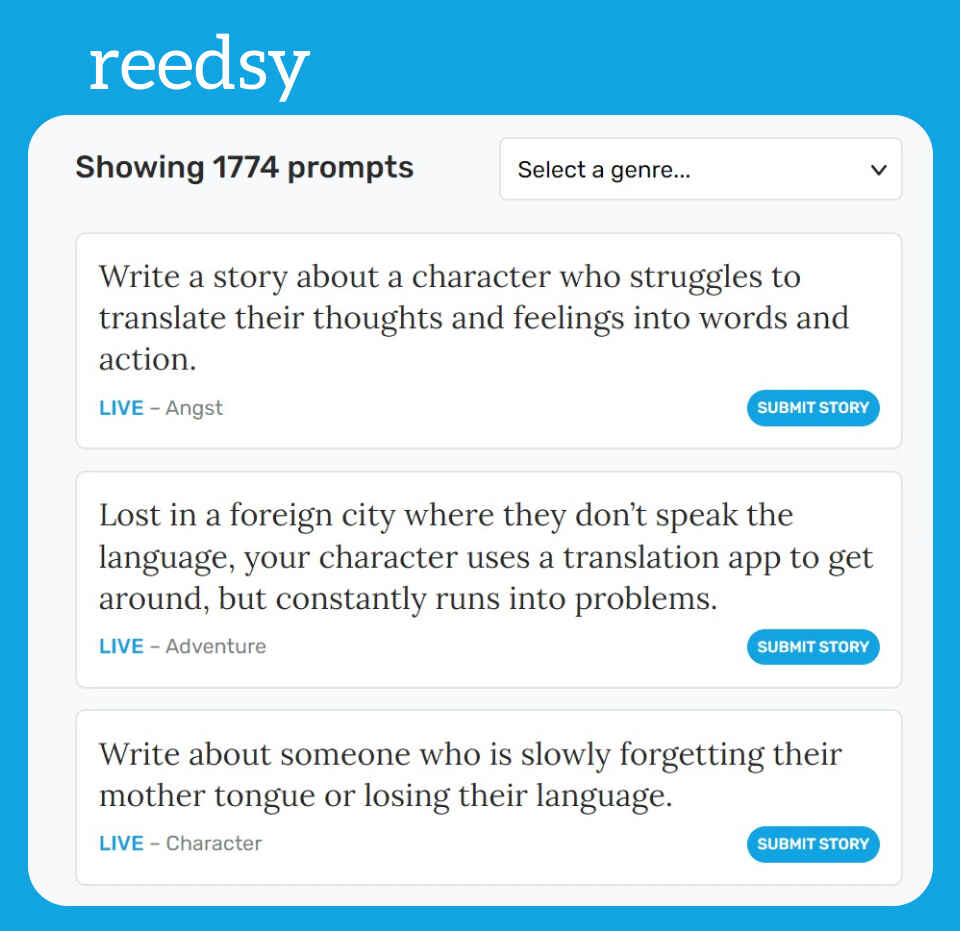
If you’re struggling for motivation, how does a hard deadline and a little prize money sound? Prompts-based writing contests are a fantastic way to dive into creative writing: the combination of due dates, friendly rivalries, prize money, and the potential to have your work published is often just what’s needed to propel you over the finish line.
We run a weekly writing contest over on Reedsy Prompts , where hundreds of writers from all around the world challenge themselves weekly to write a short story between 1,000 and 3,000 words for a chance to win the $250 prize. Furthermore, the community is very active in providing constructive feedback, support, and accountability to each other 一 something that will make your efforts even more worthwhile.
Take a peek at our directory of writing contests which features some of the most prestigious open writing competitions in the world.
2. Start journaling your days
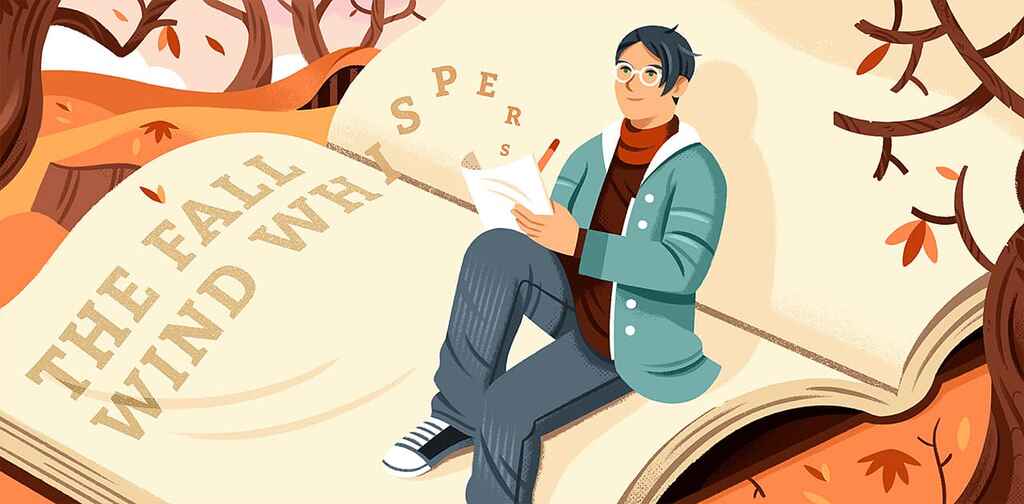
Another easy way to get started with creative writing is to keep a journal. We’re not talking about an hour-by-hour account of your day, but journaling as a way to express yourself without filters and find your ‘voice in writing’. If you’re unsure what to journal about, think of any daily experiences that have had an impact on you, such as…
Special moments . Did you lock yourself out of your house? Or did you catch a beautiful sunset on your way back from groceries? Capture those moments, and how you felt about them.
People . Did you have an unusual exchange with a stranger at the bar? Or did you reconnect with someone you haven’t seen in years? Share your thoughts about it.
World events . Is there something happening in the world right now that is triggering you? That’s understandable. You can reflect on it (and let some steam off) while journaling.
Memories . Did you go down memory lane after a glass of wine? Great, honor those memories by trying to recollect them in detail on paper so that they will always stay vivid in your mind.
Life decisions . Are you having an existential crisis about what to do with your life? Write down your thought process, and the pros and cons of the possible decisions in front of you. You’ll be surprised to discover that, not only is it a great creative writing exercise, but it can also actually help you sort your life out!
If you struggle to write consistently, sign up for our How to Write a Novel course to finish a novel in just 3 months.

NEW REEDSY COURSE
How to Write a Novel
Enroll in our course and become an author in three months.
3. Create an anonymous social media account

Like anonymous blogging, an incognito Twitter account sidesteps the pressure that comes with attaching your name to your work. Anonymously putting tiny stories out into the ether gives you the freedom to create without worrying about the consequences — which is great, so long as you don’t use it as an opportunity to troll people or spread conspiracy theories.
You could use the anonymous account in different ways. For example, you could…
- Tweet from unique perspectives (e.g. a dog observing human behavior );
- Create a parody account of real or fictional people (e.g. an English poet from the Middle Ages );
- Challenge yourself to write tiny flash fiction stories that fit into Twitter threads.
Just remember, you’re not doing this to fool anyone into thinking that your account is real: be a good citizen and mark yourself a fiction account in your bio.

But if you’re not really a social media kinda person, you may enjoy our next tip, which is a bit more on the analog side.

GET ACCOUNTABILITY
Meet writing coaches on Reedsy
Industry insiders can help you hone your craft, finish your draft, and get published.
4. Find an old photo and tell its story

Find a random old photo — maybe on the web, maybe from a photo album in a yard sale — and see what catches your attention. Look closely at it and try to imagine the story behind it. What was happening? Who are the people in it and how are they really feeling? Do they share a relationship, and of what kind? What are their goals and dreams?
In other words, bring the photo to life with your imagination. Don't be afraid to take artistic license with your story, as the goal is to be creative and have fun while writing.
How do you know it’s creative writing?
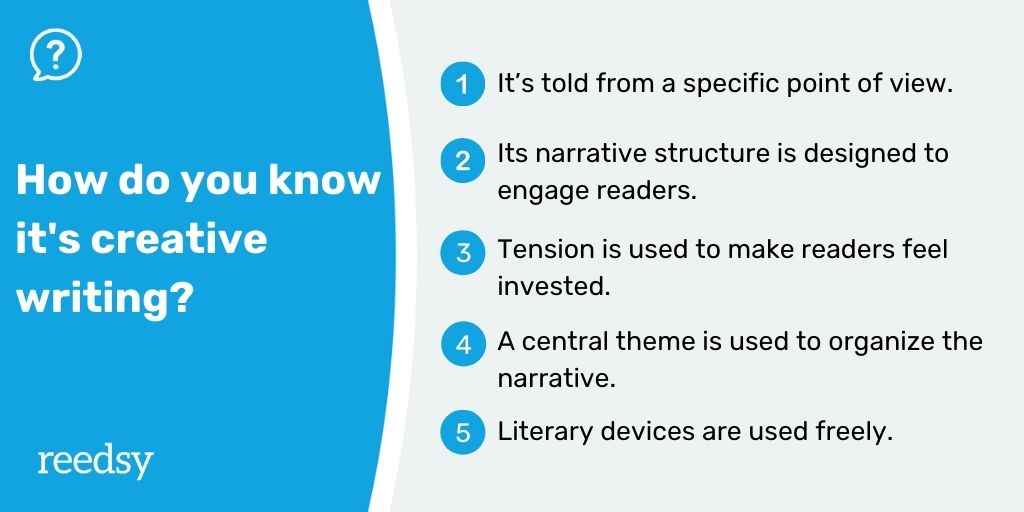
5. Create a character from a random name

Just as our universe started from a few simple elements, you can create a character from a few basic information, like their name, culture, and gender. Reedsy’s handy character name generator can help you with that, offering random names based on archetypes, Medieval roots, fantasy traits and more. A few examples? A Celtic heroine named Fíona O'Keefe, a hero’s sidekick named Aderine, or a Korean track star named Park Kang-Dae.
Once you've chosen their name, begin to develop their personality. Set a timer for 5–10 minutes and write anything that comes to mind about them. It could be a page from their FBI dossier, a childhood diary entry, or simply a scene about them boiling an egg.
Just ‘go with the flow’ and don’t stop writing until your time is up. Repeat the process a few times to further hone the personality. If you like what you end up with, you can always go deeper later by creating a character bible .
If a stream-of-consciousness exercise is not your thing, you can try to imagine your character in a specific situation and write down how’d they respond to it. For example, what if they were betrayed by a friend? Or if they were elected in power? To help you imagine situations to put your character in, we made a free template that you can download below.

FREE RESOURCE
Reedsy’s Character Questionnaire
40 questions to help you develop memorable characters.
6. Construct a character by people-watching

People watching is “the action of spending time idly observing people in a public place.” In a non-creepy way, ideally. Sit on a bench on a public square or on a road-side table at your favorite café, and start observing the people around you. Pay attention to any interesting quirks or behaviors, and write it down. Then put on your detective’s hat and try to figure out what that tells you about them.
For example, the man at the table next to you at the restaurant is reading the newspaper. His jacket and hat are neatly arranged next to him. The pages make a whipping sound as he briskly turns them, and he grimaces every time he reads a new article. Try to imagine what he’s reading, and why he’s reacting the way he is. Then, try to build a character with the information you have. It’s a fun creative exercise that will also, hopefully, help you better empathize with strangers.
7. “Map” something you feel strongly about into a new context

Placing your feelings into new contexts can be a powerful creative writing exercise. The idea is to start from something you feel strongly about, and frame it into a completely different context.
For example, suppose your heart is torn apart after you divorce your life-long partner: instead of journaling or crafting an entire novel about it, you could tell a story about a legendary trapeze duo whose partnership has come to an end. If you’re struggling with politicking and petty power dynamics at the office: what if you “mapped” your feelings onto an ant who resents being part of a colony? Directing your frustration at a queen ant can be a fun and cathartic writing experience (that won’t get you in trouble if your co-workers end up reading your story).
8. Capture the moment with a haiku

Haikus are poems from the Japanese tradition that aim to capture, in a few words, daily moments of insight (usually inspired by nature). In a nutshell, it’s about becoming mindful of your surroundings, and notice if you can see something in a new or deeper way 一 then use contrasting imagery to express whatever you noticed.
Here’s an example:
Bright orange bicycle
Speeding through the autumn leaves
A burst of color waves
It may sound a bit complicated, but it shouldn’t be 一 at least not for the purpose of this exercise. Learn the basics of haiku-writing , then challenge yourself to write one per day for a week or month. At the end, you’ll be able to look back at your collection of poems and 一 in the worst case scenario 一 revisit small but significant moments that you would have otherwise forgot about.
Creative writing can be any writing you put your heart and soul into. It could be made for the purpose of expressing your feelings, exploring an idea, or simply entertaining your readers. As you can see there’s many paths to get involved with it, and hundreds of exercises you can use as a starting point. In the next post , we’ll look more in detail at some creative writing examples from some fellow authors.
Join a community of over 1 million authors
Reedsy is more than just a blog. Become a member today to discover how we can help you publish a beautiful book.
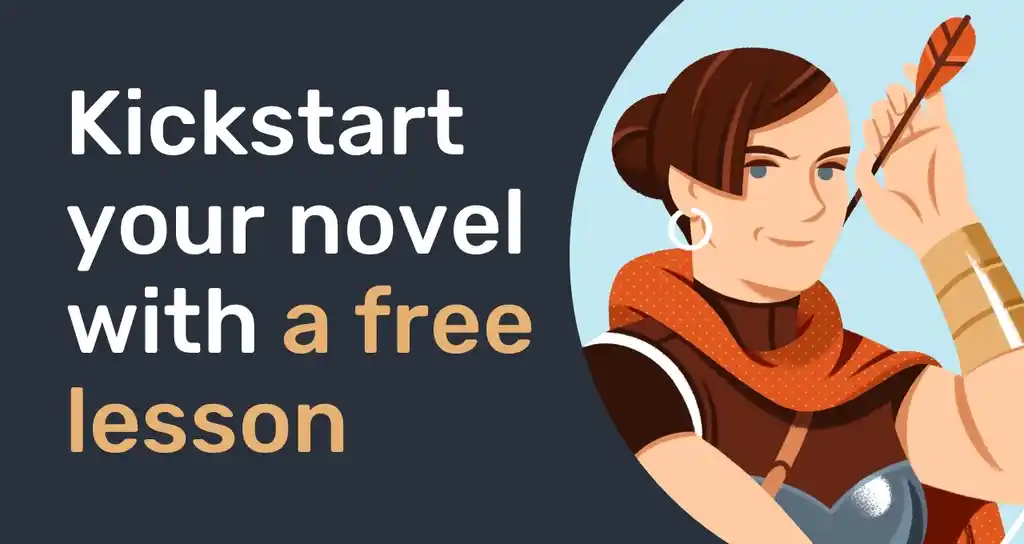
Try our novel writing master class — 100% free
Sign up for a free video lesson and learn how to make readers care about your main character.

1 million authors trust the professionals on Reedsy. Come meet them.
Enter your email or get started with a social account:
- Grades 6-12
- School Leaders
Free printable to elevate your AI game 🤖
10 Creative Writing Activities That Help Students Tell Their Stories
Lower the stakes and help them get started.

“I don’t have a story. There’s nothing interesting about my life!” Sound familiar? I don’t know a teacher who hasn’t heard students say this. When we ask our students to write about themselves, they get stuck. We know how important it is for them to tell their own stories. It’s how we explore our identities and keep our histories and cultures alive. It can even be dangerous when we don’t tell our stories (check out this Ted Talk given by novelist Chimamanda Ngozi Adichie and share it with your students for more on that). Storytelling is essential for every subject, not just English Language Arts; students dive deeper and engage when they practice thinking about how their own stories intersect with historical events, civic engagement, and the real-world implications of STEM. These 10 creative writing activities can work in every subject you teach:
Here are 10 of our favorite story telling activities that inspire students:
1. write an “i am from” poem.
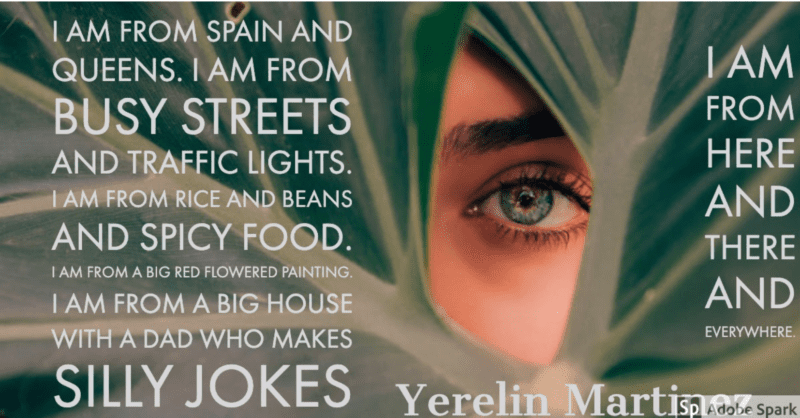
Students read the poem “I am From” by George Ella Lyon. Then, they draft a poem about their own identity in the same format Lyon used. Finally, students create a video to publish their poems. We love this one because the mentor text gives a clear structure and example that students can follow. But the end result is truly unique, just like their story.
2. Design a social media post to share an important memory
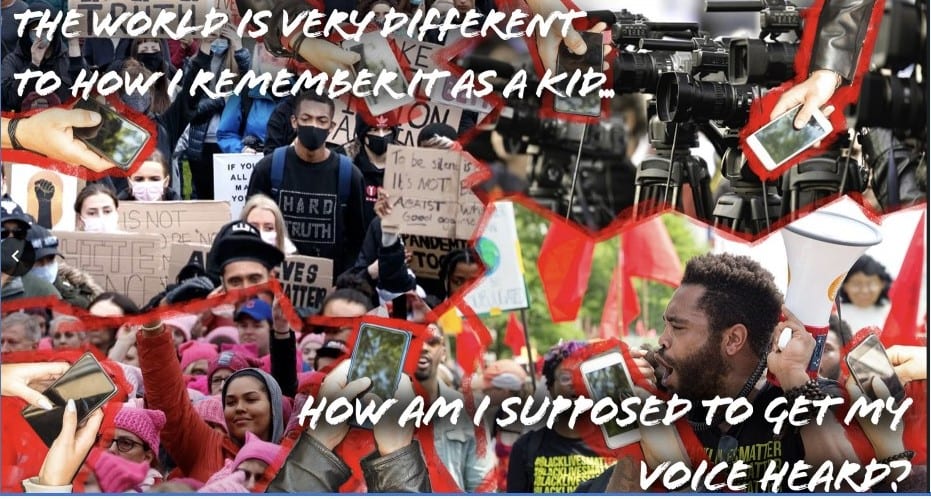
How can you use your unique perspective to tell a story? We want our students to learn that they are truly unique and have stories that only they can tell that other people want to hear or could relate to or learn from. In this activity, students watch two Pixar-in-a-Box videos on Khan Academy to learn about storytelling and perspective. Then, they identify an interesting or poignant memory and design a social media post.
3. Create an image using a line to chart an emotional journey
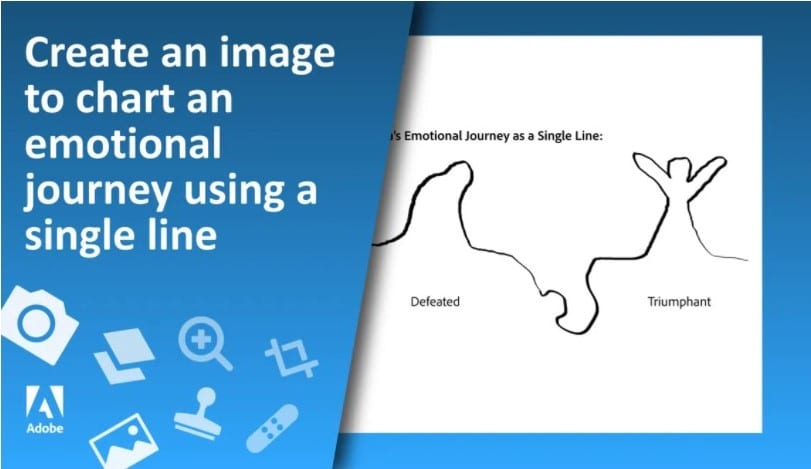
How do you show emotion using a single line? In this activity, students watch a Pixar in a Box video on Khan Academy to learn about how lines communicate character, emotion, and tension. Then they experiment with these aspects as they write their story. We love using this for pre-writing and to help students explore their story arc. Also, for students who love to draw or learn visually, this can help them get started telling their story and show them that there are many different ways to tell a story.
4. Tell the story behind your name
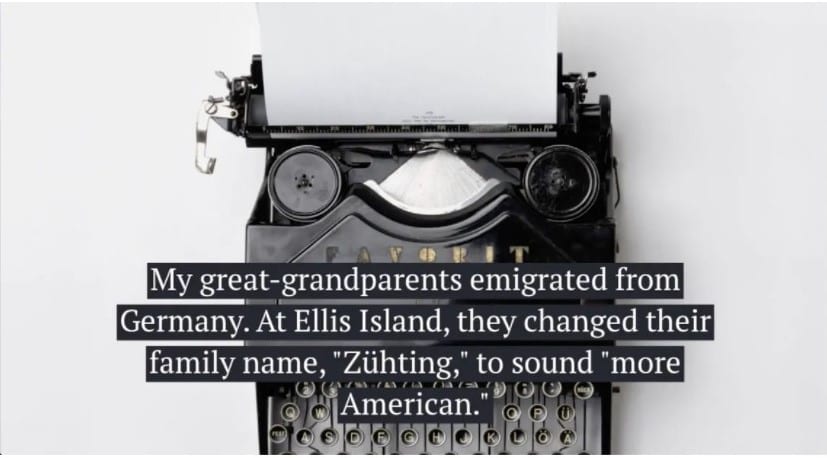
Sharing the story behind our name is a way to tell a story about ourselves, our culture, and our family history. And if there isn’t a story behind it, we can talk about how we feel about it and describe what it sounds like. In this activity, students use video to introduce themselves to their classmates by discussing the origin of their name. This project asks students to connect their names (and identities) to their personal and familial histories and to larger historical forces. If you’re looking for a mentor text that pairs well with this one, try “My Name” by Sandra Cisneros .
5. Develop a visual character sketch
Give students the time to create a character sketch of themselves. This will help them see how they fit into their story. In this lesson, students create a visual character sketch. They’ll treat themselves like a character and learn to see themselves objectively.
6. Create a webpage to outline the story of your movie
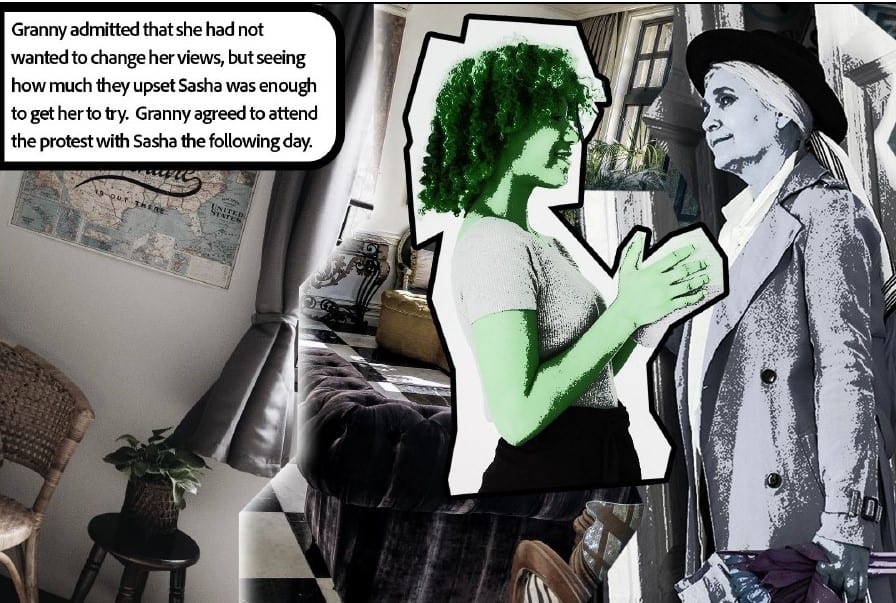
Building a story spine is a great way to show students how to put the parts of their story in an order that makes sense. It’s an exercise in making choices about structure. We like this activity because it gives students a chance to see different examples of structure in storytelling. Then, they consider the question: how can you use structure to set your story up for success? Finally, they design and illustrate an outline for their story.
7. Respond to a variety of writing prompts
Sometimes our students get stuck because they aren’t inspired or need a different entry point into telling their story. Give them a lot of writing prompts that they can choose from. Pass out paper and pencils. Set a timer for fifteen minutes. Then, write 3-4 writing prompts on the board. Encourage students to free-write and not worry about whether their ideas are good or right. Some of our favorite prompts to encourage students to tell their story are:
- I don’t know why I remember…
- What’s your favorite place and why?
- What objects tell the story of your life?
- What might surprise someone to learn about you?
8. Create a self-portrait exploring identity and self-expression

Part of what makes writing your own story so difficult for students is that they are just building their identity. In this activity, students explore how they and others define their identity. What role does identity play in determining how they are perceived and treated by others? What remains hidden and what is shown publicly?
9. Film a video to share an important story from your life

Encourage students to think about how to tell the story of a day they faced their fears. Students consider the question: How can you use different shot types to tell your story? They watch a video from Pixar in a Box on Khan Academy to learn about different camera shots and their use in storytelling. Then, they use Adobe Spark Post or Photoshop and choose three moments from their story to make into shots. We love using this to help students think about pace and perspective. Sometimes what we leave out of our story is just as important as what we include.
10. Try wild writing
Laurie Powers created a process where you read a poem and then select two lines from it. Students start their own writing with one of those lines. Anytime that they get stuck, they repeat their jump-off line again. This is a standalone activity or a daily writing warm-up, and it works with any poem. We love how it lowers the stakes. Can’t think of anything to write? Repeat the jump-off line and start again. Here are some of our favorite jump-off lines:
- The truth is…
- Some people say…
- Here’s what I forgot to tell you…
- Some questions have no answers…
- Here’s what I’m afraid to write about…
You Might Also Like
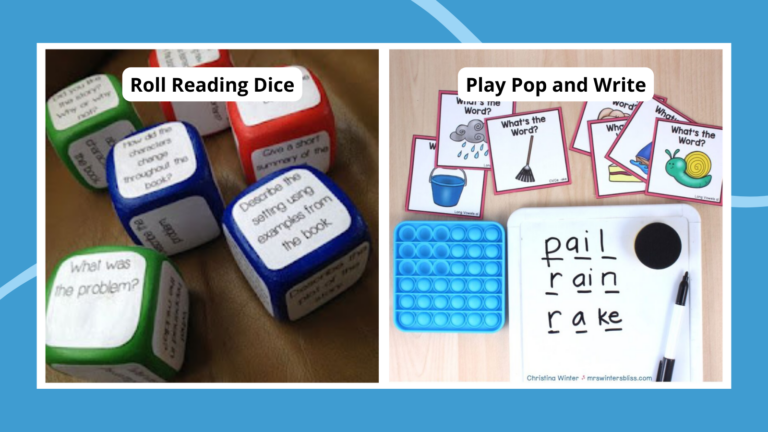
23 Fun and Easy Guided Reading Activity Ideas
Boost reading skills in small groups. Continue Reading
Copyright © 2024. All rights reserved. 5335 Gate Parkway, Jacksonville, FL 32256
- International
- Education Jobs
- Schools directory
- Resources Education Jobs Schools directory News Search

50 Writing Prompts
Subject: English
Age range: 7-11
Resource type: Worksheet/Activity
Last updated
10 September 2024
- Share through email
- Share through twitter
- Share through linkedin
- Share through facebook
- Share through pinterest

This PDF contains 50 writing prompt cards, to encourage creative writing in the class. They are designed for a KS2 Montessori British school, but can be used in any school setting, for children from primary to secondary. Students can be inspired to create their own stories, enabling them to practice many writing objectives in the curriculum. They could also be used for big write sessions or assessments.
Tes paid licence How can I reuse this?
Your rating is required to reflect your happiness.
It's good to leave some feedback.
Something went wrong, please try again later.
This resource hasn't been reviewed yet
To ensure quality for our reviews, only customers who have purchased this resource can review it
Report this resource to let us know if it violates our terms and conditions. Our customer service team will review your report and will be in touch.
Not quite what you were looking for? Search by keyword to find the right resource:
Articles on Creative writing
Displaying 1 - 20 of 46 articles.

UK’s creative industries bring in more revenue than cars, oil and gas – so why is arts education facing cuts?
Adam Behr , Newcastle University

An ode to the social realism of ‘boring’ lyrics – from The Kinks to The Streets
Glenn Fosbraey , University of Winchester

How to write a love song – three tips for beginners from a songwriting expert

‘ Cli-fi ’ might not save the world, but writing it could help with your eco-anxiety
Rachel Hennessy , The University of Melbourne ; Alexander Cothren , Flinders University , and Amy T Matthews , Flinders University

I research the therapeutic qualities of writing about art – here are three steps for trying it yourself
Patrick Wright , The Open University

Creative writing can help improve one’s health: a South African study shows how
Dawn Garisch , University of Cape Town and Steve Reid , University of Cape Town
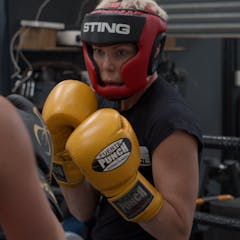
Boxing empowered me to express my trauma – now, I help other abuse survivors do the same, combining it with creative writing
Donna Lyon , The University of Melbourne

How a poet and professor promotes racial understanding with lessons from history
Quraysh Ali Lansana , Oklahoma State University

How to understand your grief through writing
Catherine Cole , Liverpool John Moores University

Write what you know: the COVID experience is a rich resource for year 12 English exams
Janet Dutton , Macquarie University

5 ways to teach the link between grammar and imagination for better creative writing
Brett Healey , Curtin University

Writing can improve mental health – here’s how
Christina Thatcher , Cardiff Metropolitan University

In an AI world we need to teach students how to work with robot writers
Lucinda McKnight , Deakin University

To succeed in an AI world, students must learn the human traits of writing

‘Lit therapy’ in the classroom: writing about trauma can be valuable, if done right
Yannick Thoraval , RMIT University

Too many adjectives, not enough ideas: how NAPLAN forces us to teach bad writing

What my students taught me about reading: old books hold new insights for the digital generation
Kate Flaherty , Australian National University

Life sentences – what creative writing by prisoners tells us about the inside
Dr Michael X. Savvas , Flinders University
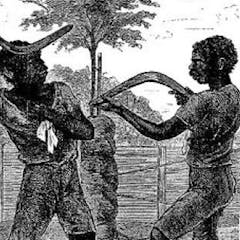
Frozen in time, the casts of Indigenous Australians who performed in ‘human zoos’ are chilling
Katherine Johnson , University of Tasmania

‘I’m in another world’: writing without rules lets kids find their voice, just like professional authors
Related topics.
- Australian literature
- Mental health
Top contributors
Visiting Fellow, Centre for Cultural and Creative Research, University of Canberra, University of Canberra
Associate professor, Deakin University
Adjunct assistant professor, University of New England
PhD Student, School of Education, Curtin University
Lecturer in Creative Writing, University of Southern Queensland
Associate Dean of Humanities and Social Sciences, University of Winchester
Dean of Research (Creative), University of South Australia
Associate Professor in Media, University of Notre Dame Australia
Distinguished Professor of Creative Practice, Faculty of Arts and Design, University of Canberra
Senior Lecturer in Creative Writing, University of Stirling
Lecturer in Professional and Creative Writing, Deakin University
Principal Lecturer in Creative Writing, Coventry University
Professor of Creative Arts, Griffith University
PhD candidate in Digital Cultures, University of Sydney
Conjoint Senior Lecturer, University of Newcastle
- X (Twitter)
- Unfollow topic Follow topic

IMAGES
VIDEO
COMMENTS
Creative writing exercises are short writing activities (normally around 10 minutes) designed to get you writing. The goal of these exercises is to give you the motivation to put words onto a blank paper. These words don't need to be logical or meaningful, neither do they need to be grammatically correct or spelt correctly.
Click to continue. *****. 100 Creative Writing Prompts for Writers. 1. The Variants of Vampires. Think of an alternative vampire that survives on something other than blood. Write a story or scene based on this character. 2. Spinning the Globe.
A selection of fun creative writing exercises that can be completed solo, or with a group. Some are prompts to help inspire you to come up with story ideas, others focus on learning specific writing skills. Intro. I run a Creative Writing Meetup for adults and teens in Montpellier or online every week. We start with a 5 to 20 minute exercise ...
Here's how our contest works: every Friday, we send out a newsletter containing five creative writing prompts. Each week, the story ideas center around a different theme. Authors then have one week — until the following Friday — to submit a short story based on one of our prompts. A winner is picked each week to win $250 and is highlighted ...
Among both exercises to improve writing skills and fun writing exercises for adults, writing metaphor lists is one of the best writing exercises out there. A metaphor list is simple. On a notebook, create two columns. In one column, write down only concrete nouns. Things like a pillow, a tree, a cat, a cloud, and anything that can be perceived ...
For instance, bench pressing while reciting the emperors in a Chinese dynasty. 26. Write a paragraph where a character does a simple action, like turning on a light switch, and make the reader marvel at how strange and odd it truly is. 27. Have a couple fight while playing a board game.
A long list of creative writing prompts and writing ideas. 1. Symphony of the Skies. Imagine a world where music can literally change the weather. Write a story about a character who uses this power to communicate emotions, transforming the skies to reflect their inner turmoil or joy. 2.
The purpose of creative writing exercises is to expand your imagination and to spark new ideas or thoughts, encouraging you to practice writing these before you start on your next project. Themed writing prompts can be helpful here, breaking down your prompts into different buckets like: Food. Animals. Landscapes.
Eight. Pick a fiction book from your shelf. Go to page eight and find the eighth sentence on the page. Start with that sentence and write an eight-line poem that connects in some way to your work-in-progress. For instance, write from the POV of a character, or set the poem in a story setting. Don't worry about poetry forms.
And, yes, writing from a prompt is certainly an example of a creative writing activity (a highly effective one). However, writing prompts are only one way to teach creative writing. Other types of activities include games, collaboration with others, sensory activities, and comic strip creation to name a few. Unlike writing assignments, creative ...
The solution lies in writing prompts—effective tools that ignite your creativity and kickstart your storytelling journey. Here are 300 writing prompts that can steer you toward fresh narratives and unexplored themes. 1 to 50: These prompts focus on the personal. They lead you to introspect and narrate your experiences.
Prompt 3. Imagine you can describe a sculpture by how it feels as you run your hands over it. Prompt 4. Write about the earliest touch you can remember. Prompt 5. Write about something you can't pass by without touching it. For more on the sense of touch, read the blog How To Use The Sense Of Touch In Your Writing.
Below you'll find a massive list of creative writing activities. Some of these activities will keep you writing when you're in need of ideas and inspiration. Others will improve your writing skills and techniques through practice. Some will give you experience with forms and genres you haven't tried. And others will help you promote your ...
Hooray for Wonderful Writing Ideas! Journal prompts are a fantastic way to keep your daily writing feeling fresh and fun. And now, with a new topic to reflect on each day from our list of 30 Excellent Topics for Writing, you'll never suffer from writer's block. And best of all…. You're bound to uncover new ideas and learn things about ...
Creative Writing Prompts. Today I'd like to share a mash-up of creative writing prompts, all of which come from 1200 Creative Writing Prompts. There are no rules. Write a poem. Write a short story. Write an essay. Aim for a hundred words or aim for a hundred thousand. Just start writing, and have fun.
10. Read Your Writing Aloud. It's sometimes fun and instructive to read an extract from your piece aloud for others to listen to and critique. This creative writing activity works well in classrooms and in small groups. The act of reading it aloud will help you listen for sentences to edit and rewrite.
Whether you're taking a break from a work in progress or are in between writing projects and need some inspiration, regular creative writing exercises help you strengthen your writing process. Incorporate these eight exercises into your writing routine. 1. Let your stream of consciousness run. Start with a blank page. Then just start writing.
Creative Writing Ideas For Adults. The following are some ready-made ideas and prompts for creative writing and story starters to help get your creative juices flowing: Love is certainly one of the most popular themes in writing. Use these 25 creative writing prompts about love to create your own unique story.
If you're interested in the world of creative writing, we have eight fantastic exercises and activities to get you started. ️🤩 Don't miss on the joy of Creative Writing: here are 8 ways to get started. Click to tweet! 1. Use writing prompts every week. Coming up with ideas for short stories can be challenging, which is why we created a ...
Here are 10 of our favorite story telling activities that inspire students: 1. Write an "I am from" poem. Students read the poem "I am From" by George Ella Lyon. Then, they draft a poem about their own identity in the same format Lyon used. Finally, students create a video to publish their poems.
Here are 12 fun creative writing activities that will boost your child's creativity, imagination and encourage them to write for fun. 18+ Fun Creative Writing Activities ... then comic strips are a great creative activity to sneak in some minor writing with huge levels of imagination. Pick a topic, any topic you like. ...
This PDF contains 50 writing prompt cards, to encourage creative writing in the class. They are designed for a KS2 Montessori British school, but can be used in any school setting, for children from primary to secondary. Students can be inspired to create their own stories, enabling them to practice many writing objectives in the curriculum.
Brett Healey, Curtin University. What children say about free writing is similar to how professional authors describe the creative process. Teachers should give kids freedom to explore, providing ...
Creative Writing: Our Choices for 'The Second Choice" by Th.Dreiser A few weeks ago we read a short story "Second Choice" by Theodore Dreiser which stirred quite a discussion in class. So, the students were offered to look at the situation from a different perspective and to write secret diaries of some characters (the author presented them as ...
5 Creative Figma Design Activities for Students . Figma is a powerful design tool that's not only great for professional work but also for classroom activities that build both creative and technical skills. Teams across industries use Figma to create user interfaces and user experiences for websites, apps, and digital products.
After a long day of capturing stunning aerial footage, the last thing you want is to spend hours editing. AI-powered photo editing software, like Adobe Lightroom and Luminar AI, offers features such as automated exposure adjustments, sky replacement, and intelligent composition suggestions.These tools enhance the quality of aerial images and videos, with capabilities like auto-enhance photos ...